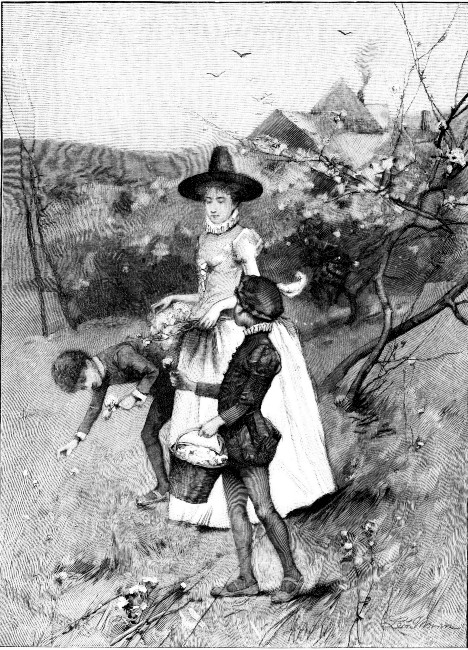 IN SPRING-TIME—WHEN SHAKSPERE WAS A BOY.
IN SPRING-TIME—WHEN SHAKSPERE WAS A BOY.(SEE PAGE 490.)
The Project Gutenberg EBook of St. Nicholas Magazine for Boys and Girls,
Vol. 8, May 1886, No. 7., by Various
This eBook is for the use of anyone anywhere at no cost and with
almost no restrictions whatsoever. You may copy it, give it away or
re-use it under the terms of the Project Gutenberg License included
with this eBook or online at www.gutenberg.org
Title: St. Nicholas Magazine for Boys and Girls, Vol. 8, May 1886, No. 7.
An Illustrated Magazine for Young Folks
Author: Various
Editor: Mary Mapes Dodge
Release Date: May 31, 2010 [EBook #32622]
Language: English
Character set encoding: ISO-8859-1
*** START OF THIS PROJECT GUTENBERG EBOOK ST. NICHOLAS MAGAZINE ***
Produced by Juliet Sutherland, Josephine Paolucci and the
Online Distributed Proofreading Team at http://www.pgdp.net
THE CENTURY CO. NEW YORK.
F. WARNE & CO., LONDON.
Copyright, 1886, by The Century Co.
The de Vinne Press.
| PAGE. | ||
| About Breathing | Hellen Clark Swazey | 946 |
| Adventure at the Flume, Our. (Illustrated). | W. L | 844 |
| Ambitious Kangaroo, The. Jingle | A. R. Wells | 853 |
| Amusing the Baby. Verses. (Illustrated by R. B. Birch) | Eva Lovett Carson | 706 |
| Army, An. Verses | A. C | 757 |
| Art and Artists, Stories of. English Painters. (Illustrated) | Clara Erskine Clement | 803 |
| Aunt Deborah's Lesson. (Illustrated) | G. H. Baskette | 694 |
| Autumn to Spring. Poem | Edith M. Thomas | 883 |
| Baby's Dimple, The. Poem | William H. Hayne | 731 |
| Ballad of Base-ball, A. Verses | I. D | 774 |
| Belated Fairy, A. Picture, drawn by Mary A. Lathbury | 693 | |
| Blossom-time. Poem | Laura E. Richards | 518 |
| Boat-building. (Illustrated) | George J. Manson | 698 |
| Bopeep. Poem. (Illustrated by Mary Hallock Foote) | Sydney Dayre | 756 |
| Boys' Camp, A. (Illustrated by W. A. Rogers) | 607 | |
| Boys' Paradise, The. (Illustrated by W. A. Rogers) | Elizabeth Balch | 604 |
| Brownies at Base-ball, The. Verses. (Illustrated by the Author) | Palmer Cox | 943 |
| Brownies at Lawn Tennis, The. Verses. (Illustrated by the Author) | Palmer Cox | 857 |
| Brownies in the Menagerie, The. (Illustrated by the Author) | Palmer Cox | 707 |
| Brownies on Roller Skates, The. Verses. (Illustrated by the Author) | Palmer Cox | 543 |
| Bubble Bowling. (Illustrated by the Author) | Adelia B. Beard | 540 |
| Butterfly and the Bee, The. Verse | Edith M. Thomas | 599 |
| Captain Jack's Fourth of July Kite. (Illustrated by the Author) | Daniel C. Beard | 702 |
| Caricature Plant, The. (Illustrated by J. C. Beard) | .M. A | 522 |
| Children of the Sun, The. Poem. (Illustrated) | Arthur Wentworth Eaton | 770 |
| Children's Exhibition, The. (Illustrated by E. J. Meeker) | Charles Barnard | 916 |
| Child's Fancy, A. Poem | Frank Dempster Sherman | 645 |
| Considerate Farmer Jones. Picture, drawn by Culmer Barnes | 843 | |
| Crafty Crab, The. Jingle. (Illustrated and engrossed by R. B. Birch) | Isabel Frances Bellows | 845 |
| Crew of the Captain's Gig, The. (Illustrated by G. W. Edwards) | Rev. Charles R. Talbot | 899 |
| Daisy-Song. Verses | Grace Denio Litchfield | 662 |
| Dangerous Dog, The. Jingle. (Illustrated and engrossed by R. B. Birch) | A. R. Wells | 837 |
| Difference of Opinion, A. Verses | Lilian Dynevor Rice | 679 |
| Dog Stories, St. Nicholas. (Illustrated) | 526, 624 | |
| "Do You Like Butter, Bossy?" Picture, drawn by Culmer Barnes | 791 | |
| Duel With a Stork, A. Pictures, drawn by Frederick J. Hibbert | 754 | |
| Fishes and Their Young. (Illustrated by J. C. Beard) | C. F. Holder | 600[Pg vi] |
| Fly-fishing for Trout. (Illustrated by J. H. Cocks, Henry Sandham, and others) | Ripley Hitchcock | 655 |
| Fresh from a Dip in the Breakers. Picture, drawn by Mary Hallock Foote | 670 | |
| Frog in the Shoe, The. Jingle. (Illustrated by Boz) | Aunt Fanny Barrow | 791 |
| Fun in High Life. Picture, drawn by Culmer Barnes | 935 | |
| George Washington. (Illustrated by H. A. Ogden and others) | Horace E. Scudder | 505, 590, 663, 758, 838, 908 |
| Giraffe, The. (Illustrated) | Gerrish Eldridge | 768 |
| Girls' Tricycle Club and its Run Down the Cape, The. (Illustrated by W. A. Rogers) | E. Vinton Blake | 494 |
| Grandpapa Rosebush. Verses. (Illustrated) | Laura E. Richards | 583 |
| Great Spring-board Act, The. Picture, drawn by T. J. Nicholl | 677 | |
| Handiwork of Some Clever School-boys, The. (Illustrated by the Author) | J. Abdon Donnegan | 547 |
| Her Picture. Verses. (Illustrated by Laura C. Hills) | Anna M. Pratt | 942 |
| Highly Colored. Picture, drawn by Culmer Barnes | 869 | |
| How Conrad Lost his School-books. (Illustrated by the Author) | Walter Bobbett | 514 |
| "How Doth the Little Busy Bee?" Picture, drawn by Culmer Barnes | 757 | |
| Hurly-burly. Jingle. (Illustrated by L. Hopkins) | Emma Mortimer White | 871 |
| If. Jingle. (Illustrated) | E. A. B. | 703 |
| In the Garden. Verses. | Bessie Chandler | 898 |
| Inverted. Jingle. (Illustrated by W. T. Peters) | John B. Tabb | 828 |
| "It was a Fair Artist Named May." Jingle. (Illustrated by the Author) | O. Herford | 501 |
| Japanese Babies. Verses. (Illustrated and engrossed by R. B. Birch) | Anna C. Vincent | 948 |
| Jingles. | 501, 613, 630, 681, 687, 697, 703, 733, 748, 785, 791, 797, 828, 837, 845, 853, 949 | |
| Jolly Old Knight, The. Jingle. (Illustrated by the Author) | Oliver Herford | 748 |
| Keeping the Cream of One's Reading. (Illustrated) | Margaret Meredith | 537 |
| Kelp-gatherers, The. (Illustrated by W. A. Rogers) | J. T. Trowbridge | 584, 687, 776, 847,929 |
| Knickerbocker Boy, The. Verses. (Illustrated by Jessie McDermott) | Caroline S. King | 542 |
| Lace-leaf, a Search for The. (Illustrated by J. C. Beard) | Alice May | 518 |
| La Fayette. (Illustrated by F. H. Lungren) | Mrs. Eugenia M. Hodge | 643 |
| Lake George Capsize, A. (Illustrated) | Edward Eggleston | 829 |
| Last Cruise of the "Slug," The. (Illustrated by D. Clinton Peters) | Thomas Edwin Turner | 671 |
| Lesson in Geography, A. Verses. (Illustrated by Jessie McDermott) | M. B. Jordan | 870 |
| Little Boys Who Looked Alike, The. Verses. (Illustrated by R. B. Birch) | Malcolm Douglas | 928 |
| Little Lord Fauntleroy. (Illustrated by R. B. Birch) | Frances Hodgson Burnett | 502, 564, 646, 734, 822, 884 |
| Little Miss Mabel. Jingle. (Illustrated by the Author) | Daisy Jones | 613 |
| Little Seamstress, A. Verse. | Mary E. Wilkins | 733 |
| Man Overboard! (Illustrated by the Author) | H. A. Johnson | 775 |
| Matter-of-fact Cinderella, A. (Illustrated) | Annie A. Preston | 860 |
| May Song. Poem. (Illustrated and engrossed by Laura C. Hills) | Laura E. Richards | 492 |
| Monster, The. Verses. (Illustrated) | Maria I. Hammond | 732 |
| Morning-glories. Poem. | Laura Ledyard Pope | 501 |
| Morra. (Illustrated) | Susan Anna Brown | 846 |
| Mother's Idea. | A. M. Platt | 613 |
| Nan's Revolt. (Illustrated by Jessie Curtis Shepherd) | Rose Lattimore Alling | 682, 749, 816, 896 |
| Ned's Buttercup. Verses. | Bessie Chandler | 941 |
| New Theory, A. Verse. | Bessie Chandler | 785 |
| New View of the Moon, A. Verses. | Eva Lovett Carson | 551 |
| No More School. Picture, drawn by Rose Mueller | 571 | |
| Notional Nightingale, The. Jingle. (Illustrated by L. Hopkins) | A. R. Wells | 748 |
| Number One. Verses. | Charles R. Talbot | 705 |
| October. Poem. (Illustrated) | Susan Hartley | 890 |
| "Oh, Where are You Going?" Jingle. (Illustrated by E. Sylvester) | 869[Pg vii] | |
| Old Time Arms and Armor. (Illustrated) | E. S. Brooks | 936 |
| Once-on-a-time. Poem. | Emily Huntington Miller | 563 |
| On the Willey-brook Trestle. (Illustrated by Henry Sandham) | Willis Boyd Allen | 764 |
| Owl, the Bat, and the Bumble-bee, The. Verses. (Illustrated by De Cost Smith) | Laura E Richards | 747 |
| Personally Conducted. (Illustrated by E. J. Meeker and others) | Frank R. Stockton | |
| Queen Paris. | 572 | |
| Pictures. | 525, 571, 637, 670, 677, 693, 701, 715, 738, 754, 757, 791, 798, 843, 856, 869, 935, 947 | |
| Pussies' Coats, The. Jingle. (Illustrated by H. P. Share) | Esther B. Tiffany | 687 |
| Puzzled Bessie. Picture, drawn by Albert E. Sterner | 947 | |
| Puzzled Papa, A. Verses. | M. L. B. Branch | 603 |
| Quaint Little Man, A. Verses. (Illustrated by the Author) | A. Brennan | 949 |
| Ready for Business; or, Choosing an Occupation. (Illustrated) | George J. Manson | |
| Boat-building. | 698 | |
| Recipe, A. Verses. (Illustrated by the Author) | Mary A. Lathbury | 629 |
| Regatta. A. Game. (Illustrated by the Author) | Frank Bellew | 783 |
| Robin's Return. Poem. | Edith M. Thomas | 612 |
| Rock-a-bye. Poem. | Mary N. Prescott | 535 |
| Rocky Mountain Hermit, A. (Illustrated by J. C. Beard and others) | Alfred Terry Bacon | 723, 832 |
| Rope Yarn Spun by an Old Sailor, A. (Illustrated by the Author) | C. W. Miller | 786 |
| Royal Fish, A. (Illustrated by W. L. Sheppard, Henry Sandham, and others) | Ripley Hitchcock | 739 |
| Sad Case, A. Verses. (Illustrated by Mary Richardson) | Margaret Vandegrift | 733 |
| Sailor Boy, The. Verses. (Illustrated) | Wallace E. Mather | 790 |
| Salmon: A Royal Fish. (Illustrated by W. L. Sheppard, Henry Sandham, and others) | Ripley Hitchcock | 739 |
| Satchel, The. (Illustrated by J. E. Kelly) | Tudor Jenks | 616 |
| Search for the Lace-leaf, A. (Illustrated by J. C. Beard) | Alice May | 518 |
| Sea-urchin, The. Jingle. (Illustrated and engrossed by R. B. Birch) | Isabel Frances Bellows | 785 |
| Shakspere when a Boy. (Illustrated by Alfred Parsons) | Rose Kingsley | 483 |
| Smallest Circus in the World, The. (Illustrated by J. G. Francis) | C. F. Holder | 533 |
| Some Curious Mariners. (Illustrated by J. C. Beard and J. M. Nugent) | C. F. Holder | 891 |
| Song of Summer, A. Poem. | Emma C. Dowd | 671 |
| Spring Beauties. Poem. (Illustrated by A. Brennan) | Helen Gray Cone | 513 |
| St. Nicholas Dog Stories. (Illustrated) | ||
| A Clever Little Yellow Dog | John R. Coryell | 526 |
| A Dog that Could Count | E. P. Roe | 529 |
| A Clever Sheep Dog | 530 | |
| A Story of Two Buckets | Charlotte M. Vaile | 530 |
| The Left-field of the Lincoln Nine | C. F. Holder | 624 |
| A Dog that Could Climb Trees | C. F. Holder | 626 |
| A Sociable, Sensible Dog | E. P. Roe | 626 |
| A Dog whose Feelings were Hurt | E. P. Roe | 628 |
| A Dog that Repaid a Trick | 628 | |
| Mephistopheles | Anna Gardner | 628 |
| Stories of Art and Artists. | ||
| English Painters. (Illustrated) | Clara Erskine Clement | 803 |
| Tea-party, A. Verses. (Illustrated and engrossed by the Author) | Margaret Johnson | 865 |
| Tell-tale Barn, The. Verses. (Illustrated by the Author) | Esther B. Tiffany | 924 |
| "The Biggest of Birds." Jingle. (Illustrated G. R. Halm) | E. E. Sterns | 703 |
| Theoretic Turtle, The. Verses. (Illustrated) | A. R. Wells | 681 |
| "This Little Pig Went To Market." Picture, drawn by Rose Mueller | 701 | |
| "This Seat Reserved." Picture. | 856 | |
| Three Velvety Bees. Verses. (Illustrated by F. E. Gifford) | M. M. D. | 654 |
| Timothy Timid. Jingle. (Illustrated by the Author) | A. Brennan | 697 |
| Tippie and Jimmie. (Illustrated by H. P. Share) | Mary L. French | 705 |
| Toddlekins and Trot. Verses. (Illustrated by Laura C. Hills) | Anna M. Pratt | 843 |
| Trout, Fly-fishing for. (Illustrated by J. H. Cocks, Henry Sandham, E. J. Meeker, and others) | Ripley Hitchcock | 655[Pg viii] |
| Under the Snow. Poem. | Lilian Dynevor Rice | 815 |
| Vegetable Clothing. (Illustrated by D. C. Beard) | C. J. Russell | 523 |
| Venetian Marquetry. (Illustrated by the Author) | Charles G. Leland | 866 |
| Waiting for a Cold Wave. Picture, drawn by C. Weaver | 738 | |
| Weasel and the Adder, The. (Illustrated) | Gerrish Eldridge | 907 |
| What Bertie Saw in the Flowers. Poem. (Illustrated) | L. G. R. | 536 |
| What it Was. Verses. (Illustrated by F. E. Gifford) | Malcolm Douglas | 701 |
| When Shakspere was a Boy. (Illustrated by Alfred Parsons) | Rose Kingsley | 483 |
| Wild Flowers, The. Verses. (Illustrated) | Jessie Penniman | 603 |
| Wild Hunters. (Illustrated) | John R. Coryell | 681 |
| Winged Seeds. Poem. | Helen Gray Cone | 571 |
| Woe to the Foreign Dolly! Picture, drawn by R. Blum | 525 | |
| Wonders of the Alphabet. (Illustrated) | Henry Eckford | 538, 621, 677, 771, 854, 925 |
| Work and Play for Young Folk. (Illustrated.) | ||
| A Rope Yarn Spun by an Old Sailor. (Illustrated by the Author) | C. W. Miller | 786 |
| Venetian Marquetry. (Illustrated by the Author) | Charles G. Leland | 866 |
| For Very Little Folk. (Illustrated.) | ||
| Riddles. | M. M. D. | 630 |
| "Pretty Painted Bridges" } | E. E. Sterns | 630 |
| "White Sheep, White Sheep" } | ||
| "On Dormio Hill" } | ||
| A Letter from a Little Boy | Ralph Ranlet | 710 |
| "Dude" and the Cats | 711 | |
| Riddles for Very Little Folk | E. E. Sterns | 950 |
| Easter Carol | William E. Ashmall | 546 |
Introduction—"Everything is Lovely, and the Goose Hangs High"—Girls! To the Rescue!—About Little Lord Fauntleroy—Fishing for Necklaces—A Suggestion to the Bottled Fish—The Newspaper Plant (illustrated)—One More Living Barometer, 552; A Bumble Grumble—Pretty Dusty Wings—Trees that Rain—Shooting Stars—Coasting in August—More about Turtles—A Fish that Weaves its Nest—A Clever Humming-bird (illustrated), 632; Introduction—The Seventeen-year Locust (illustrated)—The Great Lubber Locust (illustrated)—The Dog and the Queer Grasshoppers (illustrated), 712; Introduction—Longfellow's First Letter—The Water-snake as a Fisherman—More Animal Weather-Prophets—A Useful Bird with an Aristocratic Name—A Wise Humming-bird—The Pitcher Plant (illustrated), 792; Introduction—Poor Lark!—Those Mocking-birds Again—A Living Island (illustrated)—Wrong Names for Things—Who can Answer This? 872; Introduction—A Perfectly Quiet Day—How He Proved It—Walking Without Legs—A Queer Sunshade (illustrated)—A Queer Jumble—That Dear Little Lord, 952.
| The Agassiz Association. (Illustrated) | 557, 636, 717, 794, 874, 957 |
| The Letter-box. (Illustrated) | 554, 634, 714, 796, 876, 954 |
| The Riddle-box. (Illustrated) | 559, 639, 719, 799, 879, 959 |
| Editorial Notes | 554, 634 |
"In Spring-time—When Shakspere was a Boy," by Léon Moran, facing Title-page of Volume—"A June Morning," by E. C. Held, facing page 563—"La Fayette and the British Ambassador," by F. H. Lungren, facing page 643—"The Captain and the Captain's Mate," by Mary Hallock Foote, facing page 723—"The Connoisseurs," after a painting by Sir Edwin Landseer, facing page 803—"Martha Washington," from an unfinished portrait by Gilbert Stuart, facing page 883.
 IN SPRING-TIME—WHEN SHAKSPERE WAS A BOY.
IN SPRING-TIME—WHEN SHAKSPERE WAS A BOY.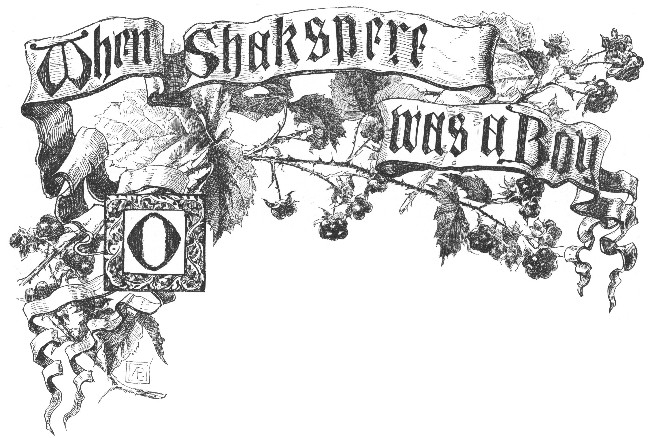
On Henley street, in quiet Stratford town, there stands an old half-timbered house. The panels between the dark beams are of soft-colored yellow plaster. The windows are filled with little diamond panes; and in one of the upper rooms they are guarded with fine wire outside the old glass, which is misty with innumerable names scratched all over it. Poets and princes, wise men and foolish, have scrawled their names after a silly fashion, on windows, wall, and ceiling of that oak-floored room, because, on the 22d of April, 1564, a baby was born there—the son of John and Mary Shakspere. And on the following Wednesday, April 26, the baby was carried down to the old church beside the sleepy Avon and baptized by the name of William.
Little did John Shakspere and the gossips dream, when the baby William's name was duly inscribed in the register-book with its corners and clasps of embossed brass, that he was destined to become England's greatest poet. Little did they dream, honest folk, that the old market town and the house on Henley street and the meadows across the river, covered in that pleasant April month with cowslips and daisies and "lady-smocks all silver-white," would become sacred ground to hundreds of thousands of people from all quarters of the globe, who should come, year by year, on reverent pilgrimage to Shakspere's birthplace.
The baby grew up as most babies do; and when he was two and a half years old, a little brother Gilbert was born. As we walk through the streets to-day, we can fancy the little lads toddling about the town together, while father John was minding his glove and wool trade at the old house. John Shakspere, in those early days, was a well-to-do man. He was a chamberlain of the borough when little Gilbert was born; and in 1568 he was[Pg 484] elected High Bailiff, or Mayor, of Stratford, although he, in common with many of his fellow-burgesses, could not write his own name. He had land, too, at Snitterfield, where his father had lived; and his wife, Mary Arden, was the owner of Ashbies, the farm at Wilmcote, hard by.
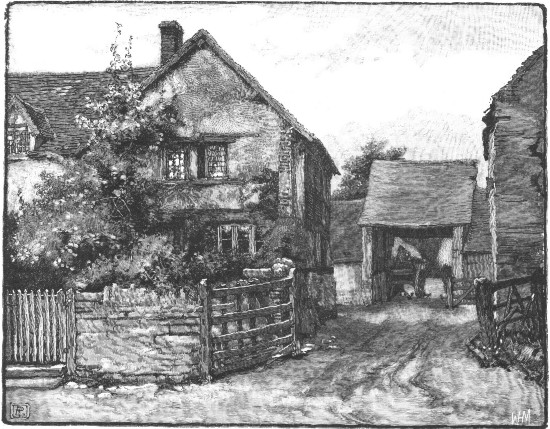 MARY ARDEN'S HOUSE AT WILMCOTE.
MARY ARDEN'S HOUSE AT WILMCOTE.
But, though the parents were illiterate, they knew the value of a good education. The Free Grammar School had been refounded a few years before by Edward VI. And although there is no actual record of his school days, we may take it as certain that little Will Shakspere was sent to the Free School when about seven years old, as we know his brother Gilbert was, a little later. The old Grammar School still stands; and boys still learn their lessons in the self-same room with the high pitched roof and oaken beams, where little Will Shakspere studied his "A, B, C-book," and got his earliest notions of Latin. But during part of Shakspere's school days the schoolroom was under repair; and boys and master—Walter Roche by name—migrated for a while to the Guild Chapel next door. And this was surely in the poet's mind when, in later years, he talked of a "pedant who keeps a school i' the church."
All boys learned their Latin then from two well-known books—the "Accidence" and the "Sententiæ Pueriles." And that William was no exception to the rule we may see by translations from the latter in several of his plays, and by an account, in one of his plays, of Master Page's examination in the "Accidence." An old desk which came from the Grammar School and stood there in Shakspere's time is shown at the birthplace. And when we look at it we wonder what sort of a boy little William was—whether his future greatness made a mark in any way during his school days; whether that conical forehead of his stood him in good stead as he learned his Latin Grammar; whether he was quiet and studious, or merry and mischievous; whether he hid dormice and apples and birds' eggs in his desk, and peeped at them during school hours; whether he got into scrapes and was whipped. Just think of[Pg 485] Shakspere getting a whipping! No doubt he often did. Masters in those days were not greater, but rather less, respecters of persons than they are now, and they believed very firmly in the adage which is going out of fashion, that to spare the rod is to spoil the child. So we may think of little Will Shakspere coming out of the Grammar School and passing the old Guild Chapel and the Falcon Inn with two little red fists crammed into two little red and streaming eyes, and going home to mother Mary in Henley street to be comforted and coddled and popped down on the settle in the wide chimney corner, with some dainty, dear to the heart of small boys who got into trouble three hundred years ago just as they do now. Let us hope his cake was not like one he describes as "dough on both sides."
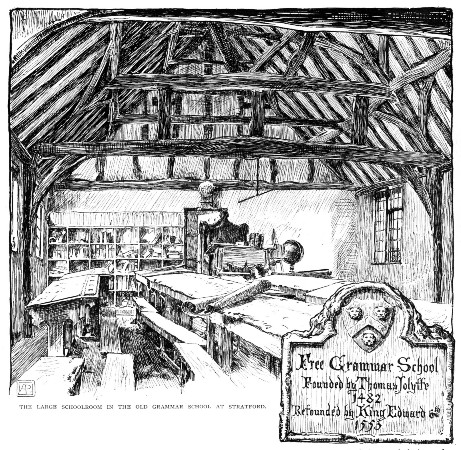 THE LARGE SCHOOLROOM IN THE OLD GRAMMAR SCHOOL AT
STRATFORD.
THE LARGE SCHOOLROOM IN THE OLD GRAMMAR SCHOOL AT
STRATFORD.
But I fancy that lessons bore a very small part in Will Shakspere's education. He certainly never knew much Latin; but he knew all about country things as only a country-bred boy can know about them. He and Gilbert must have run many a time to Ashbies, their mother's farm at Wilmcote, and watched the oxen plowing in the heavy clay fields; and cried, perhaps, as children do now "as the butcher takes away the calf"; and played with the shepherd's "bob-tailed cur"; and gossiped with Christopher Sly, who could tell them all manner of wonderful tales, for had he not been peddler, card-maker, bear-herd, "and now by present profession a tinker"?
They must have listened to their father and their uncle Henry up at the big farm close to Snitterfield church (where Henry Shakspere lived) as the two men discussed the price of a yoke of oxen at Stratford or Warwick fair, or debated whether they should "sow the head-land with wheat,—with[Pg 486] red wheat, Davy,"[A] or grumbled over the "smith's note for shoeing and plough-irons," or told the latest turn in the quarrel between "William Visor of Woncot" and "Clement Perkes of the Hill." Very likely the little hazel-eyed boys took William Visor's part, though they wisely kept their opinions to themselves, since small boys in that period were not allowed the liberty of speech they enjoy in these degenerate times. William Visor was a neighbor of the Ardens, and possibly a friend of "Marian Hackett, the fat ale-wife of Wincot"; for Wincot, Woncot, and Wilmcote are all the same place. Or perhaps the young lads sided with Clement Perkes; for the Hill where he lived at Weston was known as Cherry Orchard Farm, a name full of tempting suggestions to little boys. And we know that Shakspere, like many less wise people, was fond of "ripe red cherries." He mentions them again and again. He and Gilbert, and their little friends the Sadlers and Harts and Halls, must have played bob-cherry, as we do now,—drawing up the stem of the cherry with our tongues, and, with a sudden snap, getting the round, ripe fruit between our lips,—and then have used the stones for "cherry-pit"—a child's game that is frequently mentioned by Shakspere and other old writers, which consisted in pitching cherry-stones into a small hole.
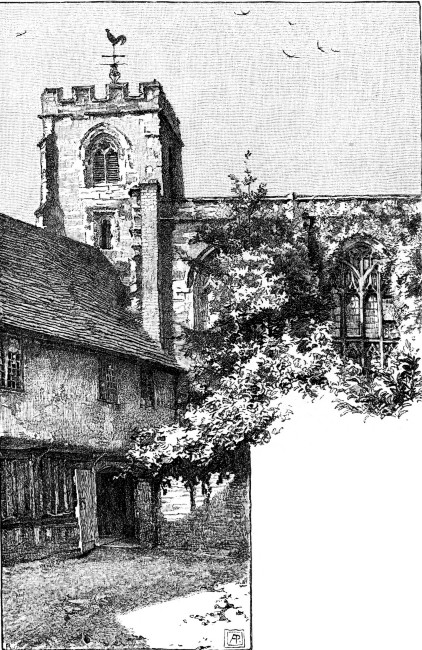 THE SCHOOL AND GUILD CHAPEL.
THE SCHOOL AND GUILD CHAPEL.
Stratford lies just at the beginning of the fruit-growing country, which stretches right down the Vale of Evesham to Worcester and the Severn; and little Will Shakspere was well versed in the merits of all kinds of fruits. There were the plum-trees, that make you think in the spring-time that a snow-shower has fallen upon a sunny day all over the Stratford district; while in the autumn the branches are laden with "the mellow plum." Who can doubt that little Will climbed the damson-tree, "with danger of my life," as he said later that Simpcox did at his wife's bidding?[B] In the plays he mentions apples of many sorts—some of which, though rare or extinct in other parts of England, still grow about his native place—the bitter-sweetings and leather-coats, the apple-johns and the pomewaters. Many a time he must have stood with all the boys of the place watching, as we might do to-day, the cider-making on some village green, when the heaps of apples, red, green, and yellow, are brought in barrows and baskets and carts from the orchards, and ground up into a thick yellow pulp in the crushing-mill turned by a horse, and that pulp is put into presses from which the clear juice runs into tubs, while the dry cakes of pulp are carted away to fatten the pigs.
There were grapes, too, growing plentifully in Warwickshire in his day; and "apricocks," "ripe figs, and mulberries," like those with which the fairies were told to feed Bottom the weaver. Blackberries and the handsome purple dewberries grew[Pg 487] then as now, by the hedges in the orchards and in the shade of the Weir-brake just below Stratford mill, where, so says tradition, the scene of the "Midsummer Night's Dream" was laid. In the Weir-brake, too, and in all the woods about their home, the Shakspere boys must have gone nutting—that most delightful harvest of the year, when you bend down "the hazel twig," so "straight and slender," and fill baskets and pockets with the sweet nuts in their rough, green husks, and crack them all the way home like so many happy squirrels.
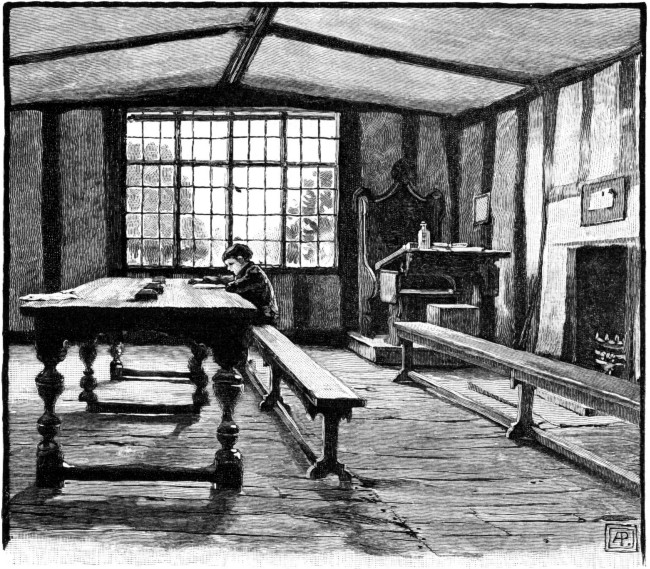 THE GUILD COUNCIL-ROOM—NOW THE HEAD-MASTER'S
CLASS-ROOM.
THE GUILD COUNCIL-ROOM—NOW THE HEAD-MASTER'S
CLASS-ROOM.
All the hedge-rows were full then, as they are to this day, of wild pear-trees, wild apples, and "crabs," as crab-apples are called in England. Roasted "crabs" served with hot ale were a favorite Christmas dish in Shakspere's time. And I doubt not that the boys rejoiced at the house in Henley street as the time of year came round "when roasted crabs hiss in the bowl."
How snug the "house-place" in the old home must have looked with its roaring fire of logs, on winter evenings, when the two little boys of nine and seven, and Joan and Anne, the little sisters, huddled up in the chimney-corner with baby Richard in his cradle, while the mother prepared hot ale and "roasted crabs" for her gossips. Will, I warrant, as with twinkling eyes he watched Mrs. Hart or Mrs. Sadler or Mrs. Hathaway, from Shottery, thought that it was Puck himself, the very spirit of mischief, who had got into the bowl "in very likeness of a roasted crab."
It must have been a recollection of those winter evenings that made little Will, in later years, write his delightful "Winter Song":
Among the gossips there would be much talk of wonders, appearances, mysterious occurrences,[Pg 488] and charms; and the children listened with all their ears, you may be sure. Perhaps one of Mistress Shakspere's friends possessed the power that some people in Warwickshire still are said to possess, of charming away warts by a touch and some murmured invocation; or curing toothache and all other aches and pains. There are plenty of people now who, after your second cup of tea is finished, will take the cup, twist the grounds around three times, turn it mouth downward in the saucer, and then, by looking at the tea-leaves which still stick to the bottom of the cup, will undertake to tell you what is going to happen—of presents you will receive, or people who are coming to see you. And many Warwickshire women still believe firmly that whooping-cough can be charmed away by the patient walking nine times over running water.
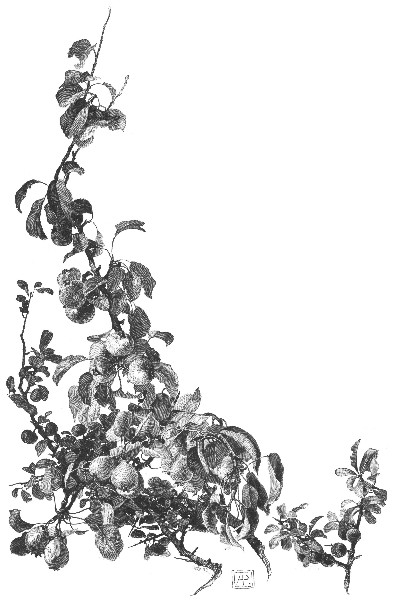 "THE HEDGE-ROWS WERE FULL, AS THEY ARE TO THIS DAY, OF
WILD APPLES, WILD PEARS, AND 'CRABS.'"
"THE HEDGE-ROWS WERE FULL, AS THEY ARE TO THIS DAY, OF
WILD APPLES, WILD PEARS, AND 'CRABS.'"
The boys' games of those days were much the same as they are to-day. Each game then, as now, had its regular season in the year. In the season for marbles, no one would dream of playing anything else. "Knuckle-hole" is still the favorite game in Warwickshire. The standing-up game, pitching the taw from a mark scraped across the ground, is, I am told by competent authorities, rather going out of fashion; but it is still played. The marble season lasts through the late winter, much to the distraction of mothers, who have to clean and mend their sons' nether garments, which are worn with kneeling and plastered with mud at that time of year. Then comes the spinning-top, whip-top, and peg-top time. Later again there is tip-cat for the boys, and hop-scotch for the girls.
On the corn-bins in the Warwickshire ale-house stables we can still find the lines rudely cut for "nine men's morris." This, in Shakspere's day, was a favorite game, and one much in vogue among the shepherd boys in the summer, who cut a "board" in the short turf and whiled away the long hours by playing it. Little Will must often have gone to watch his father play "shovel-board" at the Falcon tavern, in Stratford, on the board upon which tradition says he himself played, in later life. And at home, he and his brother must have played "push-pin," an old game which is still played in remote parts of the country. Two pins are laid on the table; the players in turn jerk them with their fingers, and he who throws one pin across the other is allowed to take one of them, while those who do not succeed have to give a pin. This is the game Shakspere alludes to in "Love's Labour's Lost," when he says, "And Nestor play at push-pin with the boys."
Little Will knew a great deal about sport. All his allusions to sporting or woodcraft are those of a man who had been familiar with such things from his childhood. He and Gilbert must have set plenty of "springes, to catch wood-cocks," and dug out the "earth-delving conies" that swarmed in the commmonland of Welcombe, those dingles that in later years he fought so hard to preserve from inclosure.[Pg 489]
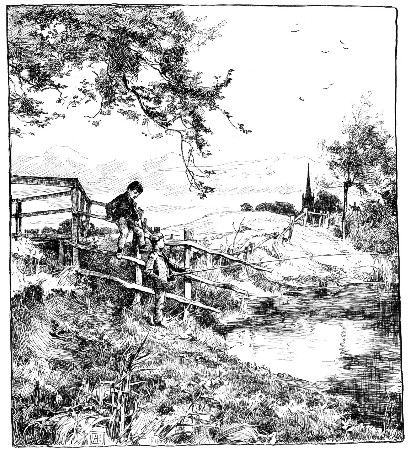 BOYS FISHING IN THE AVON—OPPOSITE THE WEIR-BRAKE.
BOYS FISHING IN THE AVON—OPPOSITE THE WEIR-BRAKE.
They must have fished many a time, as the Stratford boys do to this day, in the slow waters of the Avon, sitting quietly intent for hours upon the steep clay bank
Then who can doubt that he often watched the hunting of the hare? Each line in his wonderful description of the hunted hare is written by a thorough sportsman and a keen observer of nature. How the purblind hare runs among a flock of sheep or into a rabbit-warren, or "sorteth with a herd of deer" to throw out "the hot scent-snuffing hounds." How they pause silent till they have worked "with much ado the cold fault cleanly out," and then burst into music again.
Of deer, Shakspere knew much—too much for his own comfort. In his childhood, there were herds at Fulbrooke,—and when he was older, at Charlecote, at Grove Park, and at Warwick. And probably there were a few roe in the wilder parts of the Forest of Arden, which came down within three miles of Stratford, and covered the whole of[Pg 490] the country north of the Avon, out to Nuneaton and Birmingham. We can fancy how the boys stole out to watch the Grevilles and Leycesters and Lucys and Verneys on some great hunting party, and whispered to each other,
But the time of all others in the year that we connect most closely with Shakspere is the sweet spring-time, when the long cold winter—very long and very cold among those undrained clay-lands of Warwickshire—had come to an end. How closely little Will watched for
and for
We can fancy the little boys hunting in some sheltered nook in the Welcombe woods for the first primroses; and climbing up Borden Hill just beyond Shottery, perhaps with Anne Hathaway from the pretty old house in the orchards below, to the bank—the only one in the neighborhood,—
or wandering over the flat sunny meadows along the Avon valley, picking cowslips, and looking into each tiny yellow bell for the spots in their gold coats,—
as they brought home baskets of the flower-heads for their mother to make into cowslip wine.
Spring, in this Stratford country, is exquisite. The woods are carpeted with primroses and wild hyacinths; while in the "merry month of May" the nightingale swarms among the hawthorn trees white with blossom.
On every village green there stood a painted May pole—one is still standing at Weston, near Stratford; and May-Day is still kept in Warwickshire with a "May feast" upon old May-Day, the 12th of May. Every one knows how the prettiest girl in the village was chosen Queen o' the May, and how all joined in the "Whitsun Morris-dance."
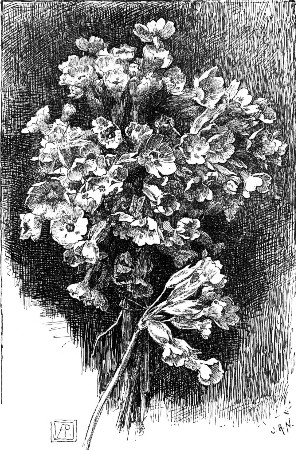 A BUNCH OF COWSLIPS.
A BUNCH OF COWSLIPS.
Long Marston,—"Dancing Marston," as it has been called ever since Shakspere's time,—a few miles from Stratford, was famous till within the memory of man for a troop of Morris-dancers, who went about from village to village, strangely dressed, to dance at all the feasts. Shakspere probably had the Marston dancers in his mind when he wrote of the "three carters, three shepherds, three neat-herds, three swine-herds," that made themselves all "men of hair," and called themselves "Saltiers," at the sheep-shearing feast which pretty Perdita presided over, in "The Winter's Tale." The sheep-shearing feast, which came when roses were out on the hedges and in the gardens, must have been a merry and important time for the Shakspere boys. John Shakspere was, of course, specially interested in the price of a[Pg 491] tod of wool, for wool-stapling was part of his trade. Perhaps William himself was sent by his mother to buy the groceries for the feast, and stood conning the list as he makes the clown do, in "The Winter's Tale."
In the spring-time, too, came the peddler with all his wonders and treasures:
Those last must have pleased the little boys more than all the rest of the peddler's goods. And perhaps it was from this very peddler that Will Shakspere bought the pair of gloves which, after the fashion of the day, he gave to Anne Hathaway at their betrothal.
But the great event of the year in the quiet country town was Stratford "Mop" or statute fair, on the 12th of October. The market-place was filled, as it is to this day, with clowns and mountebanks, wrestlers, and rope-dancers at their "rope-tricks." Oxen and sheep were roasted whole. A roaring trade was driven by quack doctors and dentists. All the servants in the country came and stood around to be hired, as the farm-hands and the maids for the farm-houses still do—the carters with a bit of whipcord in their hats; the shepherds with a lock of wool; the laborers with a straw. And next day, we need not doubt, there were many candidates for the town stocks, as there are now for the police court. There were bear-baitings, too, and bull-baitings—those cruel sports which have only been abolished in Warwickshire within the last hundred years. But in Shakspere's day bear-baiting was a popular and refined amusement. During Queen Elizabeth's visit to Kenilworth, in 1575, there was a great bear-baiting in her honor, of which a curious and most sickening account still exists. And when Shakspere went to London his lodgings were close to the bear-garden, or "Bear's College," at Southwark, whither all London flocked to see the poor beasts tormented and tortured.
There was, however, one amusement which, from his earliest years, must have delighted little Will Shakspere above all others—I mean a visit from the players. That he inherited his love for the drama from his father is more than probable; for it was during the year of John Shakspere's High Bailiffship that plays are first mentioned in the records at Stratford. According to the custom of the day, when the players belonging to some great nobleman came to a town, they reported themselves to the mayor to get a license for playing. If the mayor liked them, or wished to show respect to their master, he would appoint them to play their first play before himself and the Council. This was called the Mayor's Play, every one coming in free, and the mayor giving the players a reward in money. Between the autumns of 1568 and 1569,
"The Queen's and the Earl of Worcester's players visited the town and gave representations before the Council, the former company receiving nine shillings and the latter twelve pence for their first performances."
And there is little reason to doubt that our little Will, then between five and six years old, was taken to see them by his father, the mayor, as a little boy named Willis was taken at Gloucester that same year, being exactly William Shakspere's age; and, standing between his father's knees, Master Will probably there got his first experience of the art in which he was to become the master for all ages. We wonder what that first play was—some quaint, rude drama probably, such as the one little Willis saw at Gloucester, with plenty of princes and fair ladies, and demons with painted masks, and the "Herod" in red gloves, of the "Coventry Mystery" players.
Not only in Stratford, but in most of the towns roundabout, there are various records of players giving performances. When little Will was eleven years old, Queen Elizabeth came on her celebrated visit, in 1575, to Lord Leycester at Kenilworth; and as all the country flocked to see the great show, it is probable that the boy and his father were among the crowds of spectators and saw some of the plays given in the Queen's honor.
A year or two later, troubles began to multiply at the house in Henley street. John Shakspere got into debt. The farm at Ashbies was mortgaged. His daughter Anne died in 1579; and two years before her death, young William, then thirteen, was taken from school and apprenticed—some accounts say to a butcher—or, as seems more probable, to his own father, to help him in his failing wool-trade.
For the next five years nothing is known about Will Shakspere. Then we find him courting Anne Hathaway in the pretty old brick and timbered cottage at Shottery, its garden all full of roses and rosemary, "carnations and striped gillyvors." A year or two later, he is stealing one of Sir Thomas Lucy's deer,—writing a lampoon on the worthy justice,—and flying to London from his wrath, to hold horses at the door of the Globe Theater before he joined the Lord Chamberlain's players, and became known to all posterity as Mr. William Shakspere, Writer of Plays.
[A] 2d Henry IV., Act 5. Scene 1.
[B] 2d Henry VI., Act 2, Scene 1.
[C] "Much Ado about Nothing," Act 3, Sc. 1.
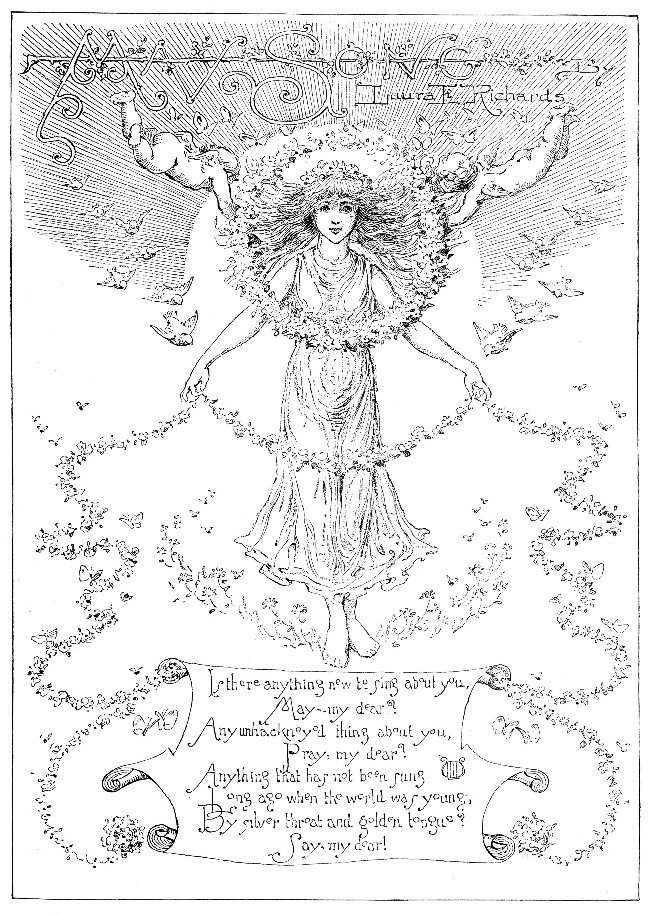
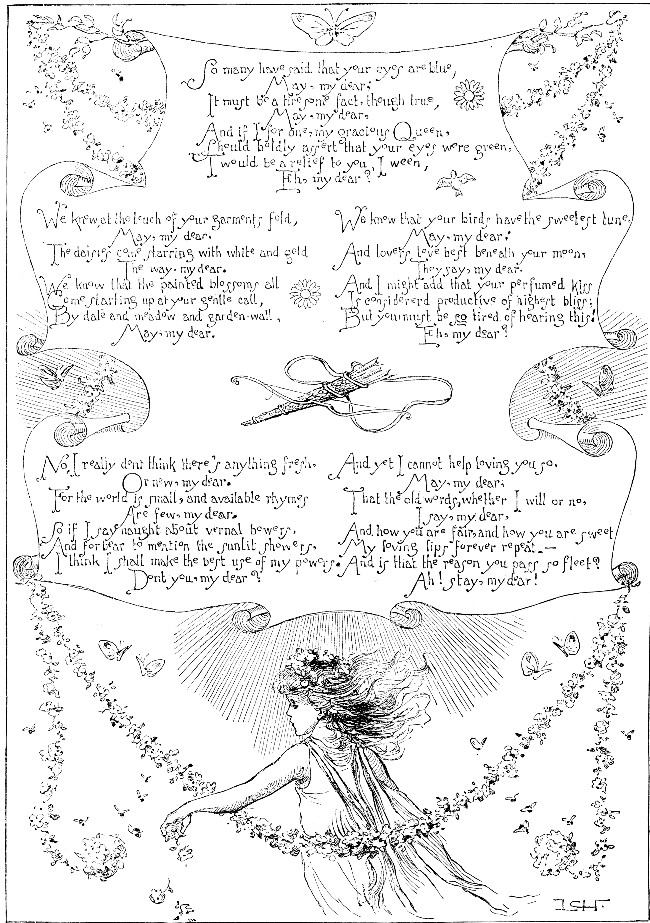
Tricycles had become an every-day affair in Sherridoc, and since the formation of the Girls' Club, lady tricyclers were not an extraordinary sight. So Charlotte, or "Charley" Van Rensselaer, as she was called, and her brother Starrett excited but little comment as they wheeled swiftly down Haymarket street, moving noiselessly and easily through the throng of carriages and other vehicles, until, as the houses grew less frequent and the pavements stopped altogether, they rolled through the suburbs of the town and so into the open country, without stay or pause.
For they were making time. The club itself, thanks to the failure of the express company to deliver Charley's new "Columbia" when promised, had several hours' start on the road; and Starrett, like the obliging brother that he was, had remained behind in order that Charlotte need not ride alone nor the club be longer delayed by waiting for her.
Charley Van Rensselaer, her cousin Cornelia, or "Corny" Hadwin, and their warm friends Mattie Hyde and Arno Cummings, were four bright and active young girls of from thirteen to sixteen, who composed the Girls' Tricycle Club. Little by little they had won first the interest and then the consent of their somewhat conservative parents to this novel but exhilarating exercise, and having now become expert riders, they were off for a long run of eighty miles down Cape Cod from Sherridoc City to Curtin Harbor, where their parents had summer cottages. Faithful and clever Joe Marston, Mr. Van Rensselaer's colored servant, and an expert tricycler, had gone ahead with the club as guide and commissary-general, and Starrett Van Rensselaer, Charley's younger brother, was invited to accompany them as an escort, on the odd-looking "Royal Mail" he had borrowed for the trip,—bicycles not being allowed.
And now the door-yards broaden out and the houses become still more rambling. There are wide-spreading orchard boughs, and cool woody spaces here and there between the farms. Now a youngster scampers into the house shrieking, "Ma, Ma! Oh, come here, Ma! Here's a girl a-ridin' three wheels at once!" and Charley, looking back, perceives the urchin's sisters and cousins and aunts peering at her from the door. Starrett too looks back, and laughs.
"You'll have to get used to that," he says.
"I expect to," responds Charley serenely; "but you must remember that four of these things have gone on before us on this same road and they must have taken off a little of the novelty."
Over the brow of Haymarket Hill they go, and the long steep sweep into the valley of the Owassee lies before them. Charley, with her feet on the "rest," commences to descend. An amazed cow grazing by the roadside makes a charge on the singular vehicle, but the girl never flinches, and with one hand on the steering-bar and the other on the brake she avoids every stone, every rut, every gully in the road. The irate cow, after nearly plunging on its nose down the first steep incline, pauses to recover its senses and then returns slowly up the hill. Starrett waves it a laughing adieu. "Sensible bovine that," he says; "she knows that a stern chase is a long chase."
"My, though!" exclaims delighted Charley, "we're just flying, Starrett! Aren't we?"
They are indeed. The bushes whiz past,—the wind sweeps their faces,—trees, stones, fences flit by like phantoms. Charley feels like a bird on the wing. Such exhilaration is there in a good tricycle "coast" downhill!
But it is not all such pleasure; for, a few miles farther on, they become acquainted with the other side of the story, as they go toiling up the long ascent of Comstock Hill, a sandy and winding incline that leads to the highlands of Fisherville.
"If it weren't for the sand," said Charley as she pushes her tricycle before her, "I would test the new 'power-gear' on my 'Columbia' by riding up Comstock Hill. But, dear me, I believe there are not three yards of solid earth on this road!"
"Never mind, we're more than half-way up," said Starrett, consolingly.
"Do you suppose it's sandy like this near Curtin Harbor?" inquired Charley.
"I haven't the least idea," Starrett replied. "If it is, we can branch off and take the cars at Minot Station."
"The cars? Why, Starrett Van Rensselaer!" exclaims Charley. "Why, I wouldn't take the cars—not for anything—unless—well, unless I were fairly driven to it."
And now they both draw a long breath, for the crest of Comstock Hill is won.
"Look behind you, Starrett," says Charley. "Did you ever see a prettier picture?"
Starrett acknowledges he never did. The low-lying[Pg 495] valley is green and fair. The Owassee stretches like a silver ribbon across the picture, and there is not a human being in sight save these two tricyclers who take all this summer beauty into their impressible young hearts.
On they go, through Fisherville and into the open country again. Truly no grass grows underneath those flashing wheels. The new "Columbia" has the oil well worked in by this time, and the "Royal Mail," with its queer one-sided "steerer," seems undisturbed by any ordinary roads. The freshening wind is behind them; the blue sky, cloud-flecked, above; and all around, bird-song and the rustle of blowing grass and bending boughs.
"This is grand, Charley!" cries Starrett; "so much better than horseback riding—and I've tried both."
"You don't tire yourself much more, and you're sure your horse won't run away with you," Charley assents, whizzing along beside him. "I feel strong enough for a good long run yet, and we ought to catch up with them easily, before long."
The winding, woody road brings them suddenly to a hill-top. To the right, below, lies a wide expanse of velvety marsh meadow, with its vivid and variegated tints of green, olive, and reddish-brown, and occasional intersections of tottering, moss-grown fence; there is a starry glimmer as of lilies in the frequent pools that give back the glory of the sun. To the left are seen the dark, still reaches of a lake that winds in and out in the cool shadow of high woody banks. An old ice-house stands lonesome and gray on its margin.
The brother and sister halt on the brow of the hill, to enjoy a view that may be one of the memories of a lifetime; then the wheels roll slowly toward the descent. The slope is steep and winding; they do not "coast" with feet on the rest above the steering-wheel. It is not desirable to capsize or collide with any up-coming vehicle. So they glide warily on, with hands on the brakes, until the bottom is reached. But here a crazy guide-post at a fork in the road misleads them by pointing in the wrong direction for the Wareham road. But by great good luck, they strike a shady wood track, full two miles long, which cuts off five miles from the road they should have traveled, and which, so Starrett says when he recognizes it, will bring them just so much nearer the club. Dismounting at last, a pine-covered knoll, with a brook bubbling below, attracts them; and, seated on the brown pine-needles, the brother and sister talk over their adventures, and wonder how far ahead the others may be. Suddenly Starrett, who faces the road, drops his hands to his side with an exclamation of surprise.
"What now?" says Charley, looking quickly around, A glance makes her a partner in Starrett's astonishment; for, over the main road they have just now regained, come one, two, three, four tricycles, their glittering spokes flashing in the sun. They see Joe Marston's dusky face and stalwart figure, and behind him they catch the flutter of garnet and blue—the colors of the club. Occasionally a head in the procession turns to look expectantly behind.
Starrett and Charley keep close in the shade of the pines, restraining a laugh with difficulty.
"Here is a good place to stop, Joe," cries Cornelia Hadwin. "It's cool and shady, and we can see the road. I think they should have caught up with us by this time. Can anything have happened,—do you suppose?"
"Dunno, miss," answers Joe with a grave face. But as he dismounts to wheel his machine up the knoll, he stops short with a sudden smoothing out of all the perplexed lines from his dark brow. "Hi, dar!" he exclaims. "Look-a yer, Miss Corney!"
Cornelia does look, and so do all the rest. There is a perfect chorus of shrieks and laughter, a babel of voices, a torrent of questions.
"Oh, we travel, I assure you!" says Starrett. "We took a flying leap and came in ahead of you."
"How did it happen? When did you pass us?" These and countless other questions follow. Then all is explained, and at five o'clock the merry six are on the road again, rolling along in lively style.
So, in single file, with Joe in advance, and Starrett bringing up the rear, the club rides through the main street of Wareham, down the long slant to the bridge over the Wareham river. The evening mist hangs low along the stream; the bridge seems to stretch across the rushing tide and end abruptly in mid-air. The soft, grayish opaque cloud hides the farther shore from sight.
There are heads at doors and windows, and people on the street stop to gaze. At first the girls feel a little abashed at so much attention. But nobody is discourteous; Joe rides steadily on, and there is nothing to do but to follow.
"I suppose we do look queer to them," says Mattie Hyde.
"Oh, well, you are missionaries, you know," says Starrett assuringly. "Perhaps your club may be the means of introducing tricycles into many of the places we shall pass through."
"That's one of our objects, of course," observes Charley.
"If girls and women knew what comfort one can take with a tricycle, half the battle would be won," says Arno Cummings timidly.[Pg 496]
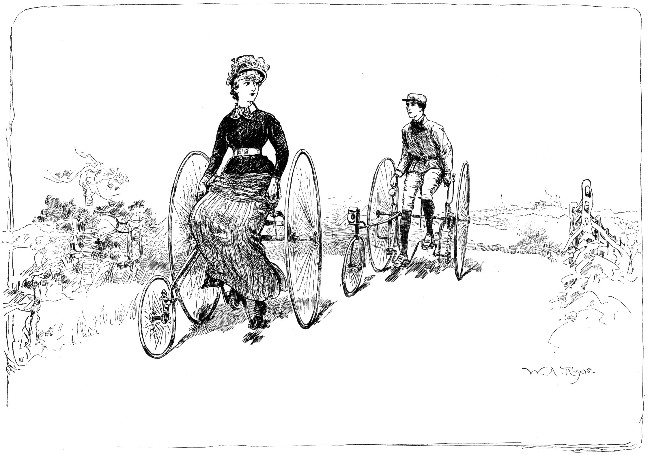 "THE BUSHES WHIZ PAST,—TREES, STONES, FENCES FLIT BY
LIKE PHANTOMS."
"THE BUSHES WHIZ PAST,—TREES, STONES, FENCES FLIT BY
LIKE PHANTOMS."
"It isn't altogether that, Arno," says Charley, who, as the originator of the club, has her advanced theories to support. "A good many would like to, but don't really dare. You know that Shakspere says 'Conscience doth make cowards of us all.' I think that custom makes us cowards, too."
"Custom will be on our side, though, by and by," declares Mattie Hyde. "Doctor Sawyer told Mamma the other day that he would prescribe the tricycle rather than medicine for many of his patients. He said that the machines are much used in England, and that they are gaining ground in this country, though not so rapidly as he could wish."
But even this knowledge of the healthfulness and desirability of the tricycle does not make a hard piece of road any easier. After a night's rest at the hospitable house of an aunt of Mattie Hyde's, the club find themselves, next day, among the "Sandwiches," as Starrett facetiously dubs the town of that name which is divided into North, East, South, and West Sandwich. And there they come upon a wooded tract that sorely taxes their endurance and presents the most formidable obstacle they have yet encountered. The sand is impassable; it closes completely over the wheel-tires, and, after a short space of arduous labor, the club come to a dismayed standstill.
"What on earth are we to do?" queries Corny Hadwin in despair.
No one answers her. The boughs wave softly overhead; the small cloud of dust their efforts have raised floats slowly away and settles on the scant herbage underneath the pines. Near at hand sounds the shriek of the "up" train. They are not far from the railroad.
"Shall we give it up and take to the train?" Starrett asks, as they catch the sound of the locomotive.
"Dear me, we mustn't do that!" exclaims Charley. "Let's dismount and push the machines a little way. Perhaps the wheeling is better just ahead."
But it is not. The ruts are strewn with straw, shavings, and chips; everything indicates that the woods are extensive, and that others before them have found the sand a tribulation.
"Oh, this is the worst of all!" groans Corny.
"But we'll not give up, nevertheless," declares little Arno Cummings, developing unexpected grit in the emergency. "I shouldn't like to tell them[Pg 497] at Curtin Harbor that we had to take to the cars to get around a difficulty."
Joe mops the perspiration from his dusky brow, and then stops to listen. A creak, a rumble, and a tramp, tramp are heard behind them. "Dar's sumfin a-comin!" says Joe.
The "sumfin" soon appears in sight,—a big, empty, four-horse wagon, making its unwieldy way in their direction. The same idea occurs to everybody at once.
"There! He'll carry us!"
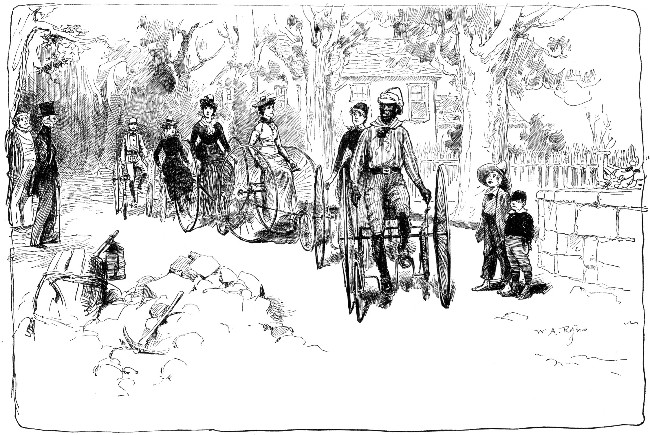 WITH JOE IN ADVANCE, THE CLUB RIDES THROUGH WAREHAM.
WITH JOE IN ADVANCE, THE CLUB RIDES THROUGH WAREHAM.
Carry them! Of course he will—for a consideration. And almost before the driver has recovered from his evident astonishment at this vision of six tricycles in the heart of the Sandwich woods, the riders and their machines are safely in the big cart, and on their way through the sandy tract, which, they now learn, is several miles in extent.
It is impossible for the horses to go faster than a walk for the whole distance. The sand is a constant clog, and scarcely a breath of air can penetrate the close piny ranks on either side the narrow road. It is a slow and somewhat crowded ride, but the club tells stories, sings and jokes and answers the curious inquiries of their teamster, to whom a tricycle is a thing unknown till now. But in due time, the young folk have bidden him good day, and are speeding on toward Barnstable. The air grows salty, strong, and bracing.
"It's like a breath of new life," says Starrett; and soon they are rolling between the long row of grand old trees that line Barnstable's quiet main street. At the hotel they stop for dinner and a noonday rest.
It is four in the afternoon when they remount. The lady boarders, who have taken quite an interest in the young tricyclers, bid them farewell with all manner of good wishes, and one gray-haired society lady remarks, "Those girls are sensible; and their mothers are sensible too. Give young people the delights of nature and the freedom of outdoor sports, and keep them from late parties, and the whirl of folly and fashion. I've seen too many young lives warped and twisted and weakened in the endeavor to 'keep up' in fashionable society. Yes, those girls are sensible."
And, wheeling still, by hill and dale, the "sensible" girls and their escort roll merrily into old Yarmouth, with its broad, shady streets and big, substantial, old-fashioned houses. Quaint and picturesque indeed it is, with quiet nooks and corners, breezy streets, time-stained wharves where lie battered fishing craft and the smarter boats devoted to[Pg 498] the summer visitors who have found out the beauties of the town. Here, too, Arno Cummings has an uncle, a bluff and breezy old sea-captain, who gives the whole party a hearty welcome; and at his house, the club spend two nights and the day between—a day of shade and shine, with the sea wind blowing everywhere. They explore the old town from end to end. They come continually upon pictures,—now a broad grassy lane with its moss-grown fences flanked by rising pastures of brownish grass; now a long slope ending in a rocky outlook over the blue sea; now a brown cottage nestled in among trees and hills. And on the second morning after their arrival, they bid the hospitable Captain Cummings adieu, and pass, single file, over the great drawbridge across the inlet that cuts Yarmouth in two, and so spin along through the succession of little towns which, leaving Yarmouth, almost join together into one. Such are the "Dennises"—divided as usual into North, East, South and West,—and the "Harwiches," where at Harwich proper the tricyclers bid farewell to the railroad which has kept them company at short intervals all the way down.
"Six miles to Curtin Harbor." So says the lazy youth at a cross roads store, and away they spin, while the spires and houses of Harwich disappear behind the trees.
And now how the wind blows! And all around the horizon the sky has that watery appearance that betokens the nearness of the sea. There is a peculiar, bracing freedom in the wild, salt wind; the very sway of the brown grass, the swing of the odorous wild pinks that nod in the corners of old mossy fences have a life and freshness that one misses greatly in tamer, more settled districts. For now they are plunging bravely into the long stretch of sand barrens and pine woods that, with only an occasional house, stretch for many a mile between Harwich and Curtin Harbor.
But here, in the afternoon, a sudden shower overtakes them. They can no longer pick their dainty way by the roadside, but must keep the middle track or run the risk of upsetting. There is scarce a quarter of a mile of level ground to be found. The pine woods close in upon them, and when at the summit of a hill they anxiously look for some other shelter than the thronging pines, they can see nothing but the long, winding, lightish streak of road and the endless outlines of monotonous pine-trees on either side against the dark sky.
"Six miles to Curtin Harbor!" cries Starrett at last. "That boy's a fraud. I believe it's sixty."
"Reckon dey're Cape Cod miles, Mas'r Starrett," says Joe. "Dey say down yer, yo' know, dat one on 'em 's equal to two ob good trav'lin' in any uthah part ob de worl'."
If it were only clear now, coasting merrily down these hills would be royal fun, but in this state of the weather caution is necessary. A halt is called for consultation. The six composedly dismount and sit down on the clumps of "poverty grass," beneath the doubtful shelter of the pines.
"Well, now," asks Starrett, "what are we going to do? I know you girls are tired and drenched; you needn't deny it. And there's no sign of a house this side of Jericho or Jerusalem."
Suddenly Charley has an idea. "O girls," she says, "let's camp out, right here! We're not badly off, for we all have our waterproof cloaks; but you've all been longing for an adventure, and here's one for a finale. We'll at least make a tent and have supper. It'll be just splendid!"
The club vociferously acquiesce. Joe alone, dubious, shakes his head. But he is outvoted and overruled.
A quantity of pine boughs are piled, by Joe and Starrett, tent-fashion, across and around four of the tricycles; a heap of dry leaves, carefully collected, makes a fragrant couch, whereon the young ladies compose themselves, wrapped and snugly covered with shawls and capes from the "luggage-carriers." Lastly Joe spreads the rubber waterproofs securely over the wheels and boughs, and the young campers are completely sheltered.
A rummage in the lunch-boxes and "luggage-carriers" of the six machines brings to light half a dozen soda crackers, two bananas, six pieces of gingerbread, a slice of dry cheese, three apples, and—this is Joe's surprise!—a small can of chicken.
A chorus of delight greets this last discovery, and Joe is at once besieged.
"Now, yo' jes' sot down, ef yo' please, young ladies," says Joe, holding the can above his head. "I'll 'tend to yo' d'reckly. Yo' jes' gib me de tings and I'll serve supper in fus'-class style."
When the chicken,—delicately served on the soda crackers,—the apples, bananas, and gingerbread are distributed, and the cheese toasted—in a fashion—at one of the lamps, the merry six leave not a crumb to tell the tale. It is true that a conscious vacancy still exists in the six hungry stomachs—such appetites have these young wheelers; but they are refreshed and no one thinks of complaining.
The merry meal finished, weariness and the patter of rain incline the girls to rest, and soon silence falls upon the camp, broken only by the sighing of the wind among the dark pine boughs, and the occasional chirp of some sleepy bird.
Then Starrett, also, wrapped in his waterproof coat, throws himself down to rest beneath the shelter of a friendly pine close by.
Joe, left alone as the sentinel, falls to thinking over the situation, wondering where they are and[Pg 499] whether they have missed the right road. He walks about uneasily and then stands looking up and down the stretch of road. The tricycle lamp, which he has lighted to dispel the gloom, casts a yellow gleam over the tent and Starrett's shrouded figure, while beyond and all around are the pines with their swaying branches and the long black vistas between. Joe walks back and forth, in the rain, vainly trying to think in which direction they are to proceed.
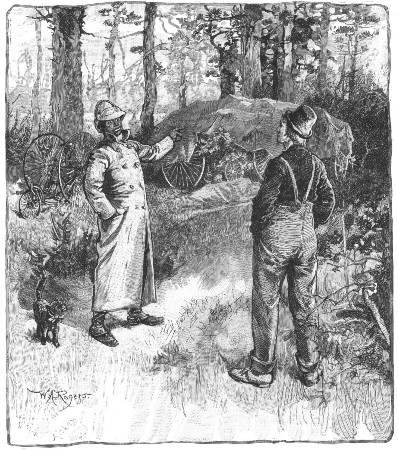 "DE YOUNG GEMMAN AN' I MAKE DIS TENT TO KEEP DE YOUNG
LADIES DRY."
"DE YOUNG GEMMAN AN' I MAKE DIS TENT TO KEEP DE YOUNG
LADIES DRY."
He has been wondering thus for perhaps five minutes, when he becomes aware of a pair of fiery eyes watching him from the shadows. Joe starts. He does not know what peculiar class of wild beasts inhabits Cape Cod, but there are the eyes plainly enough. He stops and stands motionless. The eyes move, come boldly forward, and Joe, now doubly astonished, sees full in the glare of the tricycle lamp—a big grayish cat!
And the cat has a nickel-plated collar with a ribbon attached. Joe knows that even on Cape Cod no wild beasts roam about, in summer storms, with nickeled and be-ribboned collars, but what can a cat be doing away in the depths of a pine forest? And then he suddenly concludes that the cat's home can not be far away. The gray cat comes purring about his knees. Joe is fond of cats, so he takes it in his arms and fondles its wet fur, and it proves to be company for him and really helps him to forget the discomfort of the rain.
At about seven o'clock in the evening, however,[Pg 500] the rain slackens, the clouds scatter, and rifts of light appear through the trees. And just as Joe is thinking of rousing the club for another "spin," he hears a whistle and a heavy step from across the road. Then an old farmer fellow of about forty-five, in search of a lost cow, comes to an abrupt and amazed halt at confronting among the pines Joe, the gray cat, Starrett's recumbent figure, the tent, and the glimmering tricycle wheels. He stands speechless until Joe's voice breaks the spell.
"Good-ebenin', sar," says Joe. "Can you tell me if dis is de road to Curtin Harbor?"
"Curtin Harbor!" exclaims the farmer, with his eyes still full of mute amazement. "No, it's not. 'T any rate not the direct one. If you've come over from Harwich, you've gone two miles out of yer way. You should have taken the other road, back there by the old school-house."
"Dar's whar I missed it!" cries Joe, slapping his knee. "I was suah I did sumfin' wrong somewhar, but I couldn't locate it, to save me! I'se much obliged."
"You can cut across to the main road by crossing my field yonder and going up by the house just beyond——"
"Hi, den dere is a house over yar!" says Joe.
"Why, certainly," says the farmer, "not more than forty rods from here." And when Joe finds how very near he has been to a comfortable farmhouse he says he feels "like kickin' hisself."
"But," says the visitor, still eying the camp. "How did it all happen. Are you traveling on foot?"
"No, sar; on tricycles," explains Joe, proudly; "we are de Girls' Tricycle Club, all de way from Sherridoc, wid Mas'r Starrett an' me along to look arter 'em and see 'em safe down to Curtin Harbor. We los' de track back yondah, an' de young gemman an' I jes' rig up dis tent for to keep the young ladies dry an' gib 'em a chance to rest till de shower was ober."
The farmer's surprise grows to interest.
"And so this is a tricycle," he says. "And did the young ladies ride those things all the way from Sherridoc?"
"All de way, sar," answers Joe, proudly, "'cept when we wus stuck in de Sandywiches and had to be carted froo wid a team."
After the good man's curiosity has been satisfied, and Starrett has summoned the girls to appear, the worthy farmer strolls off after his lost cow, first inviting the club to the farm to another supper. One by one, the girls emerge from their camp, but when they hear how near to a house they have been during the rain, great is the laughter.
"I don't care, though," cries Cornelia Hadwin; "we've really had a sort of a camping-out time, and I'm glad of it."
After hearing Joe's report, the club determines to push on at once to Curtin Harbor in the early evening, without accepting the hospitable invitation to supper at the farmhouse.
The two miles to the main road are quickly traversed, and before long the club wheels around a long curve in the road, and the blue expanse of Curtin Harbor lies beneath them. The clouds are gone by this time; the rising moon shoots slantwise through a few thin, dissolving folds, and brings out ripples of gold and silver on the long seas. There seems to be a breeze that stirs the water to darker ruffles beyond the head-land, but where the young folk sit on their tricycles, enjoying the beauty of the scene and the salty damp of the evening air, not a blade of the coarse, silvery beach-grass stirs; every spire and blade stands in sheeny silver in the mellow light.
Below the beach-road branches off a long winding descent to the quiet cottages which lie in the evening glow, seemingly fast asleep.
"Now, girls, for a good coast!" cries Starrett. "Here goes!"
And away indeed he goes, over the brow of the hill, rolling swiftly, and removing his feet from the pedals as his machine gathers way. Away also they all fly after him, merry as larks, waking all the echoes of the shore with their light-hearted shouts and laughter. The tricycle lamps flash out upon the seaward road, and soon it comes to pass, that as Charley's wheels whiz flashing into the wide, grassy dooryard of a certain pleasant little summer abode, a hand lifts the window curtain, and a voice, with a ring of irrepressible gladness but a great pretense of gruffness, calls out:
"Is this my noisy daughter, who has been running wild for a week over all the roads on Cape Cod?"
"Oh, Papa!" cries Charley, gleefully, "we've had a perfectly charming trip!"
And so says the entire club. And they pass a vote of thanks to Joe for taking faithful care of them, and to Starrett for his excellent escort duty. And now when the story of their eighty-mile ride is told, everybody votes tricycling a wonderfully health-giving and delightful exercise, and the first long trip of the Girls' Tricycling Club a grand success.
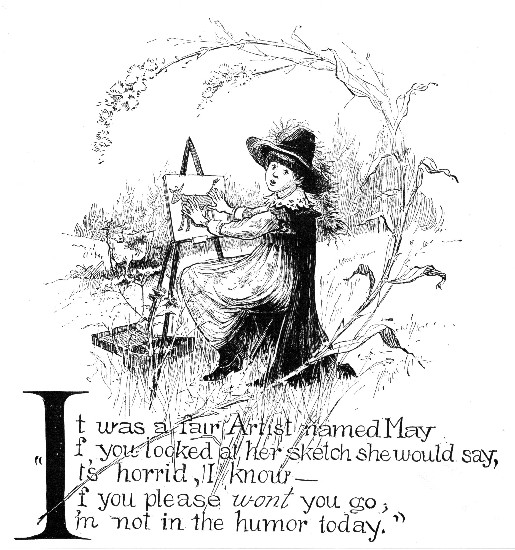
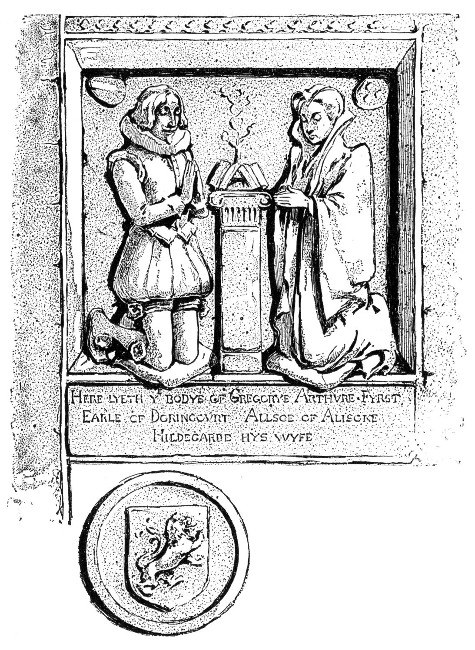
On the following Sunday morning, Mr. Mordaunt had a large congregation. Indeed, he could scarcely remember any Sunday on which the church had been so crowded. People appeared upon the scene who seldom did him the honor of coming to hear his sermons. There were even people from Hazelton, which was the next parish. There were hearty, sunburned farmers, stout, comfortable, apple-cheeked wives in their best bonnets and most gorgeous shawls, and half a dozen children or so to each family. The doctor's wife was there, with her four daughters. Mrs. Kimsey and Mr. Kimsey, who kept the druggist's shop, and made pills, and did up powders for everybody within ten miles, sat in their pew; Mrs. Dibble in hers, Miss Smiff, the village dressmaker, and her friend Miss Perkins, the milliner, sat in theirs; the doctor's young man was present, and the druggist's apprentice; in fact, almost every family on the county side was represented, in one way or another.
In the course of the preceding week, many wonderful stories had been told of little Lord Fauntleroy. Mrs. Dibble had been kept so busy attending to customers who came in to buy a pennyworth of needles or a ha'p'orth of tape and to hear what she had to relate, that the little shop bell over the door had nearly tinkled itself to death over the coming and going. Mrs. Dibble knew exactly how his small lordship's rooms had been furnished for him, what expensive toys had been bought, how there was a beautiful brown pony awaiting him, and a small groom to attend it, and a little dog-cart, with silver-mounted harness. And she could tell, too, what all the servants had said when they had caught glimpses of the child on the night of his arrival; and how every female below stairs had said it was a shame, so it was, to part the poor pretty dear from his mother; and had all declared their hearts came into their mouths when he went alone into the library to see his grandfather, for "there was no knowing how he'd be treated, and his lordship's temper was enough to fluster them with old heads on their shoulders, let alone a child."
"But if you'll believe me, Mrs. Jennifer, mum," Mrs. Dibble had said, "fear that child does not know—so Mr. Thomas hisself says; an' set an' smile he did, an' talked to his lordship as if they'd been friends ever since his first hour. An' the Earl so took aback, Mr. Thomas says, that he couldn't do nothing but listen and stare from under his eyebrows. An' it's Mr. Thomas's opinion, Mrs. Bates, mum, that bad as he is, he was pleased in his secret soul, an' proud, too; for a handsomer little fellow, or with better manners, though so old-fashioned, Mr. Thomas says he'd never wish to see."
And then there had come the story of Higgins. The Reverend Mr. Mordaunt had told it at his own dinner table, and the servant who had heard it had told it in the kitchen, and from there it had spread like wildfire.
And on market-day, when Higgins had appeared in town, he had been questioned on every side, and Newick had been questioned too, and in response had shown to two or three people the note signed "Fauntleroy."
And so the farmers' wives had found plenty to talk of over their tea and their shopping, and they had done the subject full justice and made the most of it. And on Sunday they had either walked to church or had been driven in their gigs by their husbands, who were perhaps a trifle curious themselves about the new little lord who was to be in time the owner of the soil.
It was by no means the Earl's habit to attend church, but he chose to appear on this first Sunday—it[Pg 503] was his whim to present himself in the huge family pew, with Fauntleroy at his side.
There were many loiterers in the churchyard, and many lingerers in the lane that morning. There were groups at the gates and in the porch, and there had been much discussion as to whether my lord would really appear or not. When this discussion was at its height, one good woman suddenly uttered an exclamation.
"Eh," she said; "that must be the mother, pretty young thing."
All who heard turned and looked at the slender figure in black coming up the path. The veil was thrown back from her face and they could see how fair and sweet it was, and how the bright hair curled as softly as a child's under the little widow's cap.
She was not thinking of the people about; she was thinking of Cedric, and of his visits to her, and his joy over his new pony, on which he had actually ridden to her door the day before, sitting very straight and looking very proud and happy. But soon she could not help being attracted by the fact that she was being looked at and that her arrival had created some sort of sensation. She first noticed it because an old woman in a red cloak made a bobbing curtsy to her, and then another did the same thing and said, "God bless you, my lady!" and one man after another took off his hat as she passed. For a moment she did not understand, and then she realized that it was because she was little Lord Fauntleroy's mother that they did so, and she flushed rather shyly and smiled and bowed too, and said, "Thank you" in a gentle voice to the old woman who had blessed her. To a person who had always lived in a bustling, crowded American city this simple deference was very novel, and at first just a little embarrassing; but after all, she could not help liking and being touched by the friendly warm-heartedness of which it seemed to speak. She had scarcely passed through the stone porch into the church before the great event of the day happened. The carriage from the Castle, with its handsome horses and tall liveried servants, bowled around the corner and down the green lane.
"Here they come!" went from one looker-on to another.
And then the carriage drew up, and Thomas stepped down and opened the door, and a little boy, dressed in black velvet, and with a splendid mop of bright waving hair, jumped out.
Every man, woman, and child looked curiously upon him.
"He's the Captain over again!" said those of the on-lookers who remembered his father. "He's the Captain's self, to the life!"
He stood there in the sunlight looking up at the Earl, as Thomas helped that nobleman out, with the most affectionate interest that could be imagined. The instant he could help, he put out his hand and offered his shoulder as if he had been seven feet high. It was plain enough to every one that however it might be with other people, the Earl of Dorincourt struck no terror into the breast of his grandson.
"Just lean on me," they heard him say. "How glad the people are to see you, and how well they all seem to know you!"
"Take off your cap, Fauntleroy," said the Earl. "They are bowing to you."
"To me!" cried Fauntleroy, whipping off his cap in a moment, baring his bright head to the crowd and turning shining, puzzled eyes on them as he tried to bow to every one at once.
"God bless your lordship!" said the curtsying, red-cloaked old woman who had spoken to his mother; "long life to you!"
"Thank you, ma'am," said Fauntleroy. And then they went into the church, and were looked at there, on their way up the aisle to the square, red-cushioned and curtained pew. When Fauntleroy was fairly seated he made two discoveries which pleased him: the first was that, across the church where he could look at her, his mother sat and smiled at him; the second, that at one end of the pew against the wall, knelt two quaint figures carven in stone, facing each other as they kneeled on either side of a pillar supporting two stone missals, their pointed hands folded as if in prayer, their dress very antique and strange. On the tablet by them was written something of which he could only read the curious words:
"Here lyethe ye bodye of Gregorye Arthure Fyrst Earle of Dorincort allsoe of Alysone Hildegarde hys wyfe."
"May I whisper?" inquired his lordship, devoured by curiosity.
"What is it?" said his grandfather.
"Who are they?"
"Some of your ancestors," answered the Earl, "who lived a few hundred years ago."
"Perhaps," said Lord Fauntleroy, regarding them with respect, "perhaps I got my spelling from them." And then he proceeded to find his place in the church service. When the music began, he stood up and looked across at his mother, smiling. He was very fond of music, and his mother and he often sang together, so he joined in with the rest, his pure, sweet, high voice rising as clear as the song of a bird. He quite forgot himself in his pleasure in it. The Earl forgot himself a little too, as he sat in his curtain-shielded corner of the pew and watched the boy. Cedric stood with the[Pg 504] big psalter open in his hands, singing with all his childish might, his face a little uplifted, happily; and as he sang, a long ray of sunshine crept in and, slanting through a golden pane of a stained glass window, brightened the falling hair about his young head. His mother, as she looked at him across the church, felt a thrill pass through her heart, and a prayer rose in it too; a prayer that the pure, simple happiness of his childish soul might last, and that the strange, great fortune which had fallen to him might bring no wrong or evil with it. There were many soft anxious thoughts in her tender heart in those new days.
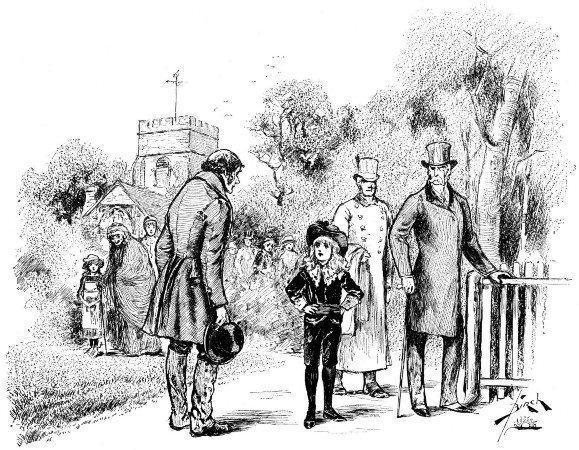 "I'VE A GREAT DEAL TO THANK YOUR LORDSHIP FOR," SAID
HIGGINS. (SEE NEXT PAGE.)
"I'VE A GREAT DEAL TO THANK YOUR LORDSHIP FOR," SAID
HIGGINS. (SEE NEXT PAGE.)
"Oh, Ceddie!" she had said to him the evening before, as she hung over him in saying good-night, before he went away; "oh, Ceddie, dear, I wish for your sake I was very clever and could say a great many wise things! But only be good, dear, only be brave, only be kind and true always, and then you will never hurt any one, so long as you live, and you may help many, and the big world may be better because my little child was born. And that is best of all, Ceddie,—it is better than everything else, that the world should be a little better because a man has lived—even ever so little better, dearest."
And on his return to the Castle, Fauntleroy had repeated her words to his grandfather.
"And I thought about you when she said that," he ended; "and I told her that was the way the world was because you had lived, and I was going to try if I could be like you."
"And what did she say to that?" asked his lordship, a trifle uneasily.
"She said that was right, and we must always look for good in people and try to be like it."
Perhaps it was this the old man remembered as he glanced through the divided folds of the red curtain of his pew. Many times he looked over the people's heads to where his son's wife sat alone, and he saw the fair face the unforgiven dead had loved, and the eyes which were so like those of the child at his side; but what his thoughts were, and whether they were hard and bitter, or[Pg 505] softened a little, it would have been hard to discover.
As they came out of the church, many of those who had attended the service stood waiting to see them pass. As they neared the gate, a man who stood with his hat in his hand made a step forward and then hesitated. He was a middle-aged farmer, with a careworn face.
"Well, Higgins," said the Earl.
Fauntleroy turned quickly to look at him.
"Oh!" he exclaimed; "is it Mr. Higgins?"
"Yes," answered the Earl dryly; "and I suppose he came to take a look at his new landlord."
"Yes, my lord," said the man, his sunburned face reddening. "Mr. Newick told me his young lordship was kind enough to speak for me, and I thought I'd like to say a word of thanks, if I might be allowed."
Perhaps he felt some wonder when he saw what a little fellow it was who had innocently done so much for him, and who stood there looking up just as one of his own less fortunate children might have done—apparently not realizing his own importance in the least.
"I've a great deal to thank your lordship for," he said; "a great deal. I——"
"Oh," said Fauntleroy; "I only wrote the letter. It was my grandfather who did it. But you know how he is about always being good to everybody. Is Mrs. Higgins well now?"
Higgins looked a trifle taken aback. He also was somewhat startled at hearing his noble landlord presented in the character of a benevolent being, full of engaging qualities.
"I—well, yes, your lordship," he stammered; "the missus is better since the trouble was took off her mind. It was worrying broke her down."
"I'm glad of that," said Fauntleroy. "My grandfather was very sorry about your children having the scarlet fever, and so was I. He has had children himself. I'm his son's little boy, you know."
Higgins was on the verge of being panic-stricken. He felt it would be the safer and more discreet plan not to look at the Earl, as it had been well known that his fatherly affection for his sons had been such that he had seen them about twice a year, and that when they had been ill, he had promptly departed for London, because he would not be bored with doctors and nurses. It was a little trying therefore to his lordship's nerves to be told, while he looked on, his eyes gleaming from under his shaggy eyebrows, that he felt an interest in scarlet fever.
"You see, Higgins," broke in the Earl with a fine grim smile; "you people have been mistaken in me. Lord Fauntleroy understands me. When you want reliable information on the subject of my character, apply to him. Get into the carriage, Fauntleroy."
And Fauntleroy jumped in, and the carriage rolled away down the green lane, and even when it turned the corner into the high road, the Earl was still grimly smiling.
Before Washington's marriage, and while he was in camp near Fort Cumberland, making active preparations for the campaign against Fort Duquesne, there was an election for members of the Virginia House of Burgesses. Washington offered himself as candidate to the electors of Frederic County, in which Winchester, where he had been for the past three years, was the principal town. His friends were somewhat fearful that the other candidates, who were on the ground, would have the advantage over Washington, who was with the army, at a distance; and they wrote, urging him to come on and look after his interests. Colonel Bouquet, under whose orders he was, cheerfully gave him leave of absence, but Washington replied:
"I had, before Colonel Stephen came to this place, abandoned all thoughts of attending personally the election at Winchester, choosing rather to leave the management of that affair to my friends, than be absent from my regiment, when there is a probability of its being called to duty. I am much pleased now, that I did so."
Here was a case where Washington broke his excellent rule of—"If you want a thing done, do it yourself." If his regiment was to lie idle at Fort[Pg 506] Cumberland, he could easily have galloped to Winchester, and have been back in a few days; but there was a chance that it might move, and so he gave up at once all thought of leaving it. Glad enough he was to have the news confirmed. To lead his men forward, and to have a hand in the capture of Fort Duquesne, was the first thing—the election must take care of itself. This was not a bad statement for his friends at Winchester to make. A man who sticks to his post, and does his duty without regard to his personal interests, is the very man for a representative in the legislature. The people of Frederic knew Washington thoroughly, and though they had sometimes felt his heavy hand, they gave him a hearty vote, and he was elected a member of the House of Burgesses.
This was in 1758, and he continued to serve as a member for the next fifteen years. There is a story told of his first appearance in the House. He was something more than a new member; he was the late Commander-in-Chief of the Virginia army, the foremost man, in a military way, in the province; he had just returned from the successful expedition against Fort Duquesne. So the House resolved to welcome him in a manner becoming so gallant a Virginian, and it passed a vote of thanks for the distinguished military services he had rendered the country. The Speaker, Mr. Robinson, rose when Washington came in to take his seat, and made a little speech of praise and welcome, presenting the thanks of the House. Every one applauded and waited for the tall colonel to respond. There he stood, blushing, stammering, confused. He could give his orders to his men easily enough, and he could even say what was necessary, to Mrs. Martha Custis; but to address the House of Burgesses in answer to a vote of thanks—that was another matter! Not a plain word could he get out. It was a capital answer, and the Speaker interpreted it to the House.
"Sit down, Mr. Washington," said he. "Your modesty equals your valor, and that surpasses the power of any language I possess."
It was a trying ordeal for the new member, and if speech-making had been his chief business in the House, he would have made a sorry failure. He rarely made a speech, and never a long one, but for all that he was a valuable member, and his re-election at every term showed that the people understood his value. If there was any work to be done, any important committee to be appointed, Washington could be counted on, and his sound judgment, his mature experience, and sense of honor, made his opinion one which every one respected. He was always on hand, punctual, and faithful; and qualities of diligence and fidelity in such a place, when combined with sound judgment and honor, are sure to tell in the long run. He once gave a piece of advice to a nephew who had also been elected to the House, and it probably was the result of his own experience and observation.
"The only advice I will offer," he said; "if you have a mind to command the attention of the House, is to speak seldom but on important subjects, except such as particularly relate to your constituents; and, in the former case, make yourself perfect master of the subject. Never exceed a decent warmth, and submit your sentiments with diffidence. A dictatorial style, though it may carry conviction, is always accompanied with disgust."
It was in January, 1759, that Washington took his seat in the House, and if he made it his rule "to speak seldom but on important subjects," he had several opportunities to speak before he finally left the Virginia Legislature for a more important gathering. The first very important subject was the Stamp Act, in 1765. The British Government had passed an act requiring the American colonies to place a stamp upon every newspaper or almanac that was published, upon every marriage certificate, every will, every deed, and upon other legal papers. These stamps were to be sold by officers of the crown, and the money obtained by the sale was to be used to pay British soldiers stationed in America to enforce the laws made by Parliament.
The colonies were aflame with indignation. They declared that Parliament had no right to pass such an act; that the Ministry that proposed it was about an unlawful business; and that it was adding insult to injury to send over soldiers to enforce such laws. People, when they meet on the corner of the street and discuss public matters, are usually much more outspoken than when they meet in legislatures; but the American colonists were wont to talk very plainly in their assemblies, and it was no new thing for the representatives, chosen by the people, to be at odds with the governor, who represented the British Government. So when Patrick Henry rose up in the House of Burgesses, with his resolutions declaring that the Stamp Act was illegal and that the colony of Virginia had always enjoyed the right of governing itself, as far as taxation went,—and when he made a flaming speech which threatened the King, there was great confusion; and though his resolutions were passed, there was but a bare majority.
There is no record of what Washington may have said or how he voted on that occasion, but his letters show that he thought the Stamp Act a very unwise act on the part of Great Britain, and a[Pg 507] piece of oppression. "That Act," he says, "could be looked upon in no other light by every person who would view it in its proper colors." But he did not rush into a passion over it. Instead, he studied it coolly, and before it was repealed, wrote at some length to his wife's uncle, who was living in London, his reasons for thinking that the British Ministry would gain nothing by pressing the Stamp Act and other laws which bore hard on colonial prosperity; for he held that if they would only see it, the colonies were as necessary to England as England to the colonies.
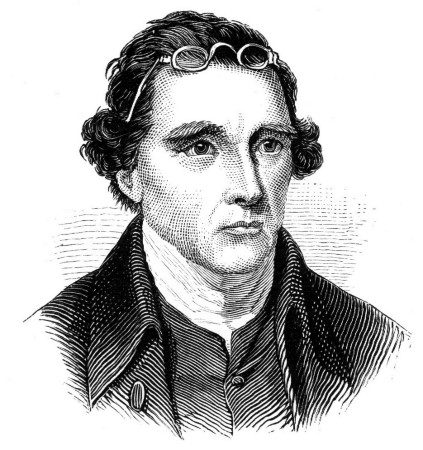 PATRICK HENRY.
PATRICK HENRY.
It is difficult for us to-day to put ourselves in the place of Washington and other men of his time. Washington was a Virginian, and was one of the Legislature. He was used to making laws and providing for the needs of the people of Virginia, but he was accustomed to look beyond Virginia to England. There the King was, and he was one of the subjects of the King. The King's officers came to Virginia, and when Washington saw, as he so often did, a British man-of-war lying in the river off Mount Vernon, his mind was thrilled with pleasure as he thought of the power of the empire to which he belonged. He had seen the British soldiers marching against the French, and he had himself served under a British general. He had an ardent desire to go to England, to see London, to see the King and his Court, and Parliament, and the Courts of Justice, and the great merchants who made the city famous; but as yet he had been unable to go.
He had seen but little of the other colonies. He had made a journey to Boston, and that had given him some acquaintance with men; but wherever he went, he found people looking eagerly toward England and asking what the Ministry there would do about fighting the French on the Western borders. Though he and others might never have seen England, it was the center of the world to them. He thought of the other colonies not so much as all parts of one great country on this side of the Atlantic, as each separately a part of the British Empire.
After all, however, and most of all, he was a Virginian. In Virginia he owned land. There was his home, and there his occupation. He was a farmer, a planter of tobacco and wheat, and it was his business to sell his products. As for the French, they were enemies of Great Britain, but they were also very near enemies of Virginia. They were getting possession of land in Virginia itself—land which Washington owned in part; and when he was busily engaged in driving them out, he did not have to stop and think of France, he needed only to think of Fort Duquesne, a few days' march to the westward.
When, therefore he found the British Government making laws which made him pay roundly for sending his tobacco to market, and taxing him as if there were no Virginia Legislature to say what taxes the people could and should pay, he began to be restless and dissatisfied. England was a great way off; Virginia was close at hand. He was loyal to the King and had fought under the King's officers, but if the King cared nothing for his loyalty, and only wanted his pence, his loyalty was likely to cool. His chief resentment, however, was against Parliament. Parliament was making laws and laying taxes. But what was Parliament? It was a body of law-makers in England, just as the House of Burgesses was in Virginia. To be sure, it could pass laws about navigation which concerned all parts of the British Empire; but, somehow, it made these laws very profitable to England and very disadvantageous to Virginia. Parliament, however, had no right to pass such a law as the Stamp Act. That was making a special law for the American colonies, and taking away a right which belonged to the colonial assemblies.
Washington had grown up with an intense love of law, and in this he was like other American Englishmen. In England there were very few persons who made the laws, the vast majority had nothing to do but to obey the laws. Yet it is among the makers of laws that the love of law prevails; and since in America a great many more Englishmen had to do with government in colony and in town than in England, there were more who passionately insisted upon the law being observed. An unlawful act was to them an outrage. When they said that England was oppressing them, and[Pg 508] making them slaves, they did not mean that they wanted liberty to do what they pleased, but that they wanted to be governed by just laws, made by the men who had the right to make laws. And that right belonged to the legislatures, to which they sent representatives.
So it was out of his love of law and justice that Washington and others protested against the Stamp Act; and when the act was repealed, they threw up their hats and hurrahed, not because they now should not have to buy and use stamps, but because by repealing the act, Parliament had as much as said that it was an unlawful act. However, this was an unwilling admission on the part of Parliament, which repealed the act, but said at once: "We can tax you if we choose to."
In fact, Parliament stupidly tried soon after to prove that it had the right by imposing duties on tea, paper, glass, and painters' colors. But the people in the colonies were on the alert. They had really been governing themselves so long that now, when Parliament tried to get the power away from them, they simply went on using their power. They did this in two ways; the colonial governments again asserted their rights in the case, and the people began to form associations, in which they bound themselves not to buy goods of England until the offensive act was repealed. This latter was one of the most interesting movements in the breaking away of the colonies from England. It was a popular movement; it did not depend upon what this or that colonial assembly might do; it was perfectly lawful, and so far as it was complete it was effective. Yet all the while the movement was doing more, and what but a very few detected; it was binding the scattered people in the colonies together.
Washington took a great deal of interest in these associations, and belonged to one himself. He was growing exceedingly impatient of English misrule, and saw clearly to what it was leading. "At a time," he says, "when our lordly masters in Great Britain will be satisfied with nothing less than the deprivation of American freedom, it seems highly necessary that something should be done to avert the stroke, and maintain the liberty which we have derived from our ancestors. But the manner of doing it to answer the purpose effectually is the point in question. That no man should scruple, or hesitate a moment, to use arms in defense of so valuable a blessing, is clearly my opinion. Yet arms, I would beg leave to add, should be the last resort. We have already, it is said, proved the inefficacy of addresses to the throne, and remonstrances to Parliament. How far, then, their attention to our rights and privileges is to be awakened or alarmed by starving their trade and manufactures, remains to be tried."
He took the lead in forming an association in Virginia, and he kept scrupulously to his agreement; for when he sent his orders to London, he was very careful to instruct his correspondents to send him none of the goods unless the Act of Parliament had meantime been repealed. As the times grew more exciting, Washington watched events steadily. He took no step backward, but he moved forward deliberately and with firmness. He did not allow himself to be carried away by the passions of the time. It was all very well, some said, to stop buying from England, but let us stop selling also. They need our tobacco. Suppose we refuse to send it unless Parliament repeals the Act. Washington stood out against that except as a final resource, and for the reason which he stated in a letter:
"I am convinced, as much as I am of my own existence, that there is no relief for us but in their distress; and I think, at least I hope, that there is public virtue enough left among us to deny ourselves everything but the bare necessaries of life to accomplish this end. This we have a right to do, and no power upon earth can compel us to do otherwise, till it has first reduced us to the most abject state of slavery. The stopping of our exports would, no doubt, be a shorter method than the other to effect this purpose; but if we owe money to Great Britain, nothing but the last necessity can justify the non-payment of it; and, therefore, I have great doubts upon this head, and wish to see the other method first tried, which is legal and will facilitate these payments."
That is, by the economy necessarily preached, the people would save money with which to pay their debts.
Washington had been at the front both in the House of Burgesses, in his own county, and among the people generally. He was a member of the convention called to meet at Williamsburg; and he was appointed by that convention one of seven delegates to attend the first Continental Congress at Philadelphia.
Near the end of August, 1774, Patrick Henry and Edmund Pendleton, two of the delegates from Virginia to the first Continental Congress, rode from their homes to Mount Vernon and made a short visit. Then, on the last day of the month, Washington mounted his horse also, and the three friends started for Philadelphia to attend the congress, which was called to meet on the 5th of September. Pendleton was a dozen years older than Washington, and Henry was the youngest of the party. He was the most fiery in speech, and more than once, in recent conventions, had carried his hearers away by his bold words. He was the most[Pg 509] eloquent man in the colonies,—of rude appearance, but when once wrought up by excitement, able to pour out a torrent of words.
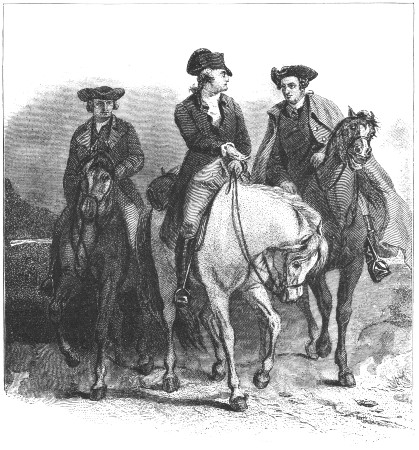 WASHINGTON, PATRICK HENRY, AND EDMUND PENDLETON ON THEIR
WAY TO PHILADELPHIA, AS DELEGATES TO THE FIRST CONTINENTAL CONGRESS.[D]
WASHINGTON, PATRICK HENRY, AND EDMUND PENDLETON ON THEIR
WAY TO PHILADELPHIA, AS DELEGATES TO THE FIRST CONTINENTAL CONGRESS.[D]
For my part, I would rather have heard the speech which Washington made at the convention in Williamsburg in the August before, when he rose up to read the resolution which he and his neighbors had passed at their meeting in Fairfax County. The eloquence of a man who is a famous orator is not quite so convincing as that of a man of action, who rarely speaks, but who is finally stirred by a great occasion. People were used to hearing Washington say a few words in a slow, hesitating, deliberate way; and they knew that he had carefully considered beforehand what words he should use. But this time he was terribly in earnest, and when he had read the resolution, he spoke as no one had heard him before. He was a passionate man who had his anger under control; but when it occasionally burst out, it was as if a dam to a stream had given way. And now he was consumed with indignation at the manner in which Great Britain was treating the colonies. He was ready, he said, to raise a regiment of a thousand men, pay all their expenses, and lead them to Boston to drive out the King's soldiers.
The three men, therefore, must have talked long and earnestly as they rode to Philadelphia; for the Congress which they were to attend was the first one to which all the colonies were invited to send delegates. It was to consider the cause of the whole people, and Virginia was to see in Massachusetts not a rival colony, but one with which she had common cause. The last time Washington had gone over the road he had been on an errand to the King's chief representative in America, the Commander-in-Chief, Governor Shirley, and one matter which he had held very much at heart had been his own commission as an officer in His Majesty's army. He was on a different errand now. Still, like the men who were most in earnest at that time, he was thinking how the colonies could secure their rights as colonies, not how they might break away from England and set up for themselves.
They were five days on the road, and on September the 4th, they breakfasted near Newcastle, in Delaware, dined at Chester, in Pennsylvania, and in the evening were in Philadelphia, at the City Tavern, which stood on Second street, above Walnut street, and was the meeting-place of most of the delegates. Washington, however, though he was often at the City Tavern, had his lodging at Dr. Shippen's. The Congress met the next day at Carpenters' Hall, and was in session for seven weeks. The first two or three days were especially exciting to the members. There they were, fifty-one men, from all the colonies save[Pg 510] Georgia, met to consult together—Englishmen who sang "God save the King," but asked also what right the King had to act as he had done toward Boston. They did not know one another well at the beginning. There was no man among them who could be called famous beyond his own colony, unless it was George Washington. Up to this time the different colonies had lived so apart from one another, each concerned about its own affairs, that there had been little opportunity for a man to be widely known.
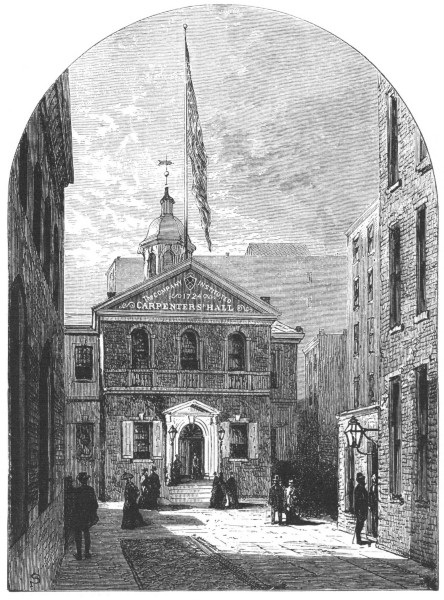 CARPENTERS' HALL, PHILADELPHIA, WHERE THE FIRST
CONTINENTAL CONGRESS ASSEMBLED.
CARPENTERS' HALL, PHILADELPHIA, WHERE THE FIRST
CONTINENTAL CONGRESS ASSEMBLED.
So, as they looked at one another at the City Tavern, or at the Carpenters' Hall when they met, each man was wondering who would take the lead. Virginia was the largest and most important colony. Massachusetts had a right to speak, because she had called the convention, and because it was in Boston that the people were suffering most from the action of the British Parliament. Perhaps the two most conspicuous members at first were Patrick Henry, of Virginia, and Samuel Adams, of Massachusetts; but in the seven weeks of the session, others showed their good judgment and patriotism. Patrick Henry was asked after he returned to Virginia whom he considered the greatest man in the Congress, and he replied: "If you speak of eloquence, Mr. Rutledge, of South Carolina, is by far the greatest orator; but if you speak of solid information and sound judgment, Colonel Washington is unquestionably the greatest man on the floor."
Washington carried on the methods which he had always practiced. He attended the sessions punctually and regularly; he listened to what others had to say, and gave his own opinion only after he had carefully formed it. It is an example of the thoroughness with which he made himself master of every subject, that he used to copy in his own hand the important papers which were laid before Congress, such as the petition to the King which was agreed upon. This he would do deliberately and exactly,—it was like committing the paper to memory. Besides this, he made abstracts of other papers, stating the substance of them in a few clear words.
The greater part of each day was occupied in the Congress, but besides the regular business, there was a great deal of informal talk among the members. They were full of the subject, and used to meet to discuss affairs at dinner, or in knots about the fire at the City Tavern. Philadelphia was then the most important city in the country, and there were many men of wide experience living in it. Washington went everywhere by invitation. He dined with the Chief Justice, with the Mayor, and with all the notable people.
In this way he was able to become better acquainted both with the state of affairs in other colonies and with the way the most intelligent people were thinking about the difficulties of the time. The first Continental Congress gave expression to the deliberate judgment of the colonies upon the acts of Great Britain. It protested against the manner in which Parliament was treating the colonies. It declared firmly and solemnly that as British subjects the people of the colonies owed no allegiance to Parliament, in which they had no representatives; that their own legislatures[Pg 511] alone had the right to lay taxes. But after all, the great advantage of this first Congress was in the opportunity which it gave for representatives from the different colonies to become acquainted with one another, and thus to make all parts of the country more ready to act together.
It was only now and then that any one suggested the independence of the colonies. Washington, like a few others, thought it possible the colonies might have to arm and resist the unlawful attempt to force unconstitutional laws upon them; but he did not, at this time, go so far as to propose a separation from England. He had a friend among the British officers in Boston, one of his old comrades in the war against France, a Captain Mackenzie, who wrote to him, complaining of the way the Boston people were behaving. Captain Mackenzie, very naturally, as an officer, saw only a troublesome, rebellious lot of people whom it was the business of the army to put down. Washington wrote earnestly to him, trying to show him the reason why the people felt as they did, and the wrong way of looking at the subject which Captain Mackenzie and other officers had. He expressed his sorrow that fortune should have placed his friend in a service that was sure to bring down vengeance upon those engaged in it. He went on:
"I do not mean by this to insinuate that an officer is not to discharge his duty, even when chance, not choice, has placed him in a disagreeable situation; but I conceive, when you condemn the conduct of the Massachusetts people, you reason from effects, not causes; otherwise you would not wonder at a people, who are every day receiving fresh proofs of a systematic assertion of an arbitrary power, deeply planned to overturn the laws and constitution of their country, and to violate the most essential and valuable rights of mankind, being irritated, and with difficulty restrained from acts of the greatest violence and intemperance. For my own part, I confess to you candidly, that I view things in a very different point of light from the one in which you seem to consider them; and though you are taught by venal men ... to believe that the people of Massachusetts are rebellious, setting up for independency, and what not, give me leave, my good friend, to tell you, that you are abused, grossly abused.... Give me leave to add, and I think I can announce it as a fact, that it is not the wish or interest of that government, or any other upon this continent, separately or collectively, to set up for independence; but this you may at the same time rely on, that none of them will ever submit to the loss of those valuable rights and privileges which are essential to the happiness of every free State, and without which, life, liberty, and property are rendered totally insecure."
It was with such a belief as this that Washington went back to Mount Vernon, and while he was occupied with his engrossing private affairs, busied himself also with organizing and drilling soldiers. Independent companies were formed all over Virginia, and one after another placed themselves under his command. Although, by the custom of those companies, each was independent of the others, yet by choosing the same commander they virtually made Washington Commander-in-Chief of the Virginia volunteers. He was the first military man in the colony, and every one turned to him for advice and instruction. So through the winter and spring, he was constantly on the move, going to one place after another to review the companies which had been formed.
I think that winter and spring of 1775 must have been a somewhat sorrowful one to George Washington, and that he must have felt as if a great change were coming in his life. His wife's daughter had died, and he missed her sadly. Young John Custis had married and gone away to live. The sound of war was heard on all sides, and among the visitors to Mount Vernon were some who afterward were to be generals in the American army. He still rode occasionally after the hounds, but the old days of fun were gone. George William Fairfax had gone back to England, and the jolly company at Belvoir was scattered. The house itself there had caught fire, and burned to the ground.
But the time for action was at hand. Washington turned from his home and his fox-hunting to go to Richmond as a delegate to a second Virginia convention. It was called to hear the reports of the delegates to Philadelphia and to see what further was to be done. It was clear to some, and to Washington among them, that the people must be ready for the worst. They had shown themselves in earnest by all the drill and training they had been going through as independent companies. Now let those companies be formed into a real army. It was idle to send any more petitions to the King.
"We must fight!" exclaimed Patrick Henry; "I repeat it, sir; we must fight! An appeal to arms and the God of Hosts is all that is left us!"
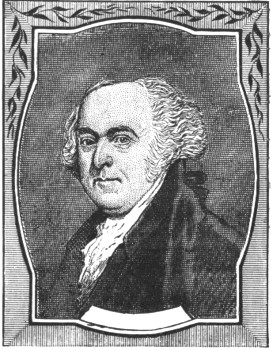 JOHN ADAMS, OF MASSACHUSETTS, WHO PROPOSED WASHINGTON FOR
COMMANDER-IN-CHIEF OF THE CONTINENTAL ARMY.
JOHN ADAMS, OF MASSACHUSETTS, WHO PROPOSED WASHINGTON FOR
COMMANDER-IN-CHIEF OF THE CONTINENTAL ARMY.
A committee, of which Washington was one, was appointed to report a plan for an army of Virginia.
But when people make up their minds to fight, they know very well, if they are sensible, that more than half the task before them is to find means for feeding and clothing not only the troops but the people who are dependent on the troops. Therefore the convention appointed another committee, of which Washington also was a member,[Pg 512] to devise a plan for encouraging manufactures, so that the people could do without England. Heretofore, the Virginians had done scarcely any manufacturing; nearly everything they needed they had bought from England with tobacco. But if they were to be at war with England, they must be making ready to provide for themselves. It was late in the day to do anything; slavery, though they did not then see it clearly, had made a variety of industries impossible. However, the people were advised to form associations to promote the raising of wool, cotton, flax, and hemp, and to encourage the use of home manufactures.
Washington was again chosen one of the delegates to the Continental Congress, for the second Congress had been called to meet at Philadelphia. He was even readier to go than before. On the day when he was chosen, he wrote to his brother John Augustine Washington: "It is my full intention to devote my life and fortune to the cause we are engaged in, if needful."
That was at the end of March. The second Continental Congress was to meet on May 10; and just before Washington left Mount Vernon came the news of Lexington and Concord. Curiously enough, the Governor of Virginia had done just what Governor Gage had attempted to do; he had seized some powder which was stored at Fredericksburg, and placed it for safety on board a vessel of the British navy. The independent companies at once met and called upon Washington to take command of them, that they might compel the Governor to restore the powder. Washington kept cool. The Governor promised to restore the powder, and Washington advised the people to wait to see what Congress would do.
When Congress met, the men who came together were no longer strangers to one another. They had parted warm friends the previous fall; they had gone to their several homes and now had come back more determined than ever, and more united. Every one spoke of Lexington and Concord; and the Massachusetts men told how large an army had already gathered around Boston. But it was an army made up not only of Massachusetts men, but of men from Connecticut, Rhode Island and New Hampshire. It was plain that there must be some authority over such an army, and the Provincial Congress of Massachusetts wrote to the Continental Congress at Philadelphia, advising that body to assume control of all the forces, to raise a continental army, appoint a commander, and do whatever else was necessary to prepare for war. There had already been fighting; there was an army; and it was no longer a war between Massachusetts and Great Britain.
I do not know what other delegates to the Congress at Philadelphia came as soldiers, but there was one tall Virginian present who wore his military coat; and when the talk fell upon appointing a commander, all eyes were turned toward him. Every one, however, felt the gravity and delicacy of the situation. Here was an army adopted by Congress; but it was a New England army, and if the struggle were to come at Boston, it was natural that the troops should mainly come from that neighborhood. The colonies were widely separated; they had not acted much together. Would it not be better, would it not save ill-feeling, if a New England man were to command this New England army?
There were some who thought thus; and besides, there was still a good deal of difference of opinion as to the course to be pursued. Some were all ready for independence; others, and perhaps the most, hoped to bring the British to terms. Parties were rising in Congress; petty jealousies were showing themselves, when suddenly John Adams, of Massachusetts, seeing into what perplexities they were drifting, came forward with a distinct proposition that Congress should adopt the army before Boston and appoint a commander. He did not name Washington, but described him as a certain gentleman from Virginia "who could unite the cordial exertions of all the colonies better than any other person." No one doubted who was meant, and Washington, confused and agitated, left the room at once.
Nothing else was now talked of. The delegates discussed the matter in groups and small circles, and a few days afterward a Maryland delegate formally nominated George Washington to be Commander-in-Chief of the American Army. He was unanimously elected, but the honor of bringing him distinctly before the Congress belongs to John Adams. It seems now a very natural thing to do, but really it was something which required wisdom and courage. When one sums up all Washington's military experience at this time, it was not great, or such as to point him out as unmistakably the leader of the American army. There was a general then in command at Cambridge, who had seen more of war than Washington had. But Washington was the leading military man in Virginia, and it was for this reason that John Adams, as a New England man, urged his election. The Congress had done something to bring the colonies together; the war was to do more, but probably no single act really had a more far-reaching significance in making the Union, than the act of nominating the Virginian Washington by the New England Adams.
[D] The above illustration is reproduced from Irving's "Life of Washington," by kind permission of Messrs. G. P. Putnam's Sons.
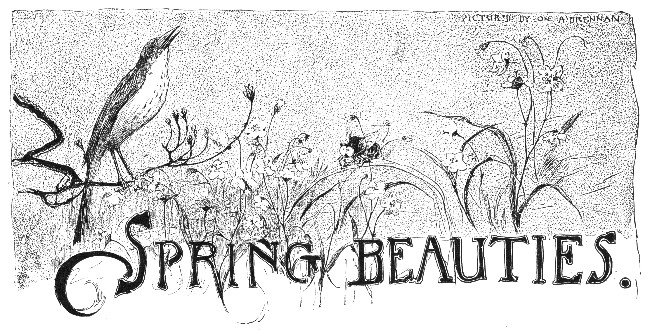
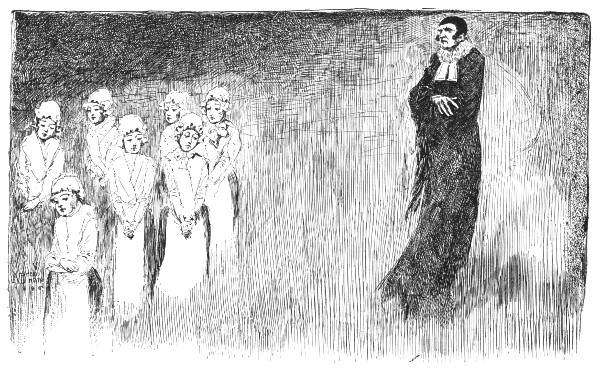
Conrad was not a prince, not even a lord; he was only an ordinary boy. He should have been on his way to school; but, having a talent for doing nothing, he was wandering about the fields and little strips of woodland, amusing himself by watching the birds skim through the air. He had lately been reading a volume of fairy-tales, and as he walked along he began to wonder whether there really was a bit of truth in any of them.
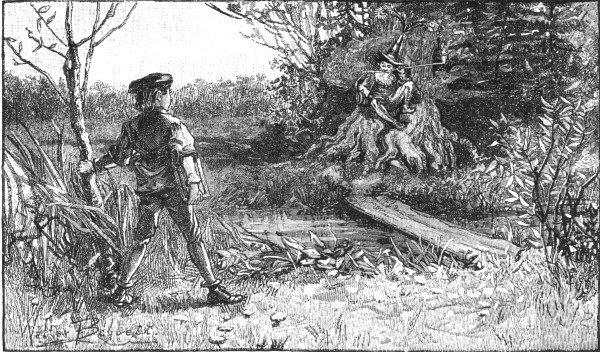 "HE BECKONED TO CONRAD, WHO CROSSED THE STREAM ON A
SLIGHT PLANK BRIDGE."
"HE BECKONED TO CONRAD, WHO CROSSED THE STREAM ON A
SLIGHT PLANK BRIDGE."
He kept on thinking so intently about it, that he did not notice how near he was to a little brook, until he found himself almost on the point of tumbling into the water. This put a stop to his wondering, for the next moment he stood staring in astonishment, not at the water, but at a little old man who was sitting on the roots of a large tree that grew on the opposite bank of the stream. He was dressed in a very curious fashion. On his head he had a tall steeple-crowned hat, in which were placed two long peacock's feathers.
The little old man sat looking very attentively at Conrad, and seemed to derive a great deal of comfort from a long pipe, which he was enjoying so energetically that all around him the air was filled with smoke. At last he beckoned to Conrad, who crossed the stream on a slight plank bridge, and advanced toward him.
By that time, Conrad had leaped to the conclusion, in his own mind, that the very queer-looking old gentleman was an enchanter, and so he had resolved to be very respectful, to do just as he was bidden, and to wait very patiently for the little old man to speak first.
Presently the little old man shifted the pipe for a moment, and asked:
"What are those books that you are carrying?"
"They are my school-books," said Conrad; "but I am tired of going to school, and I wish to go with the fairies!"
The little old man smiled a benevolent smile, and exclaimed: "Oh!" Then he shifted his pipe again, and said quickly:
"Give me the school-books."
Conrad did so, at once.
The little old man then opened a spelling-book, and turned to the fly-leaf.
"Conrad," said he.
Conrad started, for he wondered how the little man had learned his name. He himself had not once mentioned it. He was sure now that the queer little person was an enchanter.
"So, Conrad," said the little old man again, "you wish to go to the fairies, do you? Well, you may go; but you must leave your books with me until you come back."
Conrad's attention was now attracted by a raven, which he saw standing beside the enchanter, and which he had not noticed before.
Turning to the bird, the enchanter said: "Give me my key."[Pg 515]
The raven hopped from a large key upon which it had been standing, and taking it in its beak, presented it to its master.
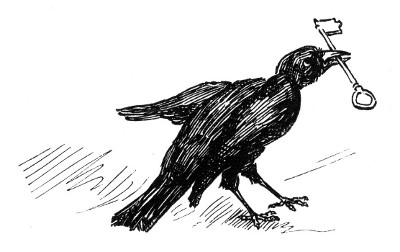
Conrad wished to ask if the raven would bite, and whether it could do any better trick than carrying a key; but he thought this might be considered an impertinent question, so he said nothing.
"Take this key," said the little old man, "and be careful not to lose it. Walk on until you come to the edge of yonder forest; pass straight through the wood, and when you arrive at the other side, you will behold a castle not far distant. You may find it difficult to gain admission; but you must persevere. As to what will happen afterward, I may not tell you now. One word more, and then begone; should you ever need my assistance, blow down the key."
Conrad was so astonished at all he had seen and heard, that he hardly knew what to do; but as the little old man pointed in the direction of the forest, Conrad bade him good-day, and walked away to follow the orders he had received.
He kept on until he came to the forest, which he entered. It seemed so quiet and dark, that he would have been frightened, had he not remembered that, in case of danger, he could depend on assistance from the enchanter.
At last he reached the end of the wood, and about a mile beyond, he saw the castle with its gilded dome and all its windows shining in the sunlight. This sight cheered him, and he walked on till he came to the gateway. He found the great gates wide open; and no one prevented his entering, as it happened to be a day on which the King received petitions from those of his subjects who wished to present any.
He passed on through the large court-yard, key in hand, and instead of going in at the entrance to the court, he entered a little side door and ascended a winding stairway. Up he went, higher and higher, till it seemed as if the stairway would never end, when suddenly he came face to face with an official who was descending.
"What business have you here?" asked the officer.
Conrad could not answer; so the man gently took hold of his ear and led him down the stairs again, varying the monotony of the long descent by giving the ear a severe pinch at every seventh step. Out through the court-yard they passed, the bystanders all cheering and laughing; out of the gate again; and with one final pinch, the boy was left sobbing on the roadway.
Poor Conrad had, indeed, found it difficult to gain admission to the castle. Drying his tears, however, he began to walk around the outside of the building, until at last he came to a ladder that was leaning against a window.
"The very thing!" said he; "it must have been left here on purpose for me."
Up he climbed, slipped in at the window, and dropped quietly to the floor.
He found himself in a large hall, through which he walked until he came to an archway at the farther end. Before the archway hung an embroidered curtain. Conrad pushed it aside, and entered a richly decorated room, at the end of which stood a throne. Around it were assembled many nobles, pages, and guards, who were awaiting the return of the King from hunting.
Few of them looked at Conrad. Some seemed to cast a scornful side-glance at him, and one even told him to go back by the way he had come. Conrad was not a whit daunted, however, and boldly holding up his key, so that every one could see it, he walked up to a portly-looking gentleman, who was dressed in black velvet and who wore a golden chain around his neck. Conrad asked him what he was to do. The portly gentleman stared at him. Conrad asked if any of the company were enchanted; "because," said he, "if they are, I'll disenchant them with my key."
"Enchanted?" said the gentleman in black. "What do you mean? Why do you bother me about enchantment?"
Conrad began to feel a little nervous, and to think that they did not seem at all like enchanted folk; at least, they did not act like any he had read about in his books.
The enchanter had told him that he would meet with difficulties, but, despite his confidence, he could not help getting very red in the face. And by this time, all the gentlemen, except the one dressed in black, were smiling.
Suddenly, Conrad remembered what the little old man had said about whistling down the key. Happy thought! He at once rushed up in front of the portly gentleman with the black velvet suit and the golden chain, and began to whistle in the key as hard as he could.
But, at this performance, the nobles all stopped smiling and looked first at one another, and then at Conrad, with very grave faces; one even put his hand upon his sword.[Pg 516]
Now, it happened that the gentleman in black velvet was a Grand Duke and the Prime Minister of the kingdom. At that moment he was thinking over some important question of state, and the sight of Conrad whistling and capering in front of him, just as he was settling everything to his own satisfaction, made him so angry, that he stopped and stared at Conrad, as if he could have stepped upon him. Conrad kept on whistling, but the little enchanter did not come. "He must either be ill or very deaf," thought Conrad, and he was just making up his mind that something was wrong, when all doubts on the subject were removed by the Grand Duke, who advanced toward him, picked him up by the collar of his jacket, and, carrying him to a window, quietly dropped him out.
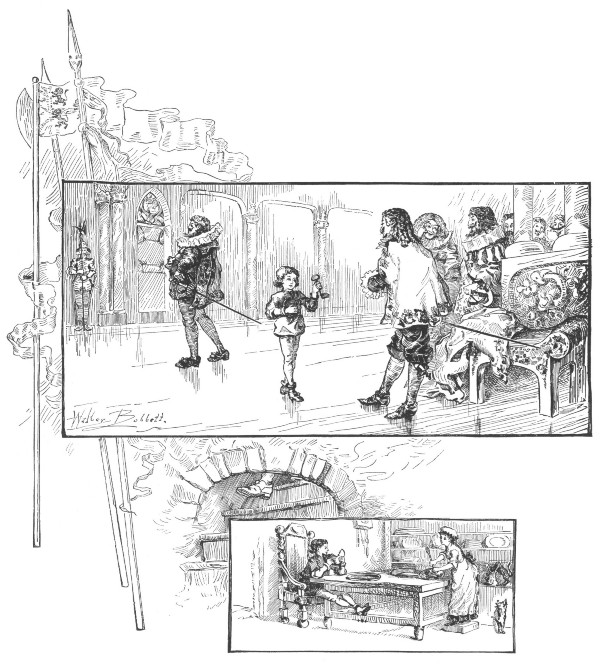
Poor Conrad was very much shaken by his fall, and for a time was so dazed that he could hardly realize what had happened. In a little while, he began to collect his thoughts; but as he picked himself up, he concluded, notwithstanding the difficulties he had encountered, that he would try once more to gain admission to the castle. So he arose and walked toward a door which he saw a few paces distant.
His key fitted the lock perfectly. He pushed aside a sliding door, walked in, and passed down a stairway, when he found himself in a dark cellar. The floor was strewn with boxes and small barrels, over which he stumbled, breaking some bottles that stood in his way. He began to feel frightened, so he climbed to the top of a barrel, in order to get a glimpse of his position and see if he could find his way out to daylight. Suddenly the barrel-head gave way, and before he had time to jump off, Conrad fell, up to his knees, in some soft powder. He struggled to free himself, but only upset the barrel and covered himself from head to foot with flour or fine meal. At last he called for assistance; and a door, that he had not noticed until then, opened, and a girl of about his own age came into the cellar, and asked what was the matter.
"I've tumbled into something; please come and help me out," cried Conrad.
She hurried to him, and with her aid he at last succeeded in freeing himself.
After brushing the dust from his hair and[Pg 517] his clothes, he followed where his new friend led the way, and entered a kitchen, thinking that without doubt he was now in the presence of an enchanted princess, who must have been waiting many years for some one to disenchant her. "To be sure," thought he, "I am not a prince; but then that does not so much matter; there is no telling but I may be one, some day;" so he decided to ask the maiden how she had become enchanted.
"Beautiful Princess," exclaimed he,——and he was just attempting a very fine speech in the best fairy-story manner, when the young girl laughed, and told him to be seated, and asked him if he would like to have a pie. Conrad was astonished by this question from an enchanted princess; but, without waiting for his reply, the girl walked toward a table on which stood a number of mince-pies, and, taking up one of them, she placed it before Conrad.
That was not the way in which an enchanted princess was supposed to act; but as Conrad was very hungry, he did not express his surprise, but turned his attention to the pie. While he was eating, the princess busied herself with beating some eggs in a large bowl, and before he knew it, Conrad found that he had eaten all the pie.
Then they talked about the weather and whatever else they happened to think of; and at last, Conrad asked her how long she had been enchanted.
"What!" exclaimed the princess.
He repeated his question.
"Why, what do you mean?" said she.
He was just about explaining, when "tramp, tramp, tramp!"—the noise of feet was heard coming down the stairs. The princess jumped up, and cried:
"Oh, run! Run quickly! I shall be punished if they find that I have given you a pie!"
"Oh, no," said Conrad; "do not be frightened! I will protect you from them. I came to this castle on purpose to rescue you."
"But I do not want to be rescued!" said she. "Do go, at once!"
Tramp, tramp! Nearer and nearer came the sound,—almost to the bottom of the stairs. Conrad felt for his key.
"Oh, dear!" he exclaimed, "I must have lost my key when I fell into the barrel! I never noticed that I was without it till now. All is lost! Adieu, good Princess!"
"Good-bye," said she; "only go!"
He jumped upon a table, and climbed out of the window. It was all that was left for him to do. After he was outside of the building, he turned, and waving his hand to the princess, begged her to remember him.
"I will come back to you, if I ever get my key again," he said; "and then I'll disenchant you."
At that moment the kitchen door opened, and Conrad saw a great light. It might have been a bull's-eye lantern, but Conrad was sure that it was a dragon that was pointing its fiery eye at him.
"Oh, the poor princess!" said he. "If only I had my key!"
Then, as the light flashed full at him, he became so frightened that he turned and ran for the gate as hard as he could. He made his way across the court-yard much faster than when he had come in, and soon he had left the castle far behind. The houses began to be farther apart and to have a more rustic appearance. He heard a cart coming along the road.
"Please give me a ride!" he cried to the driver.
"Yes, I will," said the man; "jump in." And Conrad clambered into the cart.
"You look tired," said the driver. "Lie down on that blanket and rest yourself."
Conrad gladly did as he was told and, feeling much fatigued after his adventures, he was soon fast asleep.
He did not awake until he felt himself carried out of the cart, and was just enough awake to know that all the inmates of his father's house, together with a few of the neighbors, were crowding about and asking him where he had been. And that was all he noticed, for the next moment he was off to sleep again, and was carried upstairs and put to bed.
He did not feel very well the next morning, so the doctor was called in, who advised that he should remain in the house for a few days, as he had a slight fever.
While at home, he told his aunt what had happened to him; but she only patted his head, and told him that he must have been dreaming. But this Conrad refused to believe.
When he recovered, however, he became a much better boy, more quiet and attentive to his studies; and it may be mentioned that, whenever any one told a fairy-tale, he wore a very solemn face, took a back seat, and said nothing.
It is not known whether he still believes in fairies; but one thing is certain—he never saw the little old enchanter again, nor the school-books that he had left with him.
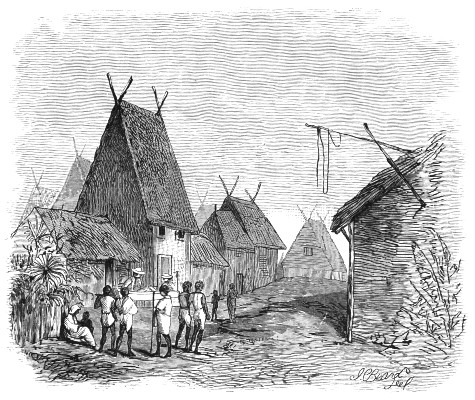
Early one morning, a palanquin carried by native bearers, and containing as passengers Mr. Steedman, an English missionary, and his little son Harry, was proceeding up the one street of Biforána, a queer little bamboo village on the island of Madagascar, situated about midway between Antananarivo, the capital, and the eastern coast.
Comparatively little is known of Madagascar, although the unsuccessful attempt of France to obtain possession of it drew interest and attention to it not many months ago. There are but two larger islands in the world. As many of you know, it lies some two hundred and fifty miles to the east of the African coast, is nine hundred and[Pg 519] eighty miles long and two hundred and fifty wide, and is therefore nearly four times as large as England and Wales combined.
The Queen of this island kingdom is a young woman with the curious name of Rasendranovo Ranavalo III. She succeeded to the throne in 1883. She is a Christian, as is also a large part of the population of her realm; and there are numerous missionary stations throughout the island.
Harry Steedman's father was one of these missionaries, and Harry himself was accustomed to traveling by palanquin, since there are no roads nor carriages to be found in Madagascar.
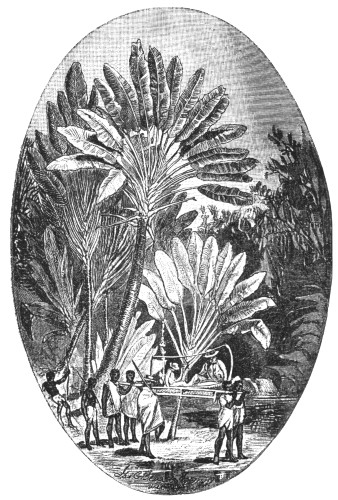 "PASSING A GROVE OF PALMS KNOWN AS THE 'TRAVELER'S
TREE.'"
"PASSING A GROVE OF PALMS KNOWN AS THE 'TRAVELER'S
TREE.'"
The palanquin was an oblong basket of bamboo, lined with plaited sheepskin. The ends of the long poles or handles rested upon the shoulders of four Madagascan bearers, while four others accompanied these as a relay. Under the palanquin hood of woven palm-cloth, Mr. Steedman reclined comfortably, while Harry nestled cozily at his feet; and so, out of the village, and through the swamp of Biforána, the procession moved until the mire became so thick that the palanquin could not be carried with ease. As the next best mode of conveyance, the two passengers were then transferred to the shoulders of two stout natives.
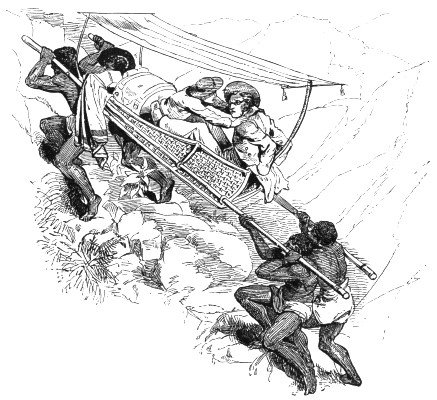 PALANQUIN TRAVELING BECOMES UNCOMFORTABLE.
PALANQUIN TRAVELING BECOMES UNCOMFORTABLE.
Mr. Steedman had started upon an expedition in search of the beautiful lace-leaf plant, or water-yam, of Madagascar, which he was told grew in the forests beyond Biforána, and which he was very desirous of finding in its native state. Harry, after urgent solicitation, had been allowed to accompany his father; but, as he clung to the neck of his swarthy bearer, the little fellow found that there was not, after all, so much fun in the trip as he had expected. And later on, when the palanquin, in which they were soon seated again, was tossed and bumped by the slipping and stumbling of the bearers as they climbed a very steep hill-side, he began almost to wish himself at home.
After passing a grove of the stately palms known as the "traveler's tree," they found themselves on a path that led to the bank of a river. They endeavored to ford it, but speedily found that the danger from deep holes and ugly-looking crocodiles was too great for them to proceed. So Raheh, the chief bearer, uttered a curious cry, or signal, which soon brought into view a làkana, or canoe, rudely fashioned from a hollow tree-trunk; and in it a native was paddling rapidly toward them.
Harry and his father stepped into the rather shaky-looking craft not without misgivings, but[Pg 520] they were soon safely landed on the other shore. When all had been thus ferried across and the native boatman had been paid, the party entered the great forest of Alamazaotra, which covers more than forty miles of wild and mountainous country.
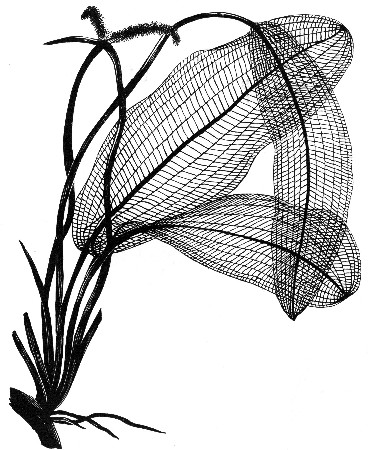 THE LACE-LEAF OF MADAGASCAR.
THE LACE-LEAF OF MADAGASCAR.
Their path at once led them through a gorge so narrow that the sides of the palanquin grazed the rocky walls, and the masses of tangled foliage, meeting far above their heads, almost entirely obscured the light. The bearers paused for breath after climbing the steep ascent that led from this gloomy pass, and Harry and his father exclaimed in wonder at the strange beauty of the wild tropical forest.
Gigantic palms upheld around their stately heads a leafy dome closely interlaced by clinging vines. Long garlands of moss and climbing plants crossed and recrossed this lofty roof, and from its shadowy arches great masses of gray moss hung suspended. Here and there among the cool green and gray tints of leaves and moss some tropical flowers and fruits gleamed forth in bright flashes of scarlet and gold.
Myriads of frail wood-blossoms hid their pale heads under the feathery ferns that clustered about the roots of the trees, and the dead palms were tenderly shrouded in waxy-leaved climbing vines, their graceful fallen crowns replaced by masses of green ferns, intermingled with the faint pink and blue tints of some rare orchid. On every side were little groves of bamboo,—their light-green fringes contrasting with the darker fronds of the stately tree-fern.
Absolute silence reigned throughout this solitude, and Harry began to be so oppressed by the stillness as to grow fearful of danger. But his father explained that during the wet season, in which they were traveling, insect life in these tropical forests is asleep, and Harry himself knew that there were but few wild animals in Madagascar. Indeed, with the exception of that curious animal, part fox, part squirrel, and part monkey, that is peculiar to Madagascar and is called, from its prowling habits and ghostly appearance, the lemur, or "ghostly visitor," the great island possesses no large native quadrupeds. The hump-backed African cattle and the singular fat-tailed sheep, now common throughout the island, were not originally found in Madagascar, but were taken over from Africa.
The bearers of the palanquin clambered on, now over steep and moss-covered rocks, now crossing sluggish streams on slippery stepping-stones, or sliding down precipices, until poor Harry was so rattled and shaken and tossed and tumbled that he declared he didn't know his head from his heels.
But, at last, a break occurred in the long stretch of rock and forest, and as the bearers paused upon a piece of level ground, for a moment's rest, Raheh suddenly uttered the joyful cry of "rano!" (water)[Pg 521] and all, on listening, distinguished the sound of a rushing stream.
Urged on by Raheh, the bearers pushed ahead, and soon stood upon the banks of a beautiful river, dashing merrily along over rocks and fallen trees, until with a leap it disappeared in the shadows of the vast forest. Upon the farther side was grouped a little village of the clay huts belonging to the friendly Hovas, and beyond the village stretched green fields of waving rice. The "Hovas" are the governing race in the island, and are the most civilized. Their capital city of Antananarivo, in the center of the island, is a well-built city of over 100,000 inhabitants.
A tree had fallen across the stream, with its head resting upon the opposite bank, and this natural bridge was entirely covered with pink, blue, and white flowers of the waxy orchid. This beautiful sight, however, was unnoticed by Harry and his father, for in the water at their feet was the object of their search, the Lattice or Lace leaf.
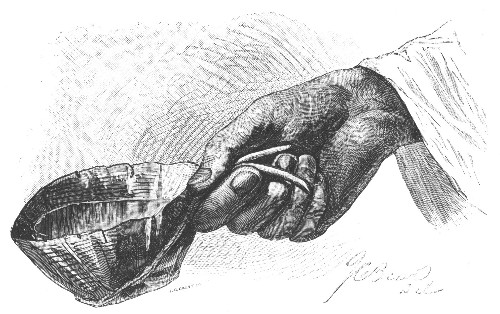 MADAGASCAN DRINKING-CUP FORMED FROM A LEAF OF THE
"TRAVELER'S TREE."
MADAGASCAN DRINKING-CUP FORMED FROM A LEAF OF THE
"TRAVELER'S TREE."
The lace-leaf plant, or fresh-water yam as it is sometimes called because of its potato-shaped or yam-like root, is found in many of the rivers of Madagascar. The difficulty of obtaining it, however, makes it a rare plant to Europeans; and when, a few days before, Mr. Steedman had recognized in some "roasted potatoes," as Harry called the pleasant-tasting vegetable that one of his boyish Madagascan friends had given him to eat, the edible root of the lace-leaf plant, the missionary had determined to make a careful search for the plant so prized by naturalists. And now at last he had found it, bobbing backward and forward in a fantastic dance just above the eddying waters of the beautiful forest river. As soon as they recognized it, both Mr. Steedman and his son were on the ground in an instant, and bending eagerly above the clear stream. The water was so pure and limpid that every pebble could be counted, and in the cool, bright current they saw, to their delight, a perfect labyrinth of lace-work. Dozens of lace-leaves, green, gold, olive, and brown, were floating just beneath the surface of the water.
"Oh, Papa! did you ever see anything so lovely?" said Harry, excitedly.
Mr. Steedman could take but a one-sided view of those wonderful leaves, as one glass from his spectacles had been lost during their rough journey; but the remaining glass fairly sparkled with satisfaction.
"Ah, my son, this plant is both lovely and rare. See, the young leaves are light green and yellow; the older leaves are darker,—shades of green and olive. A few are even black, and all growing from the same root. How perfect is every leaf, in spite of its delicate texture! Some of those larger leaves must be ten or twelve inches long. The strong midrib in each serves as a support for the fragile threads forming the meshes on each side."
Harry now plunged his hand into the lace-like web, half expecting it to dissolve in his grasp. But no! The wiry little yellow leaf which he raised from the water, was perfect in form, and a gleam of sunlight, falling upon the shining meshes, transformed them into threads of glistening gold.
He now discovered, as he examined them carefully, that the under surfaces of the leaves, were glistening with little pearly bubbles of air.[Pg 522]
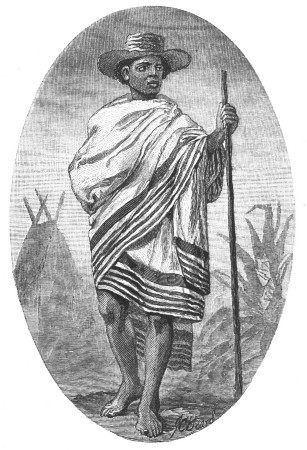 RAHEH, THE GUIDE.
RAHEH, THE GUIDE.
"Oh, Papa," he cried, joyously holding the glistening meshes aloft, "the lace-leaves are jeweled!"
"Yes, Harry," said his father, "those diamond drops are made by the breathing of the plant."
Mr. Steedman attempted to detach a root of one of the plants from its bed of mud, but the little tendrils branching from it on every side held the root firmly in its place. At last he succeeded in extricating the little white threads, one by one, and removed the entire plant to the bank. Its root, which is eaten in Madagascar, was very like the ginger root, and had a tough, light-brown skin.
Harry carefully placed the leaves of the plant in his herbarium, while his father packed the root, with its native soil, in a tin case, preparatory to sending it to the Botanical Society in London.
"Harry," he said, as they finished their work, "this plant could be easily reared in our green-houses—heat and moisture being all that is required. But nature seems to have jealously surrounded these beautiful leaves with almost impassable barriers, and the lace-plant is comparatively unknown.
"But come, my boy Raheh says 'maly-massandro' (the sun is dead), and it will be as long as 'two cookings of rice' (two half hours) before we can be ferried across to yonder village and secure a place to pass the night."
And so, after Raheh had given Harry one last drink from the clear, cool river, in the odd-looking leaf-cup he carried for the purpose, the tired but successful lace-leaf hunters crossed over to the Hova village and were soon fast asleep.
One of the most remarkable plants in the whole vegetable kingdom is that known to botanists as the Justicia Picta, which has also been well named "The Caricature Plant."
At first sight, it appears to be a heavy, large-leafed plant, with purple blossoms, chiefly remarkable for the light-yellow centers of its dark-green leaves, which cause them to look as if some acid had been spilled upon them and taken the color out wherever it had touched.
As I stood looking at this odd plant and thinking what a sickly, blighted appearance the queer, yellow stains gave it, I was suddenly impressed with the fact that the plant was "making faces" at me. Still, unaccustomed as I was to seeing plants indulge in this strictly human amusement, I was slow to believe it, and stooped to read the somewhat illegible inscription on the card below the plant—"Justicia Picta, or 'Caricature Plant.'" My first impression was correct then. This curious shrub had indeed occupied itself in growing up in ridiculous caricatures of the "human face divine," until it now stood, covered from the topmost leaf down, with the queerest faces imaginable. Nature had taken to caricaturing. The flesh-colored profiles stood out in strong relief against the dark-green of the leaves.
A discovery of one of these vegetable marks leads to an examination of a second and a third leaf, until all are scanned as closely and curiously as the[Pg 523] leaves of the comic papers that form the caricature plants of the literary kingdom.
What a valuable plant this would be for one of our professional caricaturists to have growing in his conservatory! When an order was sent to him for a "speaking likeness" of some unhappy politician, he could simply visit his Justicia Picta with pencil and paper in hand, and look over the leaves for a suitable squint, grin, or distorted nose to sketch from. He could, moreover, affirm with truth that the portrait was "taken from nature." Cuthbert Collingwood, the celebrated naturalist, says of the Justicia Picta: "One of these plants in the garden of Gustave Doré would be worth a fortune to him, supplying him with a never-failing fund of grotesque physiognomies, from which he might illustrate every serio-comic romance ever written." I have never heard of the cultivation of the Caricature Plant in this country; but botanists tell us that it is a hardy shrub. I think we should be glad to see the funny faces on its leaves. After all the lovely flowers we are called upon to admire, I am sure that a plant evidently intended to make us laugh would receive a warm welcome from our young people.
The Chinese appreciate the Caricature Plant, and in some parts of China it is quite extensively cultivated. Perhaps some of the funny, grinning faces on Chinese toys and ornaments are reproductions of the grotesque features on the leaves of the plant.
Finally, I must assure any unbelieving readers of St. Nicholas that neither in this account of a very remarkable plant, nor in the accompanying illustration, has the writer drawn upon imagination.
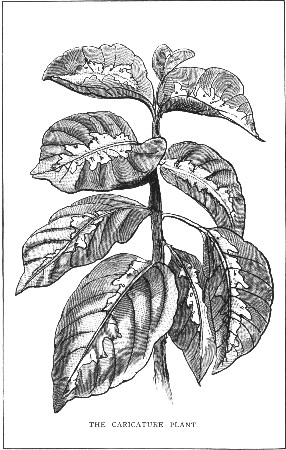 THE CARICATURE PLANT.
THE CARICATURE PLANT.
The Justicia Picta really exists. It is a native of the East Indies, and is a source of much amusement and curiosity to both botanists and travelers.
About two hundred years ago the governor of the island of Jamaica, Sir Thomas Lynch, sent to King Charles II. of England a vegetable necktie, and a very good necktie it was, although it had grown on a tree and had not been altered since it was taken from the tree. It was as soft and white and delicate as lace, and it is not surprising that the King should have expressed his doubts when he was told that the beautiful fabric had grown on a tree in almost the exact condition in which he saw it. It had been stretched a little, and that was all.
But if King Charles was astonished to learn that neckties grew on trees in Jamaica, what must have been the feelings of a stranger traveling in Central America, on being told that mosquito-nets grew on trees in that country? He had complained to his host that the mosquitoes had nearly eaten him up the night before, and had been told in response that he should have a new netting put over his bed.
Satisfied with this statement, the traveler was turning away, but his attention was arrested by his host's calmly continuing, "in fact, we are going[Pg 524] to strip a tree anyhow, because there is to be a wedding on the estate, and we wish to have a dress ready for the bride."
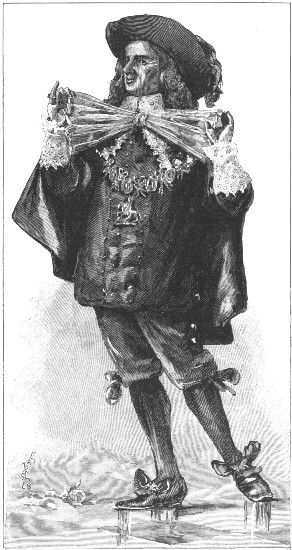 KING CHARLES'S VEGETABLE NECKTIE.
KING CHARLES'S VEGETABLE NECKTIE.
"You don't mean," said the traveler incredulously, "that mosquito-netting and bridal dresses grow on trees, do you?"
"That is just what I mean," replied his host.
"All right," said the stranger, who fancied a joke was being attempted at his expense, "let me see you gather the fruit and I will believe you."
"Certainly," was the answer; "follow the men, and you will see that I speak the exact truth."
Still looking for some jest, the stranger followed the two men who were to pluck the singular fruit, and stood by when they stopped at a rather small tree, bearing thick, glossy-green leaves, but nothing else which the utmost effort of the imagination could convert into the netting or the wedding garments. The tree was about twenty feet high and six inches in diameter, and its bark looked much like that of a birch-tree.
"Is this the tree?" asked the stranger.
"Yes, señor," answered one of the men, with a smile.
"I don't see the mosquito-netting nor the wedding-dress," said the stranger, "and I can't see any joke either."
"If the señor will wait a few minutes he will see all that was promised, and more too," was the reply. "He will see that this tree can bear not only mosquito-netting and wedding-dresses, but fish-nets and neck-scarfs, mourning crape or bridal veils."
The tree was without more ado cut down. Three strips of bark, each about six inches wide and eight feet long, were taken from the trunk and thrown into a stream of water. Then each man took a strip while it was still in the water, and with the point of his knife separated a thin layer of the inner bark from one end of the strip. This layer was then taken in the fingers and gently pulled, whereupon it came away in an even sheet of the entire width and length of the strip of bark. Twelve sheets were thus taken from each strip of bark, and thrown into the water.
A light broke in upon the stranger's mind.[Pg 525] Without a doubt these strips were to be sewn together into one sheet. The plan seemed a good one and the fabric thus formed might do, he thought, if no better cloth could be had.
The men were not through yet, however, for when each strip of bark had yielded its twelve sheets, each sheet was taken from the water and gradually stretched sidewise. The spectator could hardly believe his eyes. The sheet broadened and broadened until from a close piece of material six inches wide, it became a filmy cloud of delicate lace, over three feet in width. The astonished gentleman was forced to confess that no human-made loom ever turned out lace which could surpass in snowy whiteness and gossamer-like delicacy that product of nature.
The natural lace is not so regular in formation as the material called illusion, so much worn by ladies in summer; but it is as soft and white, and will bear washing, which is not true of illusion. In Jamaica and Central America, this wonderful lace is put to all the uses mentioned by the native to our traveler, and to more uses besides. In fact, among the poorer people it supplies the place of manufactured cloth, which they can not afford to buy; and the wealthier classes do not by any means scorn it for ornamental use.
Long before the white man found his way to this part of the world, the Indians had known and used this vegetable cloth; so that what was so new and wonderful to King Charles and Governor Sir Thomas Lynch was an old story to the natives. Some time after King Charles received his vegetable necktie, Sir Hans Sloane, whose art-collection and library were the foundation of the British Museum, visited Jamaica. He described the tree fully, and was the first person who told the civilized world about it. The tree is commonly called the lace-bark tree. Its botanical name is Lagetto lintearia.
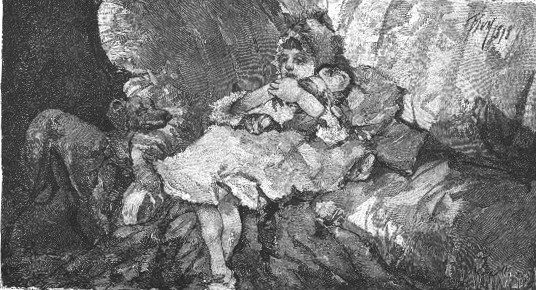 THE PET GREYHOUND RESOLVES INDIGNANTLY THAT THE JAPANESE
"MUST GO!"
THE PET GREYHOUND RESOLVES INDIGNANTLY THAT THE JAPANESE
"MUST GO!"
One cold winter night, not long ago, I took pity on a poor little dejected-looking yellow puppy, and invited him into my house. Having once taken him in, it was quite out of the question to think of turning him out again. I was not afraid that I might be robbing anybody, for he was the kind of dog that very few persons care to have. He was dirty-yellow in color, very lank of body, and he seemed to be made up of ill-assorted parts of different kinds of dogs. His legs, particularly, seemed intended for some other dog and acted as if they never would become reconciled to carrying the queer body to which they were joined.
I should have preferred a handsome dog, but since I had no choice, I determined to do my duty by the little outcast, and to give him such an education that in the beauties of his mind the ugliness of his body would be overlooked.
The first thing needed for him was a name; and I tried to think of something appropriate, but soon gave it up, and in default of a better title called him Bob. To teach him the name was easy. I merely called out the word "Bob!" every time I fed him. As it was important that he should learn to look to me as the source of all his happiness and instruction, I permitted no one else to feed him. It took him about a week to learn his name, and to recognize the fact that all the blandishments he could lavish on the cook would be of no avail, and that his only hope was in me.
At the very outset, I had made up my mind that under no circumstances should he receive angry words or blows. He was a broken-spirited, affectionate little puppy, and I was resolved that if there was no way of teaching him except by brutality, he should remain ignorant all his life. The abject way in which, to this day, he runs from a child makes me feel sad. I fancy that much of his early life was spent in dodging stones or snow-balls thrown by boys—not cruel, but thoughtless boys.
It was necessary to control him, and I quickly discovered an easy way. He was such a sensitive little fellow that when he once learned to love me, he seemed to know by the tones of my voice whether I was pleased with him, and to have me pleased seemed to be the one object of his life. Therefore, if I saw him doing anything wrong, I had only to say sharply and firmly, "No, Bob!" and down would go the tail and ears, and he would slink shame-facedly to his special corner and from there watch me until I would call him to me and pat his head.
After a while, a quiet "No, Bob!" would effect the same result. This was a great victory, and made most of the subsequent teaching merely a matter of patience.
The first real lesson was when I undertook to make him sit up. If he had only known what I wished him to do, he would gladly have done it; but the words "Sit up!" meant nothing to him. He was almost too willing, for when I took hold of him to put him into a sitting position, he became as limp as a wet rag, and seemed to be trying to put himself into a condition to be twisted into any shape I chose.
Then I put him into a corner and set him up, saying continually, "Sit up! Sit up!" I held him up for a while and then took my hand away, but at once he collapsed as if all the stiffening had suddenly left his back-bone. Then I showed him a piece of sugar, of which he was very fond, and immediately he was himself again. Once more, and many times more, I put him in position in the corner, until at last, seemingly by accident, he failed to fall over when I took my hand away. I did not tax his endurance, but at once gave him the sugar.
It took him about three days to grasp the idea that "sit up!" meant a special performance, and that to achieve it meant a lump of sugar. Then I put him through the same process in the middle of the room. He missed the support of the wall at first, and fell over; whereupon he looked foolish. One fact was evidently firmly fixed in his mind, however,—the fact that there was sugar to be had if only he could do as I wished him to do. All the time that he was struggling for balance, he kept his eye on the lump of sugar, which I had on the floor beside me. Finally that lesson was learned, and he could sit up if I would put him in position. He knew, too, what "sit up!" meant.
After that, I would not feed him until he had first sat up; but it was a long time before he gained sufficient confidence in himself to sit up without help. At first I helped him up by both paws; then I helped by holding only one paw; then I merely touched one paw; then I only motioned, as if about to touch the paw; and finally I simply said, "Sit up!"
I think Bob reasoned this all out in his own mind and concluded that there must be some strange and beautiful power in the words "sit[Pg 527] up!" for he could see that whenever he did it, he had something to eat. I am obliged to confess that Bob loved to eat; and after he had learned to sit up, he was inclined to perform the feat morning, noon, and night, and it was, of course, impossible to make him go away without first giving him a morsel, however small, of food.
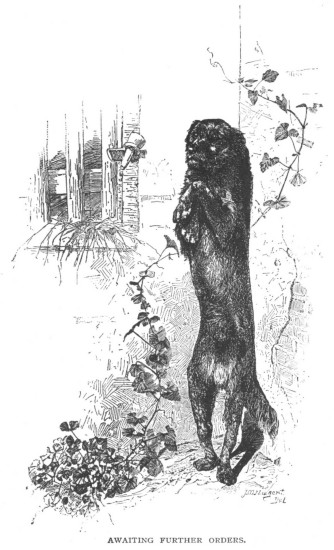 AWAITING FURTHER ORDERS.
AWAITING FURTHER ORDERS.
Lessons in standing up, walking and waltzing followed, and they were all easily taught. In teaching him anything, I was always careful to associate the action required of him with certain words. Standing, walking on his hind legs, and waltzing were always "stand up!" "walk!" "waltz about!" I never taught him more than one thing at a time, so that there should be no possibility of his misunderstanding the meaning of the word or words used.
In teaching him to stand up, I first made him sit; then by holding a piece of sugar over his head, I induced him to stand erect,—while I kept repeating, "Stand up!" "Stand up!" After he had learned this lesson, I made him first sit, then stand, and then, by going from him and saying "Walk!" I made him follow me until he understood the connection between the words and the action, even when I was at the other end of the room. I taught him to "waltz" by making him go around and around after a piece of sugar held over his head when he was standing up.
To make him go to his corner and lie down, without hurting his feelings, was difficult. If I said sharply, "Go to your corner and lie down!" he would go; but he would feel so badly that he could not play for half an hour. But by repeating the command in gradually softening tones and by giving him a piece of sugar each time, he eventually learned that he was not thereby in disgrace.
Seeing, however, how a sharp word would make his ears and tail droop, I took advantage of this fact, and whenever he had done wrong I would always say "Naughty!" a dozen times over, until at last I had only to whisper "Naughty!"—and down would go those ensigns in a moment. On the other hand, if I said "Good dog!" he was immediately on the alert, ears up, head cocked to one side, and tail wagging, ready for any kind of sport.
After he had learned to walk, I taught him to go slowly when I said "like a gentleman!" and quickly when I said "like a schoolboy!" To teach him these things required patience principally; but I found that to teach him some things taxed my ingenuity as well.
I wished him to speak both softly and loudly; but how to make him do it puzzled me. For Bob seldom barked except when engaged in uproarious play, and at such times he was not susceptible to instruction. One day, however, he had been playing with a little rubber ball, running after it and bringing it to me until I was tired, a condition in which he never seemed to be.
To stop the game I put my foot on the ball, and picked up a book to read. Bob waited a few moments to see what I was going to do, and finding I was not going to play, tried to push my foot away with his nose. Failing in that, he pulled with one paw. That also failed, and Bob was puzzled. He retired a few steps, placed his head between his forepaws on the floor and looked at me. I pretended not to see him, curious to know what he would do. He remained perfectly still for nearly a minute, and then, as if determined to attract my attention somehow, he barked.
There was my clew; I gave him the ball at once. In a few moments I again placed my foot on the ball, and waited until I saw he was about to bark, when I said, "Shout! Shout!" He barked, and I gave him the ball. I repeated this several times[Pg 528] a day, and day after day, until he learned to bark whenever he wanted the ball and I said "Shout!" Then I made him shout for his meals, and finally, he would "shout" whenever I told him to do so.
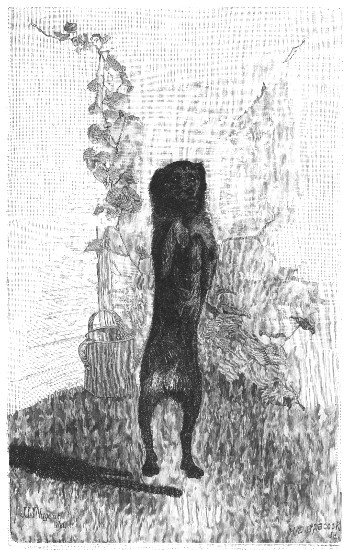 "BOB" JUMPING.
"BOB" JUMPING.
To make him speak softly, I took advantage of a fashion he had of whining when he wished to go into the yard for a frolic. I would go to the door and say, "Want to go out?" Bob would at once respond by preparing to rush out the moment the door was opened. Then I would say, "Speak softly!" and keep repeating the words until he whined. After a while he would whine the moment I said, "Speak softly!"
Another thing that I taught him was to fall down and lie motionless when I said, "Dead!" This I accomplished by taking hold of his forefeet in one hand and his hindfeet in the other, and suddenly dropping him on his side on the floor, as I said the word "Dead!" several times.
At first, Bob thought I was playing some new game with him, and prepared for a good time, but I had only to say "No!" to him to make him sedate at once. By this time he had learned that when I repeated a thing several times, it was because he was to learn something; and the little fellow really seemed to try to understand what I wished him to do.
After I had pulled his feet from under him a number of times, and had made him lie still until I said, "Alive!" I tried tapping a hindfoot and a forefoot, at the same time saying "Dead!" He was a long time learning this trick; and several times when I thought he had learned to do it when I simply tapped his feet, I was obliged to go back and pull his feet from under him. In time, however, he learned to fall the moment I touched the side of one hindfoot. From that to motioning at the foot, and finally, merely saying "Dead!" the progress was quick. To make him jump up, I always said "Alive!"
To make him go "lame" was very easy. I tied a long string to one forefoot, and by saying, "Lame!" and at the same time making him walk, while I prevented him from putting the tied foot down, he soon learned to go on three legs.
One of the funniest things he learned to do was to take his piece of carpet, shake it well, and put it back in its place. It was through an accident that I thought of teaching him to do this. I had been accustomed to shake out his carpet in the yard every morning. One morning I threw it on the grass to air. In a moment Bob had it in his mouth and was worrying it, shaking it, and growling. He was playing, but I saw that[Pg 529] I could teach him something, and at once said, "Make your bed!" By repeating this, morning after morning, he at last learned to pick up his carpet, carry it out into the yard, shake it, and carry it back. I could never teach him to lay it down properly, however; he seemed to think it was as good in a heap as if nicely smoothed out.
After I had taught Bob a number of tricks, I determined to write a play for him. I do not believe that any human actor ever had audiences more appreciative than his, when he performed in his "play." His little friends were always ready to give him sugar by the handful if I did not interfere, and Bob was always ready to take all that was offered. The "play" was nothing more than a simple little story into which were introduced the words which I used in commanding him to perform his various tricks. I would repeat the story, and when I came to a word of command, such as "dead," I would emphasize it so that Bob would at once do whatever he had been taught to do at the sound of that word. The play I wrote was about as follows:—
"Once upon a time there was a little dog named Bob [here Bob would run to me, and wait expectantly]. Usually he was a very good dog [wag, wag, would go his tail], but once in a while he was very naughty [down would drop ears and tail]. When he was a good dog [happy again], he would sit up and show any little boy or girl how to behave. At such times, he would speak softly [prolonged whine], as a polite dog should, though once in a while he would become excited, and shout, shout, shout [furious barking], as impolite children are sometimes apt to do.
"When a lady entered the room where he was, he would always stand up, ready to give her his chair if she wished it; or if she preferred to go into the garden or the street, he would go with her and walk like a gentleman. When he played, however, he could run like a schoolboy. But once he was in the ball-room, he could waltz about as well as the best dancer there.
"If any one ever said to him, 'go to your corner and lie down' he would do so at once like the well bred dog he was. But he was always obedient and would come immediately as soon as one said Bob.
"I was very sorry to hear one day that this remarkable dog was dead. I felt so badly that I went to his house, but was pleasantly surprised when I reached there, to find that he was very much alive."
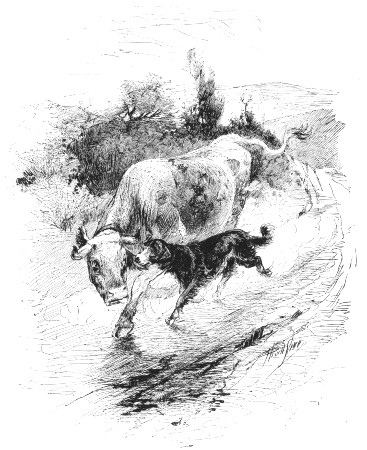 FETCH BRINGS IN THE PERVERSE COW.
FETCH BRINGS IN THE PERVERSE COW.
What will be the limit of Bob's education I do not know, for he continues to learn with increasing ease every day. In addition to all that has been described, he can now, at the proper order of command, sneeze, catch a piece of meat from his nose at the word "three," jump over a cane, turn a somersault, and play tag.
Old Fetch was a shepherd dog and lived in the Highlands of the Hudson. His master kept nearly a dozen cows, and they ranged at will among the hills during the day. When the sun was low in the west, his master would say to his dog, "Bring the cows home"; and it was because the dog did[Pg 530] this task so well, that he was called Fetch. He would run to a flat rock and hold his ear down close to it, having learned that he could thus catch the far-off tinkle of the cow-bells better than in any other way. If he could not hear them he would range about until he did, and then he was off like a shot in the direction of the sound.
One sultry day he departed as usual upon his evening task. From scattered, shady, and grassy nooks, he at last gathered all the cattle into a mountain road, leading to the distant barnyard.
Switching off the flies with their tails, the cows jogged slowly homeward, the tinkle of their bells gradually becoming more and more distinct to the milkmaid who was awaiting them. One of the cows was known to be a little perverse, and on that evening she gave fresh evidence of willfulness. One part of the road ran through a low, moist spot bordered by a thicket of black alder, and into this the cow pushed her way, and stood quietly. The others passed on, followed some distance in the rear by Fetch. He was panting from his exertions in the hot evening, his tongue lolling from his mouth as he slowly and languidly pursued his way.
Indeed he had quite discarded his usual vigilance, and the perverse cow took advantage of it.
As the cows approached the barnyard gate, he quickened his pace, and hurried forward, as if to say, "I'm here, attending to business." But his complacency was disturbed as the cows filed through the gate. He whined a little, and growled a little, attracting his master's attention. Then he went to the high fence surrounding the yard, and standing on his hindfeet peered between two of the rails. After looking at the herd carefully for a time, he started off down the road again on a full run. His master now observed that one of the cows was missing, and he sat down on a rock to see what Fetch was going to do about it. Before very long he heard the furious tinkling of a bell, and soon Fetch appeared bringing in the perverse cow at a rapid pace, hastening her on by frequently leaping up and catching her ear in his teeth. The gate was again thrown open, and the cow, shaking her head from the pain of the dog's rough reminders, was led through it in a way that she did not soon forget. Fetch looked after her a moment with the air of one remarking to himself, "You'll not try that trick again," and then he lay down quietly to cool off in time for supper.
A recent English writer tells the following story of an ingenious sheep-dog that, when the flock took a wrong road, would turn them back without worrying them. His owner had hesitated for some time before he made up his mind to have a dog, as he had often seen dogs ill-use the poor sheep. But believing that in most cases the dogs' harshness toward the sheep was due to bad training, and not to their naturally evil dispositions, he resolved to make trial of one. The dog he procured was young; and he trained it after his own ideas. He soon found the docile creature a very useful helper in driving a flock from one pasture to another. The sheep often took a wrong turn, and then scampered off as fast as they could go. At such times, most shepherds who had dogs were accustomed to send the dog after the flock, at the top of its speed. Of course, it soon overtook them, but the sheep were often much frightened, and not infrequently hurt by falling down or by rushing against one another. To prevent this, the shepherd mentioned would order his dog "Smart" to go to the other side of the hedge, saying, "Now, go ahead, and bring 'em back!" Smart would promptly obey, and would noiselessly run along behind the hedge, sometimes even climbing a little slope by the roadway, whence he could overlook the flock and see just where each sheep was moving. As soon as Smart, by peeping over or through the hedge, had satisfied himself that he was ahead of all the sheep, he would come coolly out of the hedge and bring them back down the lane so gently as not to cause them the least alarm. Smart never attempted to get ahead of a flock in the way common to most of the dogs in that vicinity,—by rushing past them and frightening them; but looking at his master and wagging his tail, he would cross the hedge, overtake them, and quietly drive them back into the right road.
There they were hanging, one of them out of sight in the cool, deep water, and the other swinging empty in the sunshine, as Daisy Hadley and her dog Bruno came up to the well. The little girl and the big dog had been rambling about all the morning, following the brook through fields of sunflowers and poppies, or climbing the rocks on the sides of the mountains; but they were tired and thirsty now, and Daisy looked wistfully at the empty bucket, wishing she were strong enough to pull it down and bring the other, full and dripping, up in its place.
"Bruno," she said reproachfully, "I wish you could draw me some water." Bruno was a great, shaggy Newfoundland, that had been Daisy's play-mate ever since she could remember. He was a[Pg 531] wonderful dog. Daisy herself would have told you that there were only a few things he could not do, but unfortunately managing that well was one of them. So there was no help for it, and Daisy was turning reluctantly away when she caught sight of Mr. Paul Gregg, one of the other summer boarders in the Park.
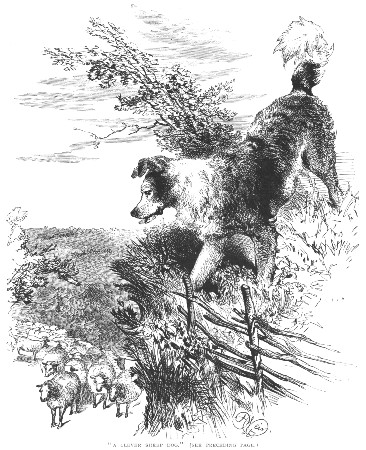 "A CLEVER SHEEP DOG." (SEE PRECEDING PAGE.)
"A CLEVER SHEEP DOG." (SEE PRECEDING PAGE.)
If he had not come up just then, there would have been no story to tell, and the buckets might have gone up and down in the well to this day without taking part in any more remarkable event. But he did come up; and Daisy's face brightened, for they were great friends, though she was only a little girl in the Kindergarten, and he was a tall young student. He stopped when Daisy said she wanted some water; and putting down his botanical box, he began to draw some gloves over his rather soft hands.
"I don't like this kind of a well at all," said Daisy. "It isn't half as nice as the one at my[Pg 532] grandfather's. That had only one bucket, with a rope that went 'round and 'round a great roller; and there was a handle that I could turn myself."
"This is a very old and respectable kind of a well, though," said Mr. Gregg, taking hold of the rope. "There must have been such wells as long ago as Shakspere's time."
"How do you know?" asked Daisy, who was sure that Shakspere lived a great while ago, though she could not have told when.
"Shakspere, you know, Daisy," said Mr. Gregg, "was a great poet who lived hundreds of years ago, and in a play he wrote, called 'King Richard II.,' he tells about just such a well as this. Richard was one of the kings of England, and a very unlucky king he was, though I can't deny that he brought his troubles on himself, for he was anything but a wise and prudent ruler. At last his cousin Prince Henry raised a great army and forced Richard to give up the crown. Poor King Richard did not show much spirit when his troubles came; but, according to Shakspere, he made a very neat speech, when his clever cousin Henry told him that he had decided to become King himself. Among other things, Richard said that the crown he must give up was
While Mr. Gregg was talking, the buckets in the well had changed places. The one which had swung in the air so lightly at first had gone down out of sight, and the other had come up ready to be emptied and to take its place in the sunshine.
Mr. Gregg paused now as he poured out some of the water. Daisy was silent too, trying to understand it all.
"What became of King Richard?" she asked presently.
"He died in prison," said Mr. Gregg. "Some say his cousin Henry, who took his place as king, had him put to death; and now," he added, turning away from the well, "I think that I will see if your mother is ready to go to dinner with us."
Then he turned toward the cottage and left Daisy standing by the well. She had not understood it all, but she felt very sorry for the unhappy king, and she thought she knew why he said he was like the bucket in the deep, dark water when he sank under his grief and shame never to see any more bright days.
She was leaning on the side of the well, with her hand upon the rope, thinking very earnestly of it all and trying to catch a glimpse of the bucket that was hanging there in the dark, when something dreadful happened. Before she knew it, she had leaned over too far. She lost her balance and fell over the side of the well. Down, down went the bucket, more swiftly than it had ever gone before, and with it, but holding desperately to the rope, went Daisy! There was only time for one terrible cry—and she was out of sight in the well!
There was no one there to save her,—Yes, there was Bruno! He heard the cry. He saw his little friend go down, and with a bark that rang across to the mountains, he rushed to the well. He leaped frantically against the low wooden side just as the bucket which had been in the water rose even with its edge. Somehow he managed to fling his heavy paws on it, then his whole body, and then, all at once, it was Bruno that was going down, down, but clinging to the bucket and howling as he went,—and Daisy was coming up!
It was only for a minute, therefore, that Daisy was in the water. The next moment, thanks to the sudden pull at the other end of the rope, she was rising again; and just as Bruno, loosened his hold of the bucket, and dropped heavily into the water, Mr. Paul Gregg reached the side of the well, seized the rope and drew Daisy to the top, gasping, shivering, and frightened almost to death.
As soon as Daisy could speak, she said, "Save Bruno!" But they had already begun to do that, and they did save him, of course. The brave old fellow was none the worse for his adventure. He dried himself in the sunshine, and then lay down beside the rocking-chair where Daisy sat folded in a soft wrap, with vaseline on her blistered hands.
Daisy was none the worse for it either, in the end; though at first, when her mother asked her how it happened and she tried to say something about a "poor king," and "a bucket-full of tears," the poor lady was afraid the plunge had affected her daughter's mind, and to this day she is in doubt whether Shakspere or King Henry or Mr. Paul Gregg was responsible for the accident.
One thing however, was clear. It was Bruno who had saved her. Had he really meant to go down with the bucket and rescue her? Daisy never had a doubt of it herself. For the rest of the season he was the hero of the Park. The summer guests bought him a silver collar beautifully engraved, and Mr. Paul Gregg declared that he should propose his name as an honorary member of the Humane Society.
But Bruno's head was not turned with all those honors. He rambled through the fields with Daisy as he had done before, and when she put her arms around his neck, and said that he should be her dearest friend forever, he was happier than if his collar had been made of gold, or than if he had been elected president of the Humane Society.
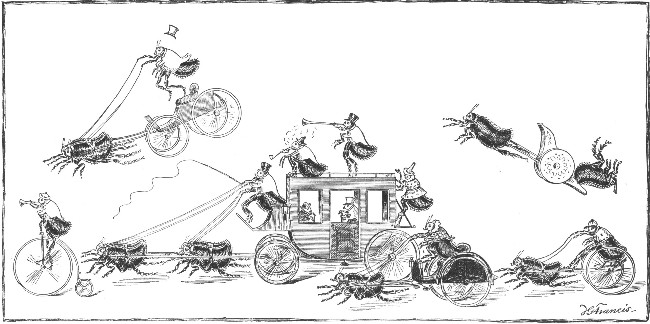 THE "GO-AS-YOU-PLEASE" RACE, AS SEEN THROUGH A MAGNIFYING
GLASS. (SEE PAGE 535.)
THE "GO-AS-YOU-PLEASE" RACE, AS SEEN THROUGH A MAGNIFYING
GLASS. (SEE PAGE 535.)
In a former number of St. Nicholas the largest circus in the world was described, and the curious animal actors were shown in many of their tricks and performances. We now wish to exhibit another circus, the smallest in the world, the performers in which, numbering several hundreds, could all be carried about in a cherry-stone—in fact, a circus of fleas, of such remarkable intelligence that in their various feats they were quite equal to many of the larger trained animals with which we are familiar.
But before showing what the flea can do, let us look at its antecedents. We know that it is a wingless fly,—a cousin to the house-flies on one side, and to the crane-flies on the other; and a more knightly-looking little creature you can not possibly imagine. Under the microscope we see it covered with a rich polished armor resembling tortoise-shell. The head is small, and supports two antennæ or feelers, composed of five joints, and between these is the proboscis, a terrible affair. Upon close examination with a powerful glass, what an array of piercing and cutting blades are seen,—long, narrow, transparent knives, each edge armed with a double row of glistening points that extend outward and then are hooked backward! These are known as the mandibles, and fit closely together, concealing another and smaller blade that has a similar but single row of points. Besides all this, there are two cutting-blades; the under edges are as sharp as sharp can be, while the upper are thick and set with bristles. Do you wonder then that the flea is so sharp a biter?
On its armored head are two large eyes; and the entire body is seen to be made up of a series of elastic armor-like bands wonderfully jointed, and armed with bristling spines like the steel points on the armor of olden times. The legs are six in number, jointed in so remarkable a manner that they can be folded up one within another. When the flea makes its prodigious leaps, these six legs all unfold at once, hurling the little fellow high into the air.
The baby flea is produced from a minute egg that in six days hatches into a tiny worm. In about ten days, the worm changes into a chrysalis, and in twelve days more it appears a perfect flea, ready for warfare upon anything or anybody.
Who first discovered that the flea was susceptible to education and kind treatment is not known; but the fact remains that on their small heads there is a thinking-cap capable of accomplishing great results. In the selection of fleas for training, however, the same care must be taken as with human beings, as the greatest difference is found in them. Some are exceedingly apt scholars, while others never can learn, and so it is that great numbers of fleas are experimented with before a[Pg 534] troupe is accepted. The Flea Circus here described was exhibited a few years ago and was composed of about two hundred of the most distinguished and intelligent fleas in the entire family.
One of the first lessons taught the flea, is to control its jumping powers, for if its great leaps should be taken in the middle of a performance, there would be a sudden ending to the circus. To insure against such a misfortune, the student flea is first placed in a glass phial, and encouraged to jump as much as possible. Every leap here made brings the polished head of the flea against the glass, hurling the insect back, and throwing it this way and that, until, after a long and sorry experience, and perhaps many head-aches, it makes up its mind never to unfold its legs suddenly again. When it has proved this by refusing to jump in the open air, the first and most important lesson is complete, and it joins the troupe, and is daily harnessed and trained, until, finally, it is pronounced ready to go on the stage or in the ring.
The famous Flea Circus was placed on an ordinary table, and resembled in size and shape a common dinner plate. A rim several inches high encircled the outer edge, and around the circle stood a number of small wooden boxes—the houses of the performers, and the stables for their carriages. The signal being given, the audience, consisting of one human being, would take in hand the large magnifying glass, hold it over the ring, and the performance would begin. At the word of command from the director, a very jolly, red-faced old gentleman, armed with a pair of pincers, a tiny trap-door in one of the wooden houses sprang open and a number of fleas filed out. They passed around the circle in a dignified manner, appearing through the glass about as large as wasps or bees. Each flea had a gold cord about its waist, and this was the grand entry always seen at the circus. Having completed the circuit, they returned to their quarters, and the performance proper commenced. Five fleas, each adorned with a different color, stepped from another house, and after running about here and there, and being admonished by the director, ranged themselves in a line, and at the word "go!" started on a rush around the circle; running into each other, rolling over and over, and making frantic leaps over one another. Only after half the course had been gone over, did they move in regular order, and strive fairly for the goal. In another moment, a large flea would have won the race had not two laggards almost at the last instant, as if made reckless by their evident risk of defeat, taken a desperate leap and landed far beyond the winning-post. Forthwith they were taken up in the pincers, and placed in solitary confinement in the glass phial, where it was supposed they had learned not to jump.
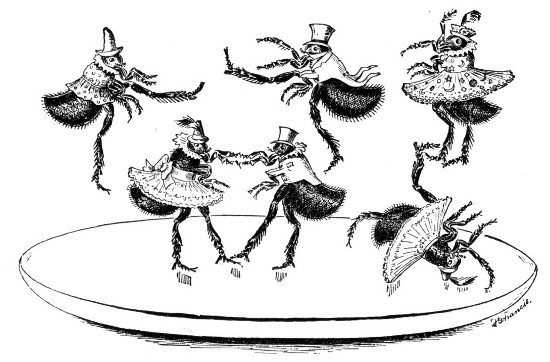 THE DANCE.
THE DANCE.
A dance was next announced and at a signal from the manager there came tumbling out from the third house probably the most ludicrous band of performers ever witnessed. Each dancer was in full regalia, like the ladies who ride the padded horses in the regular circus, their dresses of tissue paper being ornamented with purple, gold, and red hues. The glass was placed in position, the spectator looked through it, the performers were lifted in by the pincers, and the dance began—a mixture of the Highland-fling, the sailor's hornpipe, and a "regular" break-down.
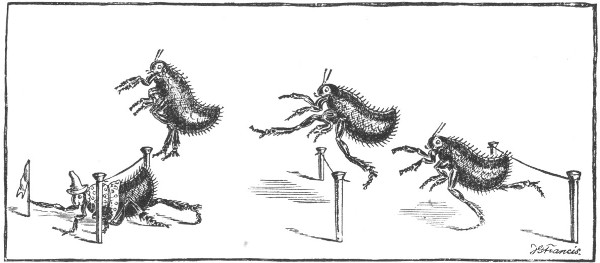 THE HURDLE-RACE.
THE HURDLE-RACE.
The little creatures bobbed up and down, now on one claw, now on all six, hopping, leaping, bowing, and scraping, moving forward and back, bumping into one another, now up, now down, until they seemed utterly exhausted, and several that had fallen down, and were kept by their voluminous skirts from getting up, had to be carried off by the aid of the ever-ready pincers.
Next came a hurdle-race. Hurdles of thin silver wire were arranged, over which two fleas were supposed to leap. One, however, was evidently very lazy or very cunning, as it won the last race by crawling under the wire.
A clown flea now appeared in the ring, and[Pg 535] crawled about in a comical manner with a white clown's cap on its diminutive head. A moment later out came a number of fleas all harnessed with gold wire trappings, and the several vehicles were taken from the stables. There was a tally-ho coach, smaller than a very small pea, an Eskimo sled, about a quarter of an inch long, with wire runners, a trotting sulky, evidently made from hair or bristles, and other gorgeous equipages. The tally-ho team of four frantic fleas, evidently fiery steeds, was harnessed to the coach, and on the top were placed four phlegmatic fleas that had probably been booked as outsiders, while the insides were two others fleas, which, we are sorry to say, were obliged to get in through the window, and acted very much as if they wished to get out again. The other vehicles were each provided with a steed and rider, and then all were drawn up in a row. At the word of command, off they started pell-mell! The tally-ho leaders evidently jumped their traces at first, but finally they were off with a rush, running over the clown, knocking off his hat, and, for the moment, creating a dreadful panic. The sled team threw its driver, and the sulky ran away, the flea trotter actually leaping into the air, sulky and all. But order was soon restored, and as the track was arranged on the downhill principle, the racers made rapid time. In two minutes the circuit was completed, the tally-ho coming in ahead, without, however, its outside passengers, who were thrown off as the coach was rounding the curve, and at once crawled into the nearest place of refuge.
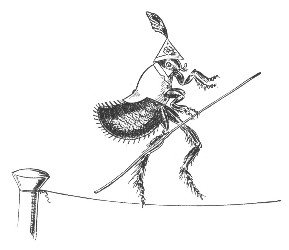 SIGNOR PULEX IRRITANICI ON THE TIGHT-ROPE.
SIGNOR PULEX IRRITANICI ON THE TIGHT-ROPE.
The last act of this wonderful circus was perhaps the best. The manager arranged the stage by placing two very fine entomological pins about four inches apart, connecting them by a slender silver wire, and then announced that Signor Pulex Irritanici, the world-renowned tight-rope performer, would attempt his wonderful feat of dancing upon the wire at a "dizzy height" (compared to the size of the performer). The Signor was then brought out in a small bottle of cut-glass; his only ornament was a little jacket of tissue-paper. When fished out and placed upon the pin-head, he boldly started out upon the wire over which his little clawed toes seemed to fit. In the middle, and over the terrific abyss, he balanced up and down for a second, stood upon his longest legs, and then moved on, crossing in safety, and thus ending the circus, at least for that occasion.
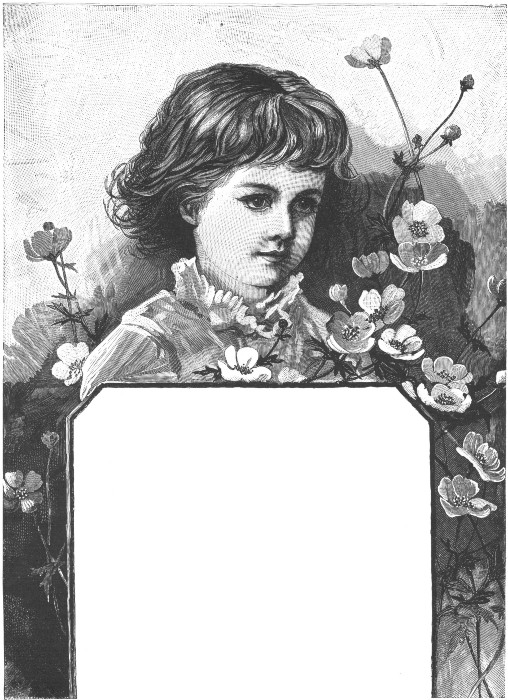

My plan dates from a few delightful weeks which I spent with a girl friend, long ago. We were devoted to poetry and to reading aloud; and in that occupation we had the aid of a brilliant, accomplished young woman. She selected for us from Coleridge, Shelley, and several other authors, whose entire works she knew we would not care to read, all the specially fine poems or passages, and these we read and discussed with her over our fancy-work. It was charming. At last, she suggested that, as I was soon to go away and leave the books and clippings with which I had been growing familiar, it would be helpful for me to write down the choicest bits, and try in that way to keep in some degree what I had gained. This I did, putting the extracts in a school copy-book which our friend dubbed "Snippers,"—from an odd seamstress word which she had picked up by chance.
Other "snipper" books followed when that one, years after, had been filled.
My system is an orderly one. All my books are broad-paged and wide-lined, thus preventing the cramped and crowded writing which often makes such books unreadable. When I find anything which strikes me as worth keeping, I note on a slip of paper, somewhat longer than the book I am reading, the number of the page and make a perpendicular line beneath it, with a cross line indicating the relative position of the sentence which I wish to keep, thus:

If the page is in columns, I make, instead of the single line, a rough parallelogram, and note within it by square dots the relative positions of the sentences chosen for preservation, thus:
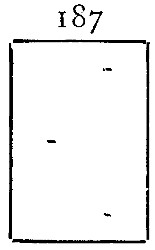
This slip of paper I use as a book-mark until it is filled or the book is finished, noting upon it, as indicated, the choicest passages and their positions on the pages. When I have finished the book I go carefully over these selected sentences. Many are discarded; the rest go into my "snippers." Below the first entry and to the right, I place the name of the book and its author, both heavily underscored; below the others, the word "Ibid" or "ditto," underscored. At the top of each page I note the year, and at the head of each batch of extracts the month or day.
Paragraphs cut from newspapers, which are worth saving, are pasted as a fly-leaf to the inner edge of the page, or even slipped under the binding thread.
In carrying out my plan I am always content with hasty work,—but I write plainly, and if possible with ink, as much fingering destroys pencil-marks. I once tried classifying the extracts, but this scarcely paid for the trouble.
I used sometimes to wonder whether these books of selections were of any real value. But I have grown now to prize them greatly. Many a time I go to them for a dimly remembered phrase or passage. Sometimes, too, I read them over, for of course they give me the essence of what I most like and admire in my reading. A short time since I lent one to a literary friend, and was surprised to find she enjoyed it so greatly that she was almost unwilling to give it back.
I am very glad that I began this practice in my young days. It gives very little trouble, and that little is a pleasure.
There is a familiar expression about an "embarrassment of riches." This is the greatest disappointment I experience with my "snippers." For, occasionally, a book has too many good things in it to be easily copied, and then my only relief is to own it and, marking it vol. X, add it to my row of extract-books.
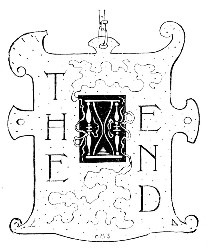
Perhaps you have never given a thought to the fact that, because you were born into a nation using an alphabet that came down from the Phœnicians, you are saved a world of trouble. But consider the Chinese. If a Chinese boy and an American boy begin to learn their letters at the same time, each studying his own writing, then by the time the American is ten years old he has advanced as far in the use of letters as the Chinese boy will have advanced in the use of his when he is twenty years old. That is the same as saying that Chinese writing is three or four times as hard to learn as English. Think of spending the years between ten and twenty in learning to read! On the other hand, the long apprenticeship of Chinese and Japanese boys to their letters does them good in one way. They paint their letters with a brush on soft paper. By this means they learn very early to be skillful with the brush, which is one reason why Chinese and Japanese artists are so very dexterous with their brushes.
All writing, let it be remembered, must have begun with pictures. It is largely Chinese writing which has explained how all sorts of letters were gradually changed from pictures to an alphabet, in which hardly a single letter tells from what picture it started. The Japanese tongue is quite different from the Chinese. But the use by the Japanese of signs employed ages before by the Chinese explains another step in the progress of language. The writing of the Mexican Indians also helps us to understand the growth of alphabets. When, ages ago, the Chinese began to write, they drew little pictures of the things they wished to represent, as did the Egyptians before them in their picture-writing; and from picture-writing they made some advance in the direction of sound-writing, or rebuses. Then the little rebus-pictures were so much altered that it became very difficult to see what they once meant.
Now Chinese is a queer language. All its words are only one syllable long. But the sounds in the Chinese language are not very many, some four hundred and sixty-five at most, and their written language contains about eighty thousand pictures, each picture representing a thing or idea. And these pictures must be committed to memory. This is hard work, and not even the wisest Chinese professor can learn them all. But now comes a difficulty. For, of course, where there are so many words and so few sounds, many different words have to be called by the same sound. How then are they to tell, when several different things have exactly the same name which of them is meant?
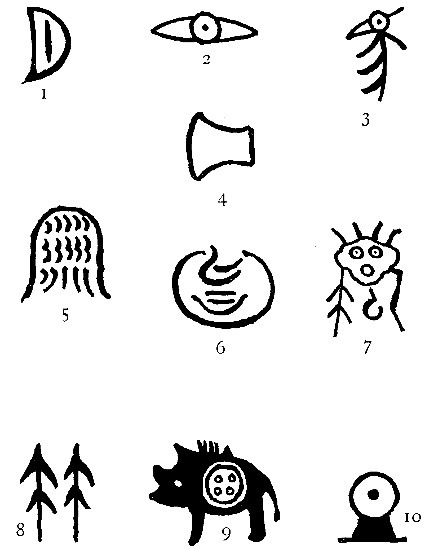 REBUS-PICTURES FROM THE OLD CHINESE, SHOWING THE
BEGINNINGS OF PICTURE-WRITING.
REBUS-PICTURES FROM THE OLD CHINESE, SHOWING THE
BEGINNINGS OF PICTURE-WRITING.We have such words. For instance, there is Bill, the name of a boy; and bill, the beak of a bird; there is bill, an old weapon, and bill, a piece of money; there is bill, an article over which legislatures debate, and bill, a claim for payment of money; besides bills of exchange, bills of lading, and so forth. But Chinese is full of such words of a single syllable, yen, for instance, which, like bill, means many very different things. So they chose a number of little pictures, and agreed that these should be used as "keys." The Chinese "keys" were used like the Egyptian "determinative signs," of which I told you. Each "key" meant that the sign or signs near which it stood belonged to some large general set of things, like things of the vegetable, mineral, or animal kingdom,[Pg 539] forests, mines, or seas, air, or water, or of persons, like gods or men. It was like the game called Throwing Light, in which you guess the article by narrowing down the field until certain what it is.
But there Chinese writing stopped short, thousands of years ago. There it is to-day. There are now two hundred and fourteen of these "keys," and, by intense application, Chinamen learn to use their method with surprising quickness and success.
The Japanese acted toward Chinese writing much as the Phœnicians did toward Egyptian writing. The Japanese, a very intelligent people, made what you have learned to know as a syllabary, out of signs taken from the Chinese symbols. It is called a syllabary, you remember, because each sign stood in their language for a syllable. They had to do this, because, while Chinese is all short syllables, Japanese is a language of much longer words even than ours. They cut down and simplified the Chinese signs, giving them names of their own. In this way they manage to write very swiftly. And, while not so clumsy as the Chinese fashion, the Japanese method is clumsier than is the use of an alphabet. In late years, a society has been started in Japan to do away altogether with their old-time writing, and adopt our alphabet.
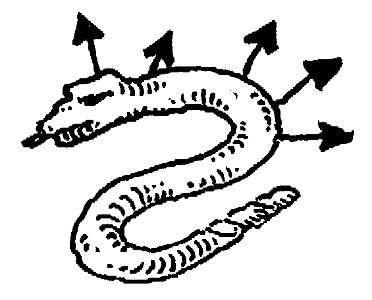 FIG. 1.
FIG. 1.
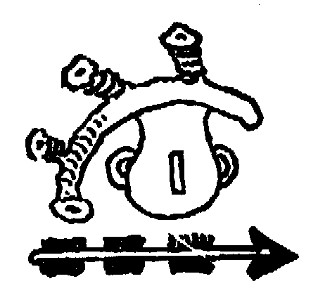 FIG. 2.
FIG. 2.
Perhaps, by this time, you are beginning to see how very slowly alphabets have grown, and how hard it has been for human beings to perfect them. Knowing this, will you not look now with more interest on written and printed words? When you see letters, will you not reflect what a history each one has, reaching far back into the remotest past, where at first all seems dark, and where, when light does come, the very number and variety of materials perplex the student of alphabets? Moreover, will you not feel ashamed of people who laugh or sneer at savage nations who have no sound-writing, no syllabary, no alphabet? It does not mean that in such races all men are stupid. As a rule it means simply that the race has not had a fair chance. It has been racked by wars. Or it has never come in contact peacefully with some nation that used a method of writing a trifle better than its own, so that the brighter minds could establish schools of learning. When one nation conquers another, the higher and cleverer minds among the conquered are often the first to be destroyed. The best of our Indians of North and South America seem to have been the first to fall in battle with the whites, or to have died off because of their cruelty. The reason why the others, who lived with or near the white settlers, did not readily borrow our way of writing in their turn, as we had borrowed from the Romans, the Romans from the Greeks and Phœnicians, and the latter from the Egyptians, seems to be that our system was too far advanced for them. But if the first white settlers in Central and South America had been kind and wise men, instead of coarse and greedy people, they could have found tribes and nations almost as advanced in their mode of writing as the Japanese, though not the equals of the Japanese in architecture and the fine arts. These tribes could have learned our alphabet if care had been taken to instruct their superior men. It is certain that the Aztecs, or Mexican Indians, had advanced very far on the road to a true alphabet. When the cruel Spaniards arrived and upset their governments, destroyed their temples, massacred, enslaved and then shamefully neglected them, they had already reached the art of rebus-writing. The name of the Mexican King, Knife-Snake, or, Itz-Coatl was written in this way: Itzli means knives, and Coatl, snake. There, in Fig. 1, is the snake, and on his back are knives made of flint. They even went farther. The same name, Itz-Coatl, was also written as in Fig. 2. The flint-headed arrow means Itz; the jar, called Comitl, stands for Co; and the branch, a picture of water in drops, stands for atl, water. And it has been asserted that certain neighbors of the Aztecs or Mexicans, known as the Maya Indians of Yucatan, who were ancient people of Central America, left ruins of cities covering square miles of forest and plain, and had reached nearly if not quite to the invention of an alphabet of vowels and consonants. But the latest authorities agree that such a Maya alphabet as the Spaniards reported may have been invented after the whites arrived. Specimens of Maya writing may be seen in Washington, at the Smithsonian Institute, on slabs and on paper casts taken from their idols or statues of kings and priests. It was not by the Maya system, but by one of rebuses, that the old missionaries wrote what few books they composed for their unhappy Indian congregations. Only lately a book composed in picture-writing throughout, was printed for the Mikmak Indians of Newfoundland.
In the next paper we will endeavor to trace the road by which our English alphabet came down from the Phœnicians, that ancient folk of the palm-tree and the Red Sea, whose alphabet you saw in the first paper of this series.
The illustrations of this article are reproduced, by permission, from a notable French work on ancient Hieroglyphics by Prof. L. De Rosny, of Paris.
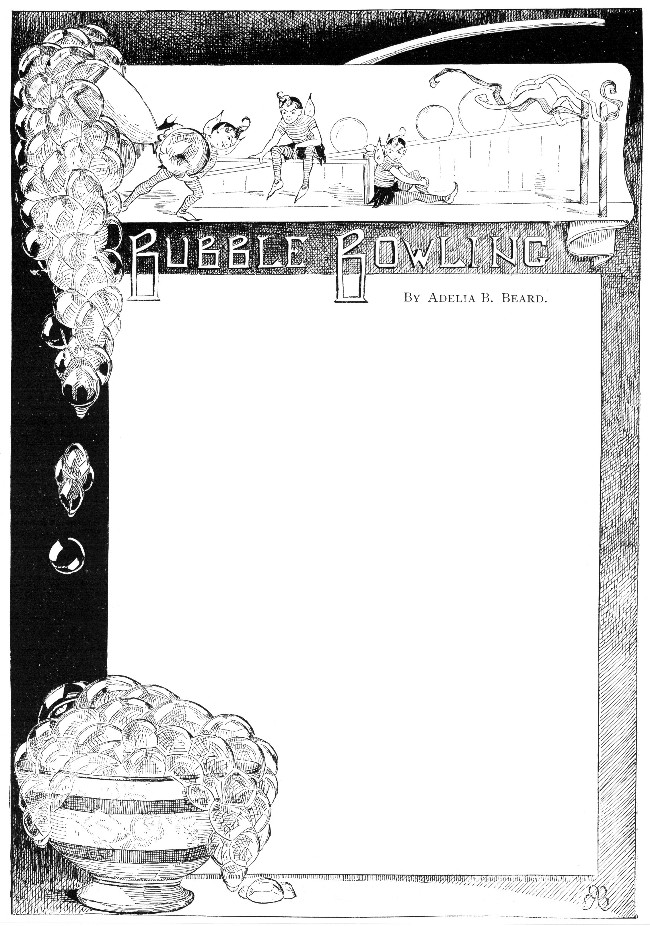
"Nothing new in bubbles! Every one knows how to blow bubbles!" Of course they do, and yet, the game I am about to describe is an entirely new and a very interesting one.
When the game of Bubble Bowling was played for the first time, it furnished an evening's entertainment, not only for the children, but for grown people also; even a well known General and his staff, who graced the occasion with their presence, joined in the sport, and seemed to enjoy it equally with their youthful competitors. Loud was the chorus of "Bravo!" and merry the laugh of exultation when the pretty crystal ball passed safely through its goal; and sympathy was freely expressed in many an "Oh!" and "Too bad!" as the wayward bubble rolled gayly off toward the floor, or, reaching the goal, dashed itself against one of the stakes and instantly vanished into thin air.
Bubble parties are delightful, as most children know from experience, and it is unnecessary, therefore, to give a description of them here. I propose merely to introduce bubble bowling as a feature in these entertainments, which will furnish no end of amusement and jollity, and add increased enjoyment and variety to the programme.
The game should be played upon a long, narrow table, made simply of a board five feet long and eighteen inches wide, resting upon ordinary wooden "horses." On top of the table, and at a distance of twelve inches from one end, should be fastened in an upright position, two stakes twelve inches high; the space between the stakes should be eight inches, which will make each stand four inches from the nearest edge of the table. When finished, the table must be covered with some sort of woolen cloth; an old shawl or a breadth of colored flannel will answer the purpose excellently. Small holes must be cut at the right distance for the stakes to pass through. The cloth should be allowed to fall over the edge of the table, and must not be fastened down, as it will sometimes be necessary to remove it in order to let it dry. It will be found more convenient,[Pg 541] therefore, to use two covers, if they can be provided, as there can then always be a dry cloth ready to replace the one that has become too damp. The bubbles are apt to stick when they come upon wet spots, and the bowling can be carried on in a much more lively manner if the course is kept dry. Each of the stakes forming the goal should be wound with bright ribbons of contrasting colors, entwined from the bottom up, and ending in a bow at the top. This bow can be secured in place by driving a small, or brass-headed tack through the ribbon into the top of the stake. If the rough pine legs of the table seem too unsightly, they can easily be painted. Or a curtain may be made of bright-colored cretonne,—any other material will do as well, provided the colors are pleasing,—and tucked around the edge of the table, so as to fall in folds to the floor. The illustration on this page shows the top of the table, when ready for the game.
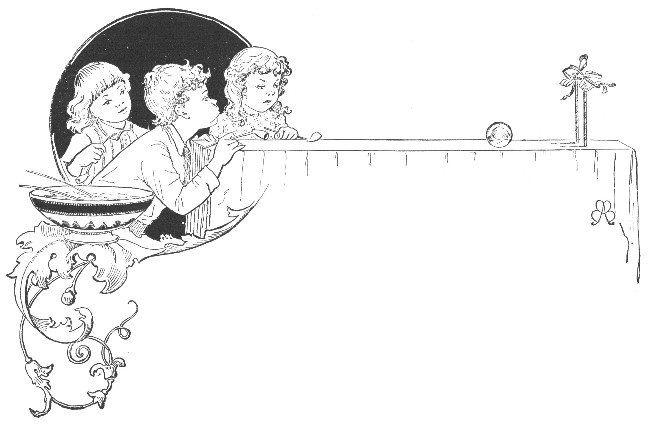
For an impromptu affair, a table can be made by placing a leaf of a dining-table across the backs of two chairs, and covering it with a shawl. The stakes can be held in an upright position by sticking them in the tubes of large spools. This sort of table the children can arrange themselves, and it answers the purpose very nicely. The other things to be provided for the game are a large bowl of strong soapsuds, made with common brown soap, and as many pipes as there are players.
The prizes for the winners of the game may consist of any trinkets or small articles that the fancy or taste of the hostess may suggest. Bubble Bowling can be played in two ways. The first method requires an even number of players, and these must be divided into two equal parties. This is easily accomplished by selecting two children for captains, and allowing each captain to choose, alternately, a recruit for his party until the ranks are filled, or in other words, until all the children have been chosen; then, ranked by age, or in any other manner preferred, they form in line on either side of the table. A pipe is given to each child by the hostess, and they stand prepared for the contest. One of the captains first takes his place at the foot of the table, where he must remain while he is bowling, as a bubble passing between the stakes is not counted unless blown through the goal from the end of the table.
The bowl of soapsuds is placed upon a small stand by the side of the bowling-table, and the next in rank to the captain, belonging to same party, dips his pipe into the suds and blows a bubble, not too large, which he then tosses upon the table in front of the captain, who as first bowler, stands ready to blow the bubble on its course down through the goal. Three successive trials are allowed each player; the bubbles which break before the bowler has started them, are not counted.
The names of all the players, divided as they are into two parties, are written down on a slate or paper, and whenever a bubble is sent through the goal, a mark is set down opposite the name of the successful bowler.
When the captain has had his three trials, the captain on the other side becomes bowler, and the next in rank of his own party blows the bubbles for him. When this captain retires, the member of the opposite party, ranking next to the captain, takes the bowler's place and is assisted by the one whose name is next on the list of his own side; after him the player next to the captain on the other side; and so on until the last on the list has his turn, when the captain then becomes assistant and blows the bubbles.
The number of marks required for either side to win the game, must be decided by the number of players; if there are twenty,—ten players on each side,—thirty marks would be a good limit for the winning score.
When the game has been decided, a prize is[Pg 542] given to that member of each party who has the greatest number of marks against his or her name showing that he or she has sent the bubble through the goal oftener than any player on the same side. Or, if preferred, prizes maybe given to every child belonging to the winning party.
The other way in which Bubble Bowling may be played is much simpler, and does not require an even number of players, as no sides are formed. Each bowler plays for himself, and is allowed five successive trials; if three bubbles out of the five be blown through the goal, the player is entitled to a prize. The child acting as assistant becomes the next bowler, and so on until the last in turn becomes bowler, when the one who began the game takes the place of assistant.


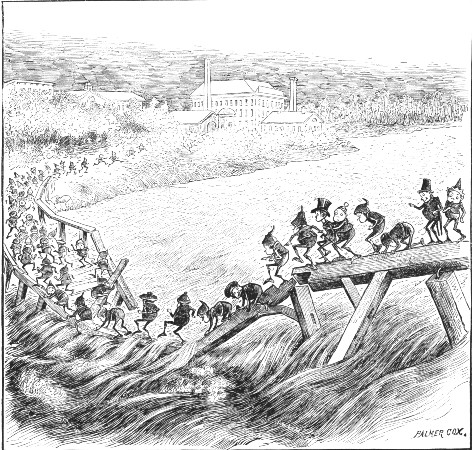
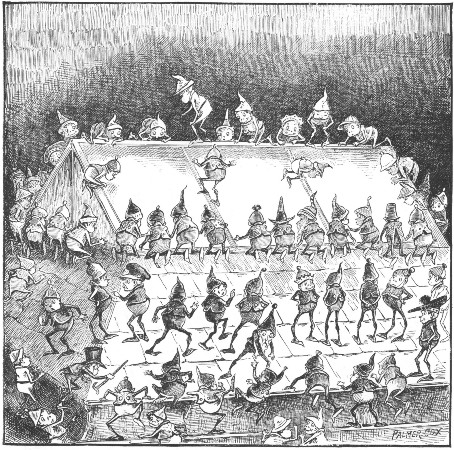
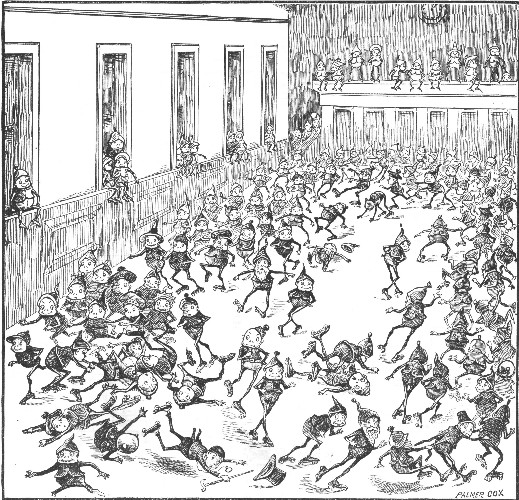



The Fair of the American Institute held annually in New York, is chiefly a display from the various American trades showing improvement and advancement; here designers and inventors also present many novelties and useful inventions for public criticism and judgment.
One feature of the Fair of 1885 that attracted much attention and comment, was the novel and unique display of mechanical models designed and constructed by the boys of the third grade in Grammar-School, No. 57, one of the public schools of New York City. The work exhibited by these boys is peculiarly interesting and suggestive, and is an indication of what observant, thoughtful, and intelligent boys can devise and do when their tastes and natural inclinations are developed.
The boys' models were made at home, after class-hours, and on odd holidays during the six months previous to exhibition, and were primarily intended to illustrate the principles of the six mechanical powers,—the inclined plane, the lever, the wedge, the pulley, the wheel and axle, and the screw. When the American Institute Fair opened, an inclined railway, with its platform and cars; a miniature guillotine, with ready knife; a dumb-waiter in full working order; a derrick prepared to raise many weights; a pile-driver with its automatically dropped weight, the sound of which never failed to attract attention,—all these, with other models, occupied a space in Machinery Hall.
During the morning hours, curtains screened the models; in the afternoon the youthful exhibitors arrived and took special delight in showing the working of their designs. The pleasant hours spent there, the praise of visitors, and the recognition and commendation accorded by the press will be long remembered by the boys. At the closing of the Fair, the exhibit was awarded the Medal of Merit.
The illustrations on pages 548 and 550 show the models exhibited. Figure 1 represents an alcoholic furnace, illustrating the expansion of a brass rod by heat. A cylinder of tin, fifteen inches in height and five in diameter, is hinged to a base of wood and arranged so as to tilt to the left. A lever fifteen inches long opens and closes a damper; this lever (an umbrella rod) is inserted in a pivoted rod of wood two inches long, supported in a square frame made of an inch strip of tin bent twice at right angles and soldered to the cylinder.
A brass banner rod, seven inches long, also connects with this rod and, passing through an inch opening, is supported in the flame of an alcohol lamp and fastened on the opposite side by a tiny brass knob screwed on the protruding thread of the rod. A small pulley and weight steadies the motion of the lever.
The heat of the alcohol flame causes the brass rod to lengthen, and this in turn moves the lever which opens the damper; and the degree of expansion is indicated on a paper scale by a straw pointer attached to the rod of the damper. A coating of copper bronze was given to the cylinder. This model was made in part by Winfred C. Rhoades.
Figure 2 shows a forge made by William E. Tappae. A hand-bellows is mounted on a wooden base about ten by twenty-four inches in size, and is worked by a lever handle supported in a frame twenty-six inches in height. The bellows consists of two boards connected by flexible leather tacked to the edges. The upper board is stationary, and an inch central opening is covered on the inside by a two-inch flap of chamois fastened at one point, forming a valve.
As the handle is pushed up, the air rushes in, and when pulled down, the valve closes and the compressed air is forced through the metal nozzle to the glowing coals. The carved-wood anvil was stained black and the other parts were painted a bright vermilion.
Figure 3 explains one way of connecting levers, and their uses as a mechanical aid. The base is four by fifteen inches in size, and the pillars are respectively six and ten inches in height, and are firmly mortised and glued into the base. The upper lever is eighteen inches in length, and connects with the ten-inch lower lever.
The lead weights, sliding on the narrow edges of the levers, balance each other, and show how the heavy wagon of coal is balanced in the office by the weight on the scale-beam.
A wedge made of oak ten inches in height and five inches in width is indicated by Figure 4.
Figure 5 represents a diminutive pile-driver, twenty-eight inches in length, showing the plan and action of a large machine.[Pg 548]
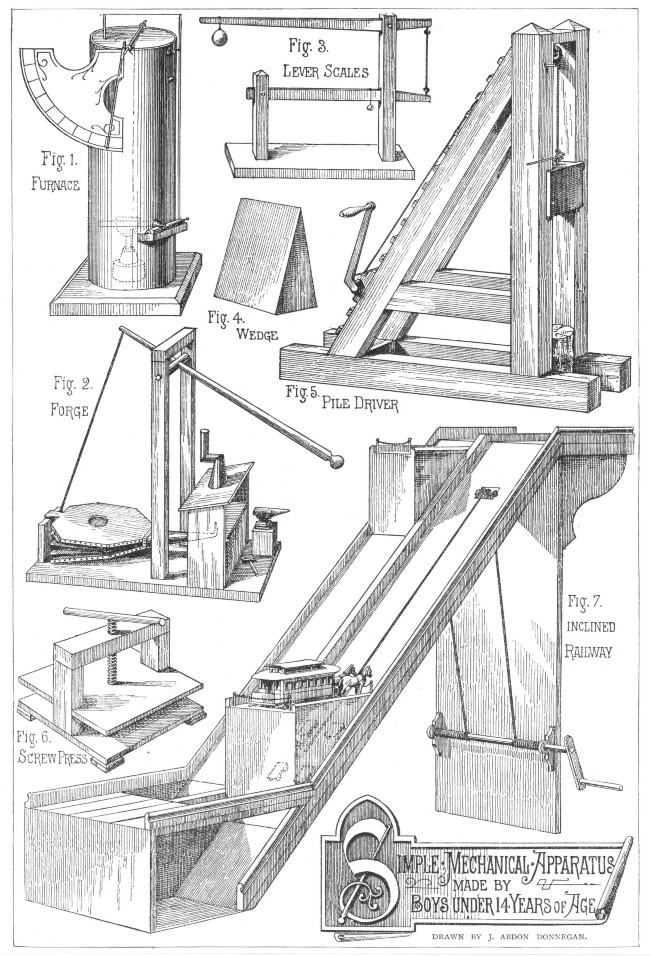 SIMPLE MECHANICAL APPARATUS MADE BY BOYS UNDER 14 YEARS
OF AGE.
DRAWN BY J. ABDON DONNEGAN.
SIMPLE MECHANICAL APPARATUS MADE BY BOYS UNDER 14 YEARS
OF AGE.
DRAWN BY J. ABDON DONNEGAN.
The two-pound drop-hammer falls a distance of twenty-two inches in the grooves of the vertical posts which are mortised and glued into the base, as are also the oblique braces to which are attached the bobbin, or axle, and crank, on which the cord is wound that raises the hammer. This hammer is a flat piece of iron having two pieces of wood, each four by two and one-half inches in size, cemented to it. A wire hook is attached just above, and the extended arm of the hook as the weight nears the top, meets a projecting pin, and slips the weight from the cord.
Figure 6 is the model of a wood-press useful in pressing flowers for an herbarium. The base and pressure board are each ten inches square, the supports eight inches in height, and a wooden screw connected with the upper board turns in the cross-piece. This and the models shown in the drawings numbered 3, 5, and 10 were made by Harry Stœcker.
Figure 7 represents the model of an inclined railway constructed upon the plan of the inclined railway actually in use between Hoboken and Jersey City Heights. A board forty-five inches in length and ten inches in width connects the terminal platforms of this model. The upper platform rests on a support thirty-three inches in height; to this support is attached an axle turned by a crank, on which are wound the reversed cords which connect with the ascending and descending platforms. These platforms are mounted on rollers and the cars while in motion are kept in a horizontal position. This model was constructed by Everett L. Thompson.
The same boy constructed also the model shown in Figure 8—a dumb-waiter with original arrangement of cords and pulleys. The frame is thirty-six inches in height, eleven inches in width, and five inches in depth. Inside, a carrier with shelves is raised by a cord passing over four pulleys, the action of which may be seen through glass slips fitted in grooves. To the end of a cord is attached a weight which balances the weight of the carrier and contents. The frame-work was stained a dark mahogany color, oiled and varnished.
Figure 9 represents a miniature guillotine as made by David W. Benedict. It was copied after one brought from France and exhibited at a well-known museum in New York City.
The frame is twenty-two inches in height, and the block to which is fastened the tin blade, falls through the grooves in the posts to the rest upon which lies the head of the criminal. The cord raising the block runs over the pulleys, and is wound on the cleat when not in use. A box beneath receives the head of the imaginary victim as it falls. The machine with the exception of the blade was painted in bright vermilion and varnished.
Figure 10 shows a small derrick constructed after a sketch of one used in the erection of the Madison Avenue bridge across the Harlem River. A mast of maple twenty-seven inches in length is mortised into an oak base, ten by twelve inches in size. A projecting arm, or jib, is fastened to the mast by a clasp of heavy tin. A cord and pulley keep the jib at a proper angle with the mast. The weight is hooked to a double pulley connected with the single pulley near the end of the jib; the cord, passing over a wheel in the mast and then passing downward, is wound upon the axle by turning the crank; a toothed wheel and ratchet stops the weight at the desired height. Neater pulleys than could be purchased were made by joining two wooden buttons and placing them in a whittled frame bound with piano-wire. The mast and jib were painted a dark blue and the base was polished and varnished.
Figure 11 shows a model of a foundry crane, much admired for its accuracy of design and finish. It was made by George Chase, of seasoned maple with iron and brass connections. A swinging jib is pivoted at the top to a brass plate screwed to the cross-piece of the frame, and turns on a steel pin fitted to a plate on the base. A carriage travels along the jib, being kept at the required distance by a cord passing over a wheel at the end of the jib. A cord attached to the carriage passes over a pulley connected with the weight, and also over the wheel of the carriage, to the wheel directing it to the axle, which is turned by a cog-wheel and pinion taken from an old clock.
The carrier of the elevator shown in Figure 12 is hoisted by a cord passing over a small iron pulley fixed to the cross-beam of the grooved posts, and thence to the spool, or axle turned by a crank.
A clock-spring attached to a square wooden rosette is shown by Figure 13.
Figure 14 represents a pump improvised by John B. Cartwright from an old mincing-machine.
A handle turns a series of spur-wheels, which in turn give a rapid motion to a twelve-inch walking-beam. To one end of this walking-beam is attached a piston-rod, with a soft rubber disk working in a brass cylinder five inches long and three and a half inches in diameter. Iron fittings, including two brass valves, one on each side, connect with the cylinder; an air-chamber is formed with a fitting and cap. The suction caused by the upward motion of the piston will draw water from a pail or cup through a rubber tube connected with the end fitting of the right-hand valve, then through the valve to the cylinder; the downward motion of the piston causes the water to pass through the left-hand valve to the receiving vessel, and the air-chamber tends to make the flow regular. Parts of the machine were painted blue and striped with gold bronze.[Pg 550]
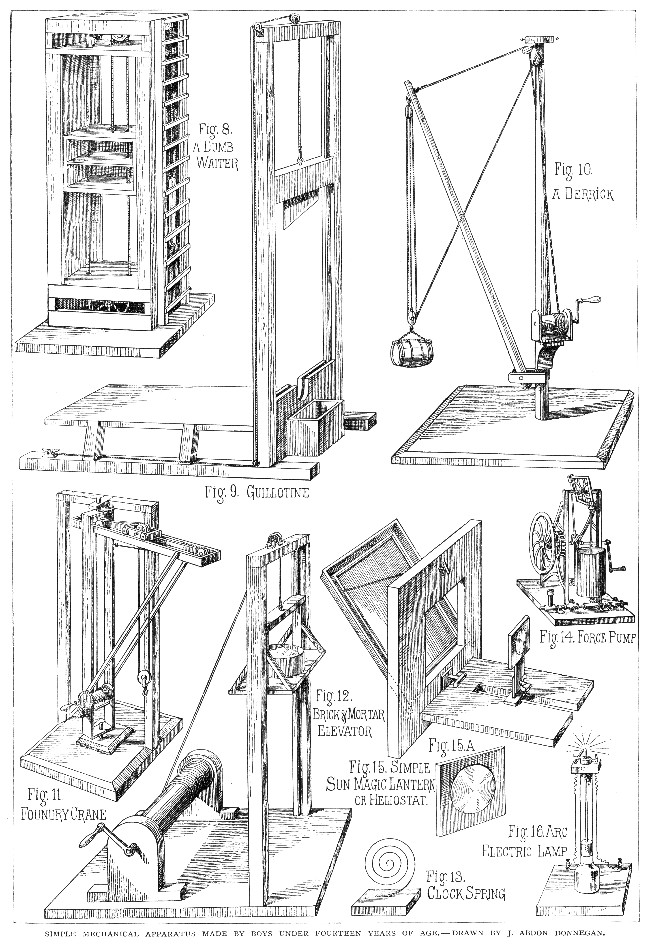 SIMPLE MECHANICAL APPARATUS MADE BY BOYS UNDER FOURTEEN
YEARS OF AGE.—DRAWN BY J. ABDON DONNEGAN.
SIMPLE MECHANICAL APPARATUS MADE BY BOYS UNDER FOURTEEN
YEARS OF AGE.—DRAWN BY J. ABDON DONNEGAN.
By the removal of one pane of glass from a window facing south, the apparatus shown in Figure 15 may be used, like a magic lantern, to project transparencies, in a darkened room.
A pine board, fourteen inches square and one inch in thickness, has an opening in the middle to receive a wooden frame seven inches square, holding a six-inch cosmorama lens, having a focus of eighteen inches. A three-inch plano-convex lens having a focus of nine inches, mounted in a wooden frame, slides along a slit or opening in a board hinged to the inner side of the board which is cleated to the window.
A plate-glass mirror, eight by fifteen inches in size, is secured to a board hinged to a wooden rod, which can be turned from the inside, and is raised and lowered by a cord winding on a key. The mirror is lowered and inclined until the sunlight is reflected through the lenses, and then a circle of intense light, from ten to fifteen feet in diameter appears on the wall or screen. Both lenses will not cost more than two dollars, and the apparatus will most impressively illustrate experiments in light and sound.
An easily made electric lamp is shown by Figure 16. An Argand chimney is fastened to a wooden base, with the cement known as "Stratena," and partly filled with water. A cork coated with paraffine is placed inside the chimney, and a rod of carbon twelve inches long and one-sixteenth of an inch in thickness being inserted in the cork, the upward pressure of the water on the cork causes the end of the carbon rod to come in slight contact with a thick rod of carbon which is fastened obliquely to a square piece of wood, cemented near the top of the chimney. A brass chip fastened to the wood keeps the thin rod of carbon in position, and when two copper wires connect the carbons with six to ten jars of a bichromate battery, a light appears where the two carbons meet. As the thin rod wastes away, the cork rises and keeps the end of the rod almost in contact with the other carbon point.
An ambition to creditably make a mechanical contrivance or apparatus is noticeably characteristic of many boys. The construction of an aquarium, a sailboat, or a telescope, or some similar object, is of absorbing interest to such lads; and the making of the electrical apparatus of straws, sealing-wax, etcetera, once described by Professor Tyndall, has merely tasked the ingenuity of thinking boys to improve upon the apparatus.
Many educators maintain that manual training of a pleasant character, adapted to the age of the pupils, should form an essential element in the education of boys and girls, and should be placed on a par with the regular studies. There is no doubt that such instruction stimulates ambition and tends to develop taste, skill, and natural invention. At the same time an insight into mechanical occupations, with some practical experience in the handling of tools, may assist a boy in choosing a calling suited to his taste, and better prepare him to enter some practical industry, if his choice should incline toward such an occupation.
A few years ago, manual training in modeling, wood-carving, carpentry, forge-work, and other branches, was introduced into a technical course in the College of the City of New York, in East Twenty-third street. To-day it is one of the most interesting features of the College work, and is highly appreciated by the students. Private schools in this city, as also some of the public and private schools of Boston and Philadelphia, have introduced the workshop into their methods of instruction, and devote a few hours in each week to practical and manual labor.
The models illustrated in this article represent many well spent and helpful hours of recreation, and other boys may find pleasure and profit in making similar use of their leisure time and their powers of handicraft.
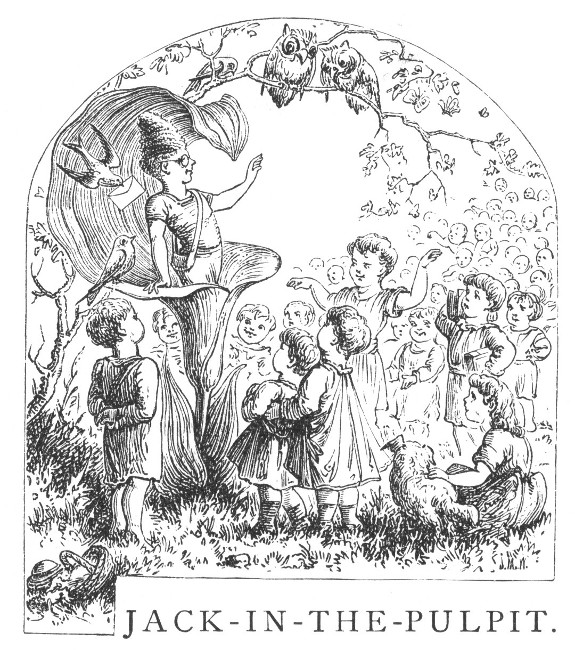
Now and then somebody writes out the very thoughts of the birds; and then again, others tell me very prettily just what they think ought to be felt by the tuneful-minded little creatures. Here, for instance, comes this scrap of verse from my friend Emily A. Braddock that I hope not only you children, but all of my birds will hear. I don't allude so much to the sparrows and such stay-at-homes as to my migratory, or go-away birds. I'm sure they'd be delighted at a poet's way of putting things. It will give them something to go for. As for myself, I've not started yet, so we'll proceed to discuss a certain odd saying for which it seems the world is indebted to one sort of these migratory birds:
This expression, the Little School-ma'am says, is a corruption of an old-fashioned saying that originated in the early days of this country.
As most of you know, wild geese, when they migrate in autumn, form themselves into lines shaped like the letter V, the leader flying at the point, the two lines following; and as they sail away, far above the trees, and beyond all danger from guns—on those cold mornings when the air is clear, and the sky beautifully blue—they seem full of glee, and join in a chorus, "Honk, honk, honk!"
Any one who has heard those curiously sounding notes, the Little School-ma'am says, never could mistake them for anything else. And the folks on the earth below who heard the birds' wild call, in old times, realized the happiness of the winged creatures in being so high and safe. And so it became quite natural, when two persons met each other under peculiarly favorable circumstances for this or that enterprise, for them to say: "Everything is lovely and the goose honks high!"
Before we leave our dear birds, moreover, I have a special message for you this month in their behalf:
"You must not forget, friend Jack," says the Deacon, "to give the boys and girls, especially the girls, my May-time sermon about the Audubon Society."
Forget it? Not I, indeed! Nor would you, if you could have seen the honest and hearty indignation of the good Deacon and the Little School-ma'am, as he read to her a printed circular telling all about the monstrous wrong which the Audubon Society has nobly begun to fight. You must know, dear girls, that this "monstrous wrong" is the custom of wearing feathers and skins of birds on your hats and dresses. As I am an honest Jack, I don't see how girls and their mammas, who, as everybody knows, are supposed to have hearts more tender than men or boys, could ever have been induced to follow so abominable a fashion. "Abominable" is rather a strong word, I suppose; but it is the very one which the good Deacon used when he read the printed slip. And the Little School-ma'am—bless her!—actually gave a nod of satisfaction when she heard it. As for me, no word would be too strong to express my feelings on the subject.
But I'll be content now with giving you what the Deacon calls "two plain facts" about this fashion, and letting them speak for themselves. "You must know then," says the Deacon, "that a single collector of ornamental feathers in this country has declared that he handles every year about thirty thousand bird-skins, almost all of which are used for millinery purposes; and that another man collected from the shooters in one small district within four months, about seventy thousand birds!
"Now, Jack," adds the Deacon, "tell your young hearers to ask themselves and their parents, whether this slaughter shall continue? The Audubon Society says 'no!' Its membership is free to every one who is willing to lend a helping hand to its objects. And its objects are to prevent as far as possible, first, the killing of any wild birds not used for food; second, the destruction of nests or eggs of wild birds; and third, the wearing of feathers as ornaments or trimmings for dress. And[Pg 553] certainly women and girls can do much, in fact everything, for this third object."
All the older readers of St. Nicholas will remember the army of bird-defenders which it established years ago. The Deacon says that there is a call for a new army, and all that you need do to join it, my girls, is to refuse to wear feathers on your hats or dresses. If all the women and girls who now follow that cruel fashion would but abandon it, the needless slaughter of the birds would soon be at an end.
"Felixstow," Brightwood (near Washington).
Dear Jack-in-the-Pulpit: I am a little boy just six years old. I live in the country about six miles from Washington. I am very much interested in reading "Little Lord Fauntleroy," because Mrs. Burnett, the lady who wrote it, was out at our house last spring, and told us the story, and I want to see if she changed it before she put it in the book. I tell you, her own little boys, Lionel and Vivian, are nice fellows to play with! I have a nice pony named Joe, lots of chickens, a dog, and two cats, but I like digging in the ground most. I raised a lot of pop-corn last year. Somebody is writing this for me, but I am telling him what to write. My little brother Paul bothers me considerably when I want to make things.
Good bye, dear Jack; you are a nice fellow. Your friend,
Felix Renouf Holt.
"Felix is not alone," says the Little School-ma'am, "in his admiration for Little Lord Fauntleroy. The children of the Red School House all are charmed with his lordship, and for myself I consider him one of the very sweetest and noblest little boys in English literature."
According to my friend, Ernest Ingersoll, a large proportion of the red coral used by jewelers in making ornaments comes from the Mediterranean coast of Algeria, where it is gathered chiefly by an ingenious machine. Nets, the meshes of which are loose, are hung on the bars of a cross, and dragged at the bottom of the sea among the nooks and crevices of the rocks. These nets, winding about the branches of the coralline growth, break off its branches, which adhere to the meshes. When he thinks it is laden, the fisherman draws the net to the surface and helps himself to the coral. This is sold in various markets, and afterward worked into ornaments, necklaces, bracelets, and other pretty articles for girls and their mammas.
Reading, Mass.,
Dear Jack-in-the-Pulpit: I read in the February number about the bottled fish. I think it is very queer. In "Grimm's Fairy Tales" there is a story about a fox that crept into a hole where there was something to eat. After he ate it he grew so fat that he could not get out, and he stayed there till the farmer found him and killed him. I suppose it was the same way with the fish, only he fed on oysters, and as I think there are no farmers at the bottom of the sea, he stayed there till he was drawn up. If I had been that fish, I would have starved myself till I was thin enough to get out. I have taken St. Nicholas since I was two years old, and my mamma says she brought me up on it, so you see I have been well brought up.
I remain yours truly,
E. S. K. Packard.
You are to be told in this month's St. Nicholas, I hear, about a curious "lace-leaf," a "vegetable necktie," and a "caricature plant." If so, this is a good time for me to show you a curiosity called the newspaper plant, which the Little School-ma'am described the other day to the young folk of the Red School House.
It seems that in certain far-away countries called New Mexico and Arizona, there are great tracts of desolate desert lands, where the very hills seem destitute of life and beauty, and where the earth is shriveled from centuries of terrible heat. And in these desert-tracts grow a curious, misshapen, grotesque and twisted plant that seems more like a goblin tree than a real one.
Of all the trees in the world, you would imagine this to be the most outcast and worthless—so meager a living does it obtain from the waste of sand and gravel in which it grows. And yet this goblin tree is now being sought after and utilized in one of the world's greatest industries—an industry that affects the daily needs of civilization, and is of especial importance to every girl and boy who reads the pages of St. Nicholas.
Those wise folk, the botanists, call our goblin tree by its odd Indian name of the "Yucca" palm.
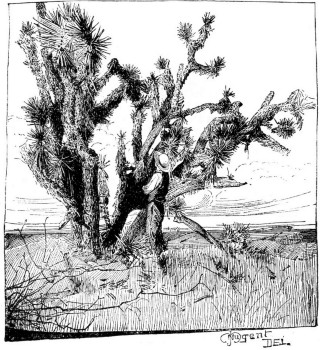 THE YUCCA PALM.
THE YUCCA PALM.
This plant of the desert for a long time was considered valueless. But not long ago it was discovered that the fiber of the Yucca could be made into an excellent paper.[E] And now one of the great English dailies, the London Telegraph, is printed upon paper made from this goblin tree. Indeed, the Telegraph has purchased a large plantation in Arizona, merely for the purpose of cultivating this tree, and manufacturing paper from it. So, you see, the Yucca is now a newspaper plant.
Dear Jack: As you have told us so much about living barometers, I want to tell you that I have one. Mine is a red squirrel. Just before a "cold snap" she will be surly and sleepy. When she is angry, she will spread her lower teeth apart. She will play like a kitten. I call her Gipsy, and she is my chief pet.
Your constant reader,
M. M. M.
[E] For an article describing the manufacture of paper, see St. Nicholas for August, 1884, page 808.
In a note which accompanied the article in our present number, "When Shakspere was a Boy," Miss Kingsley desires us to state that she owes much valuable information about charms (mentioned on page 488), and also about Shaksperean games and customs, to Mr. Richard Savage, of the Shakspere Birthplace Museum, Stratford-on-Avon.
In his story of "The Great Snow-ball Fight," printed in our March number, Mr. Barnard showed how some boys put out the fire in the Widow Lawson's house, by snow-balling it. This may have appeared to some readers almost impossible, but it was based upon an actual occurrence. And an instance of that mode of at least preventing a fire, was recorded in the New York papers of February 11th. It appears in an account of the burning of the stables of the Meadow Brook Hunt Club, at Hempstead, Long Island. "No modern appliance for extinguishing fire was at hand," says one journal, "but there was plenty of snow, and this was banked up about the adjoining stables, and undoubtedly saved them from being burned. Whenever sparks from the burning building fell on the adjacent barns, they were quickly extinguished by well-directed snow-balls thrown upon them."
Concord, N. H.
Dear St. Nicholas: Lena and I play dolls very often, but the latest game we play is throwing cards into a hat placed on the floor about six feet away. Lena put in thirty-two out of fifty-two. If you have room enough to print this in your Letter-box, I should like to read it.
Yours truly,
Ruth A. M.
That is a very nice game, Ruth, although six feet seems a long distance for a small girl to toss the cards. We have seen grown folk try the game at four feet, and then several of them could not put one in twenty into the hat; so Lena's score of thirty-two out of fifty-two is a fine one. The game can be played with any kind of cards, and with sides or by individuals. The largest number of cards thrown into the hat, either by one person or by a side, makes the winning score. If played by sides, not more than twenty cards should be used, and each side should play five rounds, thus making one hundred the highest possible score for any player.
Middletown, Conn.
Dear St. Nicholas: I am anxious to have the March number come, so that I can see how Little Lord Fauntleroy's grandfather treats him. That serial story I enjoy very much. I go to a private girls' school in the morning, and study German in the afternoon with my mother.
With much love I am your faithful reader,
Helen W. A.
Providence, R. I.
DEAR ST. NICHOLAS: This is the first time that I have written to you.
I have a funny story to tell about a mouse. My canary bird used to hang up in our nursery-window on a chain. Sometimes in the evening or night, we would hear mice running around, and in the morning we would find that some of the seed was gone. Mamma thought it was a mouse, but we did not think so. Papa had been trying to catch them in a trap, but did not catch many. We then thought that we would try another way. So Papa took the cage down and put a pail of water on the chain, and when the little mouse went up the chain, as he used to do, instead of going in the cage, he went in the pail of water and was drowned. This is a true story. I am eleven years old. Good-bye.
am your constant reader,
B. G. H.
Carrington, Dakota.
Dear St. Nicholas: You do not know me at all, but I know you and love you so much! When you were brought to me this morning I almost kissed your bright face for joy. It was stormy this morning, and I was tired playing with kitty; besides that I had been waiting so long to read some more about Little Lord Fauntleroy! He is such a brave, wise little boy! Will you ask Mrs. Burnett to please not make him unhappy with his grandfather? Ever since we had our Christmas entertainment, I have wanted to tell you about it, but have been too sick to write you. We called it "An Evening with Mother Goose and the Brownies." Yes,—we had all the cute little boys in Carrington dressed up like Brownies. They did mischief very nicely, all quietly in their stocking-feet. While Mother Goose was singing her melodies, they came and stole away her goose, and they pelted Mother Hubbard with paper balls when she sang that song in the St. Nicholas: "I had an Educated Pug." In the tableaux, they tripped up Jack and Jill, upset Blue-beard, stole Jack Horner's plum, overturned the bachelor's wheelbarrow, little wife and all, let the spider down from a tree on little Miss Muffett, and tied Bo-peep's sheep-tails to a tree, and woke her up with their baa's. Then we had "The House that Jack built," just like it is in the St. Nicholas, for Nov. 1883. It was just splendid, and so funny; but when the rat was to come out of "The House that Jack built," the cat had put his foot on the string and it broke, so the cat couldn't come out. Then the maiden all forlorn picked up the rat, threw it at the cat, and everybody just roared!
I am nine years old, and my name is,
Theodora C.
New Hartford, Iowa.
Dear St. Nicholas: I believe the little girls that take the St. Nicholas will like to hear about my numerous paper dolls. I have a whole town of them, and they all have their names written on their backs. I was so interested in "The Firm of Big Brain, Little Brain & Co." After I read it, I kept thinking what my "Big Brain" was telegraphing. Well, my big brain telegraphs to my hand, that if it writes any more, the letter will be too long to print. So good-bye. I am
One of your many friends,
Grace C.
Woodland, Cal.
Dear St. Nicholas: I think you are the nicest magazine in the whole world. I think "Little Lord Fauntleroy" is a beautiful story. It seems so real. Cedric reminds me of my little cousin Birdie (that is his pet name). One day his aunt (who is an artist) asked him if he did not want her to paint him. He said: "I had rather be as I are." He is nearly four years old. I live on a vineyard of 160 acres.
Your faithful reader,
Lillian H.
Fort Assinaboine, Mon.
Dear St. Nicholas: I commenced taking your paper five months ago, and I think "Little Lord Fauntleroy" is the best story I ever read.
We have plenty of skating here, and fifty ponies to ride.
Another boy is writing a letter to you too. We live 200 miles from Helena and we have to go in a stage or wait till the river opens.
We only have to go to school in the morning, and we play all the rest of the day.
Yours truly,
S. F. P.
Brooklyn, N. Y., 1886.
Dear St. Nicholas: I thought that I would send you a letter at last. I will tell you about our washwoman and me. I have something the matter with my knee, and so I have to stay in the house. Well, our washwoman and I were having some fun. I was at the back parlor window, and the washwoman was down in the back yard hanging up the clothes, and I got a snow-ball and threw it at her, and you ought to have seen her! She looked up and down and could not see anybody, and after a while she saw me, and then, the way she looked! She said: "I will give it to you!"
Yours truly,
Frank T.
Everett, Mass.
Dear St. Nicholas: I have taken you for a year and I could not do without you. Every month you gladden our home with your beautiful pictures, interesting stories, and pretty bits of poetry.
I think "Little Lord Fauntleroy" is a splendid story. I must not forget to mention the "Brownies." What busy little workers they are! I have one pet, a beautiful linnet. Her name is Daisy. She is a very sweet singer.
I remain, your constant reader,
May F.
Kingston, Indiana.
Dear St. Nicholas: I do not see many letters from Indiana in your Letter-box. I would not do without you for ten dollars a year.
I like your Natural History. I have several books on Natural History.
Last year I wanted you so badly that Papa said I must earn the money myself. I had enough, lacking fifty cents. We had an oyster supper here, and papa gave me fifty cents to spend; so I did without oysters and took you. I am thirteen years old.
Yours sincerely,
Art. R.
Mt. Auburn, Cincinnati, O.
Dear St. Nicholas: I like your stories very much. I am a boy seven years old. I do not go to school, but Mamma teaches me with two little girls. I had a lovely Christmas. I got a locomotive, a sword, a scarf, a marble game, a rolling-pin, a box to keep my pens and pencils in, and some cards and books for Christmas. I think you are the best book I ever read. This is the first year I began to take you. I like the "Brownies" best. Tell Mr. Palmer Cox to put "Brownies" in every St. Nicholas. Please don't forget to print my letter, for I have written it all myself, and spelled it without any help.
I had two kittys, and their names were Mitten and Topsy. We gave away Mitten and kept Topsy, but after a while we lost Topsy, and then we found another kitty, but she ran away. I am sorry they went away, for I love kittys. Good-bye, dear St. Nicholas, I am so glad it is most time for you to come again. Please don't forget to print my letter, for I love you so much!
Your loving friend,
Ralph B. R.
Lewisburg, W. Va.
Dear St. Nicholas: I have just finished reading the February number, and I think that "Little Lord Fauntleroy" and "George Washington" are splendid! I am a little girl ten years old. Have taken you for four years.
I have ever so many uncles and aunts. One of my aunts sends you to me.
Your loving reader,
Dottie M.
Wyoming, Del.
Dear St. Nicholas: I have never written to you before, but I love to read the letters others have sent you. You have been coming to our house nearly three years, and we all look anxiously for the 26th of the month, when you are due. You are my own book. I pay for you with money I have earned myself. My little sister wonders whenever she sees St. Nicholas what the Brownies are doing in it. Mamma is much interested in "Little Lord Fauntleroy," and we like it too, and all the rest of your stories, but especially "The Gilded Boy of Florence," because we know the man who wrote it and have heard him preach. He says all he wrote in that story is true. Good-bye.
Ever your faithful reader,
C. Lizzie B.
London, England.
Dear St. Nicholas: I am an American girl who left New York four years ago, during which time I have been a constant reader of St. Nicholas. My school friends who read English all want it also. You have been forwarded to me from London as far as Turkey and Egypt. And so, if you can only spare a few minutes, I would like to tell you about the pyramids and the sphinx.
From Shepherd's Hotel, Cairo, it is a beautiful drive of seven miles through an archway of large trees by the side of the Nile. There are several pyramids. The chief one is said to be 463 feet high, and one would think the top would be very small; but you will no doubt be surprised to hear that the Khedive gave a dinner to twenty-four guests upon the top of a pyramid. The dinner was served in the usual manner by Arab waiters; the gentlemen walked up, while the ladies were carried up in chairs. The pyramids are built like stairs,—one stone on top the other, with only an edge for a foothold.
Many tourists try to climb the structure, which is very fatiguing work. We gave an expert Arab fifty cents to do it in ten minutes; he went up in six minutes and down in four minutes. From the pyramid to the sphinx is quite a little walk through thick sand; and the Sphinx is so big you can hardly see it all at once. The English soldiers knocked off some of its right hand and all its nose. It is cut from a solid rock and looks as black as iron. The Egyptian postage stamps have pictures of both the pyramid and the sphinx. The temple dedicated to the sphinx lies in ruins here, but the remains are very beautiful, being nearly all of alabaster; and in the cellar they have just discovered an image, which is so immense they can't get it out from the place where it has lain so many hundred years. Some time I will write a letter about the Holy Land, as I lived there two months. I hope you will print my letter; it is my first attempt, and I am fourteen years old. Your March number will find me at Alexandria, for I take the Beyrouth steamer next week. I hope, dear ST. NICHOLAS, your Egyptian friend has not tired you, and I also hope this may find a place in your Letter-box.
Your loving Egyptian friend,
Maud Stanley F.
Mohegan Lake, N. Y.
Dear St. Nicholas: I send you this letter, a true story about a fish-hawk.
It was in the middle of April, 1883. A man who was rowing on one of those lakes east of the Highlands, in the northern part of Westchester County, espied a large fish-hawk sitting on a dead limb near the water. The man, having his gun with him, rowed over toward the hawk, and when in range fired at him flying. The wounded bird fell, hit on the outer joint of the left wing. With the help of his companion the man managed to bring him home. In less than a week, the boy of the house fed him with fish out of his own hands, and the hawk did not attempt to claw him. One day the boy wanted to see how many pounds of fish the hawk would eat. He caught seven suckers weighing a pound and a half each. The hawk ate six, one after another, and took the seventh, but refused to eat it until half an hour afterward. What an enormous appetite he had! Later on in the summer, the boy would take him to the water to wash. He did it just as a canary does in his china bath. The boy would take him and put him on the side of the boat and row him around, and the hawk would sit there, taking in everything, as well as the summer visitors, who were taking him in. The hawk was so tame that his keeper could smooth his head and chuck him under his beak and the hawk would only flop his wings and whistle when the boy turned, as though delighted with what the boy did. This creature measured five feet eleven inches from tip to tip of the wings, and came to his death in October of the same year, by getting caught in the string by which he was fastened, greatly to the sorrow of his keeper who cared for him. The bird is now stuffed and in a friend's room in New York City.
Yours truly,
S. F. K. E. G.
Cincinnati, O.
Dear St. Nicholas: I thought I would write to you to say what so many of the other girls and boys who take you have already said: "That I love every one of your stories and can hardly wait until the 25th of the month comes, to read you." I have taken you two years and would not be without you one single month. I live in the dirty city of Cincinnati, but I have a great deal of fun any way.
We have had two snowstorms this winter, but by the time the snow has lain on the ground three or four days it is so black that I actually believe that people who come from the country would not know it was snow unless they were told.
I will now close, hoping to have the pleasure of seeing this letter printed.
I remain, your constant reader,
Grace S. C.
P. S. I forgot to say I was thirteen years old and have a brother nine years old, who thinks the St. Nicholas "a dandy," as he expresses it.
More About Curve-pitching.
Lincoln Co., Neb.
Dear St. Nicholas: The two letters in the February number on "curve-pitching," I was very glad to see. It was during my college-days that the "curve" made its appearance, and it was for some time a matter of much interesting discussion among us. I was not much of a base-ball man, but I saw a good deal of curve-pitching, and occasionally threw some rather wild "curves" myself in an amateurish way. We budding physicists discussed the why and wherefore of the problem, but never arrived at any satisfactory solution. The same explanation which is given in the second letter of your February number suggested itself to me at the time, and I was quite satisfied with it until I discovered that it did not accord with the facts of the case. It is a beautiful theory, but, like some other theories, it doesn't work.
According to the theory, as shown by your correspondent, the ball rotating (as indicated by his diagram which he gives), against the hands of the watch should curve to the right, producing the in curve. But the fact is, that a ball so rotating will curve to the left—the out curve. And a ball rotating in a contrary direction, i. e., so that points on its forward side are moving to the right, will curve to the right—the in curve. In both cases the axis of rotation is vertical, so that the motions of the ball may be well illustrated by a spinning-top, as is shown in the first letter by A. D. S. But the case of a rifle-ball in motion does not seem to me to be parallel with that of a base-ball under normal conditions. A rifle-ball is given a rotation about an axis parallel to and coincident with its line of flight, just as an arrow rotates on its shaft. Now, none of the curves of a base-ball are produced with the axis of rotation in this[Pg 556] position. In the in and out curves, as already said, the axis of rotation is vertical; while the rise and drop are produced by rotating the ball about a horizontal axis perpendicular to the line of flight. In all cases the axis of rotation must be at right angles to the line of flight, and the more accurately this condition is complied with, the more marked the effect. My knowledge of the subject is too slight to warrant me in asserting that the curving of the rifle-ball and that of the base-ball do not depend on the same principle, but it does not seem to me that the two are identical, for the above reasons.
I have no theory to offer, but trust that among the readers of St. Nicholas some may be found who have penetrated to the "true inwardness" of this interesting problem, and will give us a complete and scientific explanation of it.
Yours truly,
H. H. H.
Beverly, Ohio.
Dear St. Nicholas: I have read with considerable interest the letters in St. Nicholas for February concerning curve-pitching. I am a boy who takes great interest in base-ball, and have many times pitched curves. I have seen persons, and see them yet, who firmly maintain that a ball cannot be curved, even when they have ocular demonstration of the fact. But that has nothing to do with what I have to say. I have studied the diagram of my anonymous friend, and am convinced that he is exactly wrong. With the following diagrams I shall show which way a ball curves with a given rotation, and give my theory of the curve:

Suppose, as in the letter published, the ball moves one hundred feet per second, and revolves so that the equator moves around at the same rate. Then, in the first diagram, the friction at B is greatest, and at D is 0. But instead of curving as my anonymous friend demonstrates, it will curve in exactly the opposite direction; namely, in the same direction in which it rotates.
I have appended diagram 2, simply to show the curve where the friction is 0 at B and greatest at D. Then it will curve as indicated.
I have a short theory, namely: In the first diagram, the more rapid movement of B compresses the air on that side, while at D it is in its normal state. Hence the pressure at B more than counterbalances that at D, and, as it were, shoves the ball in the direction of the side D, thus producing the curve. In the 2d diagram, the letters B and D interchange in the theory. I would like to hear more about this subject.
Very respectfully yours,
F. C. J.
Birmingham, Mich.
Dear St. Nicholas: I have read with great interest the articles in the October, December, and February numbers, about curve-pitching. I have had quite a good deal of experience in the "one,-two,-three,-and-out" line myself, and have also, for the last two or three years, been able to make others have the same experience, by putting them out, in the same way. Therefore, I venture a reply to the explanation in the February number, backing my statement by the experience of many eminent curve-pitchers, and also by the story in the October number of "How Science Won the Game."

The above diagram is the same as your correspondent uses, and he asserts that the point B is moving faster than D; consequently, there is more friction at B, whence B is retarded more than D, and so the ball will curve toward W in the path of the dotted line. Now, if he will look in the story of "How Science Won the Game," where the base-ball editor shows the boys how to hold and how to throw the ball to make the different curves, he will find that when he throws the ball so that it whirls as shown in diagram, it will curve toward P, a direction entirely opposite from the one he designates. And any curve-pitcher will tell him the same. When I first read his explanation, I thought it was all right, for it looks quite reasonable, but upon second thoughts, I saw it was wrong, and to make sure, I took a ball and tried it. The only way I can get around his explanation (aside from actual fact) is this: The point B, as he clearly shows, is moving faster than D, and so the ball, if the friction of the air is taken away, will naturally curve toward the side D or point P. Now, the question is, Will the friction of the air be enough greater on the side B to overcome the difference in the motions of the two sides? If it is, the ball must move in a straight line, but as it curves toward the side D, we must conclude that it is not, and that the friction of the air tends more to hinder than to help the ball to curve. I really believe that if it could be tried, a person could make a ball curve in a vacuum more easily than we can make it curve in the air. Trusting to hear more upon this subject, I remain, sincerely yours,
"A Curver."
Fremont, Neb.
Dear St. Nicholas: I have never written to you before, but I think perhaps you will publish this one letter. I hope you will publish it, as I have never yet had anything of mine published.
I like the story entitled, "How Science Won the Game." Although I am but thirteen years old I think I can pitch a curve. I go to the Fremont Normal School and like it very much.
I am going to have the 1884 and 1885 St. Nicholas bound next week. I think you have a very entertaining magazine, and I think the pictures are very nice. I have the magazine for a Christmas present every year. I have taken St. Nicholas three years and I hope I may always take it.
Papa says he doesn't think you will publish this, but I think you will.
Yours truly,
Eddie H. B.
Ayer, Mass.
Dear St. Nicholas: As so many of your readers have written to you, I thought I would write too, that I might have the pleasure of seeing my letter in print.
I have taken you a year and have fallen greatly in love with your delightful pages.
I think "How Science Won the Game" is a lovely story; I felt much interested in it, for last summer the girls of my age who lived here got up a base-ball nine. In time, we played very nicely and enjoyed the fun. The readers of the Letter-box may think this a funny game for girls to play, but we liked it and found it very good exercise.
I am fifteen years old; I have a little dog, his name is Teddie; he is a very good little dog, but I pity the cat that gets in his way.
I like to read "From Bach to Wagner," as I enjoy reading of different composers.
Your true reader,
Ruth F.
We heartily thank the young friends whose names here follow, for pleasant letters received from them: Kate Ethel C., John Myers, Sadie B. Crane, G. M. F., Jamie H., Walter J. Cohen, Stuart L. Martin, George Williams, Eddie L. Goodman, Violette T. Haines, Lillie M. Grubbs, Freda Nicolai, Eva Wilkins, Miriam Ferry, Hortie O'Meara, Anna Ross, Clara Louise Whitney, Constance and Richard Bigelow, E. R. B., J. H. B., Mary and Gussie, Jessie Hiltner, Alberta Stout, Willis Dunning, Nellie E. Stebbins, Marion R. Brown, A. W. Smith, Josie and May, Kate G., Hallie H. Haines, Johnny B. S., Daisy, Gertie Beidler, Mary M. C., Charles L. Baldwin, Kitty Clover, Alice Olney, Emil Harrington, Katie M. Cathcart, Arthur F. B., Agnes Hanks, Elizabeth K. Stewart, Wade W. Thayer, Brooks Upham, Rosalie, Mamie Eells, Florence Lanty, Frank Dearstyne, Vera Wheeler, Nellie McN. Suydam, Elizabeth B. Grumball, Ida Cameron, Ethel Marion Walker, Fawn Evans, Alfa P. Tyrrell, H. and A. V. P., G. P. S., Clara Moore, F. W. S., Portia, Nellie T., Eva R., Norine, Anna M. Lister, Blanche E. Ives, Mary Hicks, "Dolly Varden," Nora T. C., Natie P. Thompson, Daniel McPhail, Mary E. Seavey, Storrs E. E., H. C. J., Edith B., Kittie E. Fogarty, Frank Carman, Ruth A., C. H. M., Richard D. Bennett, Anne Grey Millett, Addie Rockwell, Laura Smith, Paula Goetz, Katie S. Denholm, Carl M. Ruhlen, Thomas McKeone, W. C. T., Marion Loomis, Alice E. Bogert, Gertrude E. S., Julian Granbery, B. M. S., Edward P. Irwin, "The Five Friends," T. L., Kate B. Tilley, Irene S. Duer, Violet Scath, Florence M. Wickes, E. W. B., May Delany, and Bertha Sweet.
Our attention has been called to the fact that heretofore we have sent to our Chapters no charters, or certificates, suitable for framing.
To remedy this deficiency, we have engaged one of the leading firms of New-York City to design a very beautiful A. A. Charter, to be handsomely engraved on bond or parchment paper. The size of the charter will be about 12 × 18 inches or larger.
At the top is drawn an open St. Nicholas, showing on one page Prof. Agassiz's portrait, and on the other, representations of the animal and vegetable kingdoms.
Above the magazine is our badge, the Swiss Cross; and below is the motto, Per Naturam ad Deum. Then follows the certificate proper, handsomely ornamented, bearing the name of the founder of the Chapter, the name, number, and letter of the same, and signed with the autograph of the President of the A. A. Of course the first two hundred impressions—or artist's proofs—are the finest. Many members are so pleased with them that they wish to secure copies for their individual possession.
None of the courses of study we have ever had the pleasure of offering to our friends, has had the magnificent success which is attending Prof. Crosby's class in mineralogy. At this writing no less than eighty-nine pupils are enrolled, and as Chapters usually take the course through one representative, this number doubtless means that at the least five hundred persons are learning how to observe and describe minerals, under most competent instruction. To each pupil is sent a set of thirty valuable specimens, and all exercises are corrected and returned for revision. Geographically, the class extends from Washington Territory to England.
We have to begin again this month, as last, by presenting the excellent reports of dilatory Chapters. A little more promptness hereafter, good secretaries, if you please!
37, Kingsboro, N. Y. By some mischance, your card notifying me that our report is due has just come to my notice, and I hasten to write, fearing our "candlestick may be removed." Last week three of us visited a gold-mine and brought home specimens of rock from which gold is obtained, averaging about twenty dollars per ton. The rock is dark, fine-grained, and resembles lime-stone. It effervesces with acid. We have here beautiful specimens of the Azoic rocks, and we could make up named collections to exchange for other specimens.—W. W. Thomas, Box 711.
112, So. Boston. We number ten active and three honorary members. During the year we have held twenty-two meetings, with an average attendance of eight. In January we gave an entertainment, and realized $10.80. In April we endeavored to establish an assembly of the Chapters in this part of the State, but did not succeed.
During the year we have studied chemistry, zoölogy, and astronomy. At one time we visited the Agassiz museum in a body, and learned a great deal. Having seen now what we can do, I think we shall all study harder during the coming year.—Geo. L. Whitehouse, 37 Gates street.
[Don't be discouraged; we shall have a State Assembly in Massachusetts before many years.]
134, De Pere, Wis. We have eighteen members. Our room is beginning to look very nicely. We added five new cases last fall. We have 1600 geological specimens,—including 1000 fossils,—600 minerals, 50 birds, 500 plants, 400 shells, and 100 ethnological specimens.—A. S. Gilbert.
153, Chicago (E). At the Exposition here last fall, we had two large cases, one containing minerals, the other fossils, which compared favorably with any in the building, and did much toward making our society known to the throng of visitors. We have added new books to our library at no small expense. Our "Paper" is the latest addition to our meetings, and contains original articles, clippings, and the letters received.—Charles T. Mixer.
164, Jackson, Mich. (B). We have eight members, and expect more soon. We all have natural histories of our own. We meet once a week, on Monday evening. We had a very pleasant field-meeting by Clark's Lake. All our members are interested.—James C. Wood.
168, Buffalo (C). During the summer there were some excursions, which brought a number of specimens into the hands of our curator. With the new year fresh courage has inspired most of us. Our prospects are quite bright. We still have our standing committees in each department, and these have a report to make nearly every week. Every two weeks we have an essay. Our next topic is to be "Forests and their Utility." Besides this and the reading and discussion of scientific essays, we have our weekly report on the current scientific news, and notes and personal observations. Chapter K of this city has joined us, and Chapter I thinks of following the example of Chapter K.—Sophie Finkenstaedt.
187, Albany, N. Y. (A). We have found time for occasional meeting among the heavy requirements of school-life; and as for myself, I find our own back-yard a bewildering field for exploration. We have ten active and eleven honorary members. Our meetings are held alternate Wednesday evenings at the houses of members, and are always well attended and interesting. At our next meeting—our second anniversary—a special programme is to be carried out. We are to debate the comparative usefulness of astronomy and botany; have an extra number of The Naturalist, our MS. paper; scientific essays, readings and lectures. Albany A has never been more flourishing.—John P. Gavit.
215, Tioga Centre, N. Y. We have been steadily progressing in our department—botany. Last autumn we made asters a specialty, and succeeded in collecting and analyzing fourteen species and two varieties. We are now ready to exchange promptly.—Angie Latimer, Sec.
220, De Pere, Wis. (C.) Chapter C has disbanded. Please scratch our number out.—Jessie R. Jackson.
[But we hope the Chapter will "jump into another bush," so we can "scratch them in again!"]
234, New York, (G). We have joined Chapter 87, New York (B),—F. W. Roos, 335 W. 27th street.
238, Winterset, Iowa. One of our charter members is dead; one is in Oregon; two are away at college; one is in Mississippi. In fact, there is nothing left of our Chapter. I am sorry, for I think the Association work is a very great benefit to the members.—Harry C. Wallace.
[Our correspondent will remember that by our present rules even one active member is allowed to maintain the honor, and retain the number and name of a Chapter once properly organized. We shall be disappointed if we do not meet him on the 24th of next August, at Davenport, Iowa, as the representative of a reorganized and efficient Chapter.]
246, Bethlehem, Pa. We are in a very flourishing condition, and now have fifteen members. Our cabinet is crowded with specimens, all in good condition. We occupy a pleasant room rented by the[Pg 558] Chapter. We shall enter the coming season with undiminished enthusiasm for the study of Nature.
248, Richmond, Va. An informal meeting was held, and twenty-three of us boys were enrolled as members of a Chapter of the A. A. We elected our teacher, Miss Jennie Ellett, President. Committees were appointed to draft by-laws, build cabinets, etc. Instead of forming a new society, Mrs. Marshall has kindly consented to let us reorganize Chapter 248.—W. T. Terry, Sec., 109 E. Grace St.
252, Utica, N. Y. We have a most flourishing Chapter of forty-seven members. In the past year our school building was enlarged, and a room was made purposely to hold our treasures. In it is a cabinet overflowing with minerals, shells, and plants, 3 cases full of lepidoptera, a forty-dollar microscope, and a cabinet, which the boys are trying to fill with microscopical slides of their own manufacture. We have also an aquarium 12 x 24 inches, stocked with fish, newts, snails, turtles, etc., also a bird's egg cabinet that will hold several hundred specimens, and a Wardia case, 36 x 18 inches, which we are now using for hatching chrysalids. At our last meeting a cecropia "came out," measuring over six and a half inches across the wings. Our Chapter is divided into committees, each committee having a teacher for chairman. The committees are expected to furnish each week specimens representing their special branches. Of all the subjects before us the hardest "nut to crack" was, "What is a sea-bean?" but owing to indomitable perseverance, it has been most thoroughly cracked.
[Please send us the kernel!]
Agassiz's birthday was duly celebrated in the woods. Speeches were made, poems recited, and the rest of the day devoted to a grand specimen-hunt. It rained hard all day, but that could not quench the fire in this Chapter, and we returned home loaded down with treasures. We have shells, mica, and lepidoptera for exchange. The Chapter desires to express its deepest gratitude to the founder of the A. A. for two delightful years.—Frances E. Newland, Sec.
[Such a delightful report as the one which we have here condensed, is more than enough to repay one for all the labor connected with the A. A. The debt of gratitude is on the other side.]
254, Fulton, N. Y. We have started a library, and are now studying ornithology. Our membership is reduced to three, but all are active.—Herbert C. Howe.
[If three active-members understand "Reduction Ascending," they will soon reduce the membership to a dozen or more.]
256, Newton, Upper Falls, Mass. The past year has been one of gratifying progress. We number twelve. Our meetings are very interesting, each member giving an account of some object in his branch of study, often illustrating it by the specimen or describing some book he has been reading, or relating some recent personal experience. At the first meeting of each month a paper called Gatherings is read, composed of original records of personal observations. Wishing to bring our Chapter and its work to the knowledge of our friends, we have held a series of socials at the home of one of our members. The first of the evening we have devoted to talks and essays by the members of the Chapter, and later we have played games, and amused ourselves in other ways. We find this plan very beneficial, and have already gained three new members and a present of books.—Mrs. J. M. H. Smith.
[We commend this suggestive report to the earnest attention of every Chapter.]
257, Plantsville, Ct. We have made large additions to our collections. Our library also has been enlarged, and we have now nearly 100 volumes. We decide on the subject for each coming meeting in this way. Each member writes on a ballot the subject he would prefer. The ballots are then shaken in a hat, and the one drawn first is our subject. Moreover, the one whose ballot is successful must furnish a paper on that subject, and all the others bring short items on the same subject. We closed our last meeting by a collation, and singing by our glee club.—A. L. Ely, Box 219.
260, Mercer, Pa. We have not been idle, and have quite a collection. We think every Chapter should keep a scrap-book for entering reports and clippings.—Mrs. H. M. Magoffin.
272, West Town, N. Y.—Most of us are attending school away from home. We therefore disband through the winter, and then reorganize for the summer vacation, and work as much as we can, for we have farm work to do besides. Still we can study as we work, and we do this. Our minerals are all labeled and mounted. We have about 200 birds' eggs, some of them quite rare. We pride ourselves on our insects. I think we have 300, still am not positive. Our botanical specimens number 200. The work we have done, though not very great, has done us a great amount of good.—William Evans, Sec.
Manchester, Vt.
I am extremely anxious to experiment during the coming season with the American silk-producing worms, not for the purpose of producing raw silk, but for other reasons of scientific and practical interest. I wish to learn the best books for giving a knowledge of the habits of Attacus Cecropia, Polyphemus, and the Promethean moths. I shall be glad of any information regarding the best places to find their cocoons. I should like to hear of the experience of others in finding cocoons, and raising the moths. I have M. Trouvelot's papers on the subject, Dr. Garlick's letters on his experiments; also Dr. Stirling's, Prof. Riley's report on Silk Production No. 11, Packard's "Our Common Insects," Sir John Lubbock's "Origin and Metamorphosis of Insects." I should like the addresses of any parties who have cocoons of the said moths to dispose of; and finally, information regarding the success or failure of any who may have tried the experiment of raising the worms.
Very truly yours,
C. F. Orvis.
[Mr. Orvis is a member of the A. A., has been for years engaged in an important manufacturing business, and we trust may obtain from "those who know," all the information he desires.]
Two thousand square-cut post-marks, all different, in a neat book; also 1500 duplicates, for best offer in stone implements.—Laurie H. McNeill, Ch. 902, Mobile, Ala.
Correspondence with amateur egg-collectors desired. Iowa preferred.—Oscar Clute, Jr., Iowa City, Iowa.
American bird-skins and eggs (with data), for English. Also mounted microscopical pathological specimens. Lists exchanged.—Wm. D. Grier, 49 Gloucester St., Boston, Mass.
| No. | Name. | No. of Members. | Address. |
| 941 | Hohokus, N. J. (A) | 4 | Mrs. R. Van Dien, Jr. |
| 942 | Sioux Falls, Dakota (B) | 10 | Percy Edmison. |
| 943 | Sancelito, Cal. (A) | 7 | A. J. Campbell, Box 31, Marin Co. |
| 944 | Buffalo, N. Y. (L) | 12 | Nathan N. Block, 82 Norris Place. |
| 945 | Baltimore, Md. | 4 | Maurice Straus, 225 Linden Ave. |
| 946 | Seneca Falls (B) | 5 | Wm. Hopper. |
| 947 | San Francisco, Cal. (J) | 4 | Miss Alice J. Ellis, 27 So. Park. |
| 948 | Prairie Du Chien, Wis. (A) | 7 | Chas. Chase, Jr. |
| 949 | New York, N. Y. (Z) | 4 | Fred Stanton, 420 W. 61st St. |
| 863 | Providence, R. I. (E) | Frederic Gorham. | |
| 362 | Newport, R. I. (B) | 4 | Thomas Crosby, Jr. |
| 242 | Philadelphia (I) | J. F. Stevens. |
| 746 | Helena, Montana (A) | 8 | Kurt Kleinschmidt, Box 292. |
| 68 | Grand Junction, Iowa | 2 | Miss Sarah I. Smith. |
| 248 | Richmond, Va. (A) | 23 | W. T. Terry, 109 E. Grace St. |
Address all communications for this department to the President of the A. A.,
Mr. Harlan H. Ballard,
Principal of Lenox Academy, Lenox, Mass.
As this number of St. Nicholas goes to press nearly a month earlier than usual, the names of solvers of March puzzles can not appear until the issue of the June number.
An Easter Rebus.
Inverted Pyramid. Across: 1. Depopulated. 2. Nominated. 3. Deluded. 4. Roses. 5. Ten. 6. D.
St. Andrew's Cross of Diamonds. I. 1. B. 2. Dem(and). 3. Dolor. 4. Belgium. 5. Moist. 6. Rut. 7. M. II. 1. M. 2. Ham. 3. Huron. 4. Marston. 5. Motor. 6. Nor. 7. N. III 1. M. 2. Tim. 3. Talon. 4. Million. 5. Moist. 6. Not. 7. N. IV. 1. M. 2. Sam. 3. Sedan. 4. Madison. 5. Mason. 6. Non. 7. N. V. 1. N. 2. Tam. 3. Titus. 4. Natural. 5. Murat. 6. Sat. 7. L.
Word-squares. I. 1. Racer. 2. Agave. 3. Canal. 4. Evade. 5. Relet. II. 1. Cabal. 2. Above. 3. Bobea. 4. Avers. 5. Least. III. 1. Rabid. 2. Abide. 3. Bison. 4. Idols. 5. Dense.
Central Acrostic. Arbor Day. Cross-words: 1. slAin. 2. stRew. 3. saBot. 4. slOop. 5. stRap. 6. seDan. 7. smArt 8. slYly.
Hour-glass. Centrals, April fool. Cross-words: 1. TartArean. 2. reaPers. 3. scRew. 4. vIe. 5. L. 6. aFt. 7. foOls. 8. limOsis. 9. inteLlect.
Connected Double Squares. Upper left-hand square, Across: 1. Houp. 2. Alto. 3. Ties. 4. Host. Upper right-hand square. Across: 1. Pent. 2. Otoe. 3. Suet. 4. Tile. Lower left-hand square, Across: 1. Host. 2. Able. 3. Sour. 4. Hern. Lower right-hand square. Across: 1. Tile. 2. Eden. 3. Read. 4. Naps.
Bagatelle. 1. More haste, less speed. 2. Medicines were not meant to live on. 3. He who hides can find. 4. Pride goeth before a fall. 5. The absent party is always faulty. 6. A crowd is not company. 7. Penny wise, pound foolish. Key-words: haSte, meAnt, hiDes, prIde, paRty, crOwd, peNny.
Central letters, sadiron.
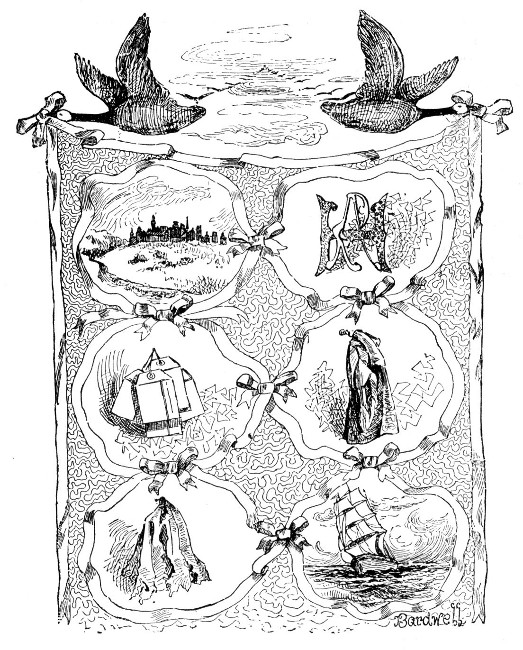
This puzzle is based upon one of the Mother Goose rhymes. The pictures represent the last word of the six lines of the verse. What is the verse?
I am composed of seventy-six letters, and am a quotation from "Love's Labor Lost."
My 63-21-58-31 is elevated. My 28-1-42-35 is headstrong. My 72-45-14-62-25 is on every breakfast table. My 2-19-52 is a fashionable kind of trimming. My 74-40-55-50-22 is a glossy fabric. My 33-9-29-8 was the nationality of Othello. My 38-68-70-17-12-76 is the name of the 67-3-49-61 of one of Shakspere's most celebrated plays. My 6-43-5-26 is location. My 13-75-11-46 is mature. My 30-60-47-54-41 is what often follows a chill. My 53-36-4-24 is a mixture. My 16-39-71-20-66 is used in bread-making. My 37-73-65-7-23-27-69-18-56-51 is an allurement. My 32-57-10-15-64-44-59-34-48 is a school.
HAROLD J. HARDING.
Each of the words described contains the same number of letters; the central letters, transposed, will spell the name of the heroine of one of Sir Walter Scott's novels.
1. Was conspicuous. 2. A hard covering. 3. A citadel. 4. A box for fruit. 5. To ward off. 6. A sudden fright.
AVIS.

Upper Square: 1. To begin. 2. A small drum. 3. Over. 4. Wanders. 5. A lock of hair.
Left-hand Square: 1. A region. 2. A report. 3. Plentiful. 4. Plants of the cabbage family. 5. A lock of hair.
Central Square: 1. A lock of hair. 2. A black bird. 3. To elude. 4. A plant which grows in wet grounds. 5. To scoff.
Right-hand Square: 1. To scoff. 2. Grand. 3. Declined. 4. A mournful poem. 5. To color anew.
Lower Square: 1. To scoff. 2. Mother of pearl. 3. Applause. 4. One of the Muses. 5. To furnish with a new upper part.
"HOMER."
[Pg 560]
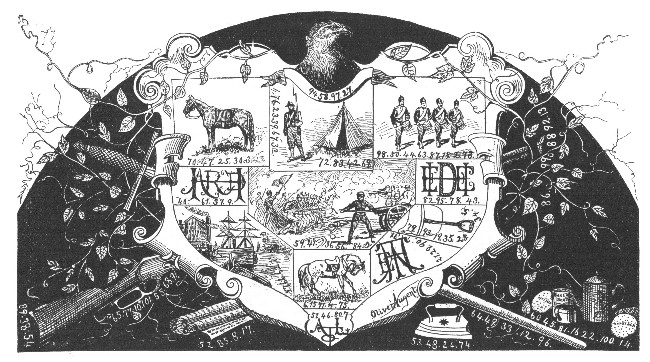
The words forming this numerical enigma are pictured instead of described. The answer, consisting of a hundred and one letters, is a four-line verse by Bayard Taylor.

Across: 1. Pertaining to a monarch. 2. Entering without right. 3. Unmarried women. 4. Unfaithful. Primals, a vapor; centrals, a brown coating; finals, in a smaller degree. Primals, centrals, and finals combined, unsuspicious.
F. L. F.
Across: 1. Measurement. 2. Consumes. 3. A chemical substance. 4. A sheltered place. 5. In pyramid. Downward: 1. In pyramid. 2. Two-thirds of a girl's name. 3. Mankind. 4. Bad. 5. Celebrated. 6. Certain. 7. Wrath. 8. A bone. 9. In inverted.
F. L. F.

I. Upper Square: 1. Pertaining to a certain nymph. 2. A disease peculiar to children. 3. A dwelling-place. 4. The European blackbird. 5. A charm.
II. Left-hand Square: 1. Burned wood. 2. A continued endeavor to gain possession. 3. The inner part. 4. The lesser white heron. 5. A pugilistic encounter.
III. Right-hand Square: 1. An expression of contempt. 2. A small column without base or capital. 3. Parts of shoes. 4. To assign. 5. To squander.
IV. Lower Square: 1. A term used in playing with balls. 2. A sacred vestment. 3. Proper. 4. A fine yellow clay. 5. A measure.
Centrals, reading downward (eleven letters), an architect who builds houses. Centrals, reading across, a mechanical contrivance common in cotton-mills.
"L. LOS REGNI."
Each of the words described contains the same number of letters. The primals will all be of the same letter; the finals will spell a name famous in history.
1. A small shell-fish. 2. An emblem. 3. A common plant having a scarlet blossom. 4. To weaken. 5. A specter. 6. An afternoon nap. 7. A leap. 8. Unassuming. 9. A violent effort. 10. Irony. 11. A channel.
"JUVENTUS."

I. Diamond: 1. In soles. 2. To touch lightly. 3. Satisfies. 4. A beverage. 5. In soles. Included word-square: 1. To touch lightly. 2. Consumed. 3. A beverage.
II. Diamond: 1. In strife. 2. To touch lightly. 3. Much talked of in railway offices. 4. An inclosure. 5. In strife. Included word-square: 1. To touch lightly. 2. A verb. 3. An inclosure.
III. Diamond: 1. In youthful. 2. The cry of a certain animal. 3. A mythical being. 4. Skill. 5. In youthful. Included word-square: 1. The cry of a certain animal. 2. Gaseous substance. 3. Skill.
"ARTHUR PENDENNIS."
The central letters, reading downward, spell the name of a very prominent personage.
Cross-words: 1. Pleasing to the taste. 2. A substance similar to varnish. 3. An imp. 4. The name of a character in "Uncle Tom's Cabin." 5. In decorations. 6. Sick. 7. Resources. 8. To call by the wrong name. 9. Gives too many doses to.
"D. I. VERSITY."
The letters of each of the words described may all be found in the word namer.
1. A girl's name. 2. Close at hand. 3. A cognomen. 4. Surface.
"DENZIL ELINOR."
End of the Project Gutenberg EBook of St. Nicholas Magazine for Boys and
Girls, Vol. 8, May 1886, No. 7., by Various
*** END OF THIS PROJECT GUTENBERG EBOOK ST. NICHOLAS MAGAZINE ***
***** This file should be named 32622-h.htm or 32622-h.zip *****
This and all associated files of various formats will be found in:
http://www.gutenberg.org/3/2/6/2/32622/
Produced by Juliet Sutherland, Josephine Paolucci and the
Online Distributed Proofreading Team at http://www.pgdp.net
Updated editions will replace the previous one--the old editions
will be renamed.
Creating the works from public domain print editions means that no
one owns a United States copyright in these works, so the Foundation
(and you!) can copy and distribute it in the United States without
permission and without paying copyright royalties. Special rules,
set forth in the General Terms of Use part of this license, apply to
copying and distributing Project Gutenberg-tm electronic works to
protect the PROJECT GUTENBERG-tm concept and trademark. Project
Gutenberg is a registered trademark, and may not be used if you
charge for the eBooks, unless you receive specific permission. If you
do not charge anything for copies of this eBook, complying with the
rules is very easy. You may use this eBook for nearly any purpose
such as creation of derivative works, reports, performances and
research. They may be modified and printed and given away--you may do
practically ANYTHING with public domain eBooks. Redistribution is
subject to the trademark license, especially commercial
redistribution.
*** START: FULL LICENSE ***
THE FULL PROJECT GUTENBERG LICENSE
PLEASE READ THIS BEFORE YOU DISTRIBUTE OR USE THIS WORK
To protect the Project Gutenberg-tm mission of promoting the free
distribution of electronic works, by using or distributing this work
(or any other work associated in any way with the phrase "Project
Gutenberg"), you agree to comply with all the terms of the Full Project
Gutenberg-tm License (available with this file or online at
http://gutenberg.org/license).
Section 1. General Terms of Use and Redistributing Project Gutenberg-tm
electronic works
1.A. By reading or using any part of this Project Gutenberg-tm
electronic work, you indicate that you have read, understand, agree to
and accept all the terms of this license and intellectual property
(trademark/copyright) agreement. If you do not agree to abide by all
the terms of this agreement, you must cease using and return or destroy
all copies of Project Gutenberg-tm electronic works in your possession.
If you paid a fee for obtaining a copy of or access to a Project
Gutenberg-tm electronic work and you do not agree to be bound by the
terms of this agreement, you may obtain a refund from the person or
entity to whom you paid the fee as set forth in paragraph 1.E.8.
1.B. "Project Gutenberg" is a registered trademark. It may only be
used on or associated in any way with an electronic work by people who
agree to be bound by the terms of this agreement. There are a few
things that you can do with most Project Gutenberg-tm electronic works
even without complying with the full terms of this agreement. See
paragraph 1.C below. There are a lot of things you can do with Project
Gutenberg-tm electronic works if you follow the terms of this agreement
and help preserve free future access to Project Gutenberg-tm electronic
works. See paragraph 1.E below.
1.C. The Project Gutenberg Literary Archive Foundation ("the Foundation"
or PGLAF), owns a compilation copyright in the collection of Project
Gutenberg-tm electronic works. Nearly all the individual works in the
collection are in the public domain in the United States. If an
individual work is in the public domain in the United States and you are
located in the United States, we do not claim a right to prevent you from
copying, distributing, performing, displaying or creating derivative
works based on the work as long as all references to Project Gutenberg
are removed. Of course, we hope that you will support the Project
Gutenberg-tm mission of promoting free access to electronic works by
freely sharing Project Gutenberg-tm works in compliance with the terms of
this agreement for keeping the Project Gutenberg-tm name associated with
the work. You can easily comply with the terms of this agreement by
keeping this work in the same format with its attached full Project
Gutenberg-tm License when you share it without charge with others.
1.D. The copyright laws of the place where you are located also govern
what you can do with this work. Copyright laws in most countries are in
a constant state of change. If you are outside the United States, check
the laws of your country in addition to the terms of this agreement
before downloading, copying, displaying, performing, distributing or
creating derivative works based on this work or any other Project
Gutenberg-tm work. The Foundation makes no representations concerning
the copyright status of any work in any country outside the United
States.
1.E. Unless you have removed all references to Project Gutenberg:
1.E.1. The following sentence, with active links to, or other immediate
access to, the full Project Gutenberg-tm License must appear prominently
whenever any copy of a Project Gutenberg-tm work (any work on which the
phrase "Project Gutenberg" appears, or with which the phrase "Project
Gutenberg" is associated) is accessed, displayed, performed, viewed,
copied or distributed:
This eBook is for the use of anyone anywhere at no cost and with
almost no restrictions whatsoever. You may copy it, give it away or
re-use it under the terms of the Project Gutenberg License included
with this eBook or online at www.gutenberg.org
1.E.2. If an individual Project Gutenberg-tm electronic work is derived
from the public domain (does not contain a notice indicating that it is
posted with permission of the copyright holder), the work can be copied
and distributed to anyone in the United States without paying any fees
or charges. If you are redistributing or providing access to a work
with the phrase "Project Gutenberg" associated with or appearing on the
work, you must comply either with the requirements of paragraphs 1.E.1
through 1.E.7 or obtain permission for the use of the work and the
Project Gutenberg-tm trademark as set forth in paragraphs 1.E.8 or
1.E.9.
1.E.3. If an individual Project Gutenberg-tm electronic work is posted
with the permission of the copyright holder, your use and distribution
must comply with both paragraphs 1.E.1 through 1.E.7 and any additional
terms imposed by the copyright holder. Additional terms will be linked
to the Project Gutenberg-tm License for all works posted with the
permission of the copyright holder found at the beginning of this work.
1.E.4. Do not unlink or detach or remove the full Project Gutenberg-tm
License terms from this work, or any files containing a part of this
work or any other work associated with Project Gutenberg-tm.
1.E.5. Do not copy, display, perform, distribute or redistribute this
electronic work, or any part of this electronic work, without
prominently displaying the sentence set forth in paragraph 1.E.1 with
active links or immediate access to the full terms of the Project
Gutenberg-tm License.
1.E.6. You may convert to and distribute this work in any binary,
compressed, marked up, nonproprietary or proprietary form, including any
word processing or hypertext form. However, if you provide access to or
distribute copies of a Project Gutenberg-tm work in a format other than
"Plain Vanilla ASCII" or other format used in the official version
posted on the official Project Gutenberg-tm web site (www.gutenberg.org),
you must, at no additional cost, fee or expense to the user, provide a
copy, a means of exporting a copy, or a means of obtaining a copy upon
request, of the work in its original "Plain Vanilla ASCII" or other
form. Any alternate format must include the full Project Gutenberg-tm
License as specified in paragraph 1.E.1.
1.E.7. Do not charge a fee for access to, viewing, displaying,
performing, copying or distributing any Project Gutenberg-tm works
unless you comply with paragraph 1.E.8 or 1.E.9.
1.E.8. You may charge a reasonable fee for copies of or providing
access to or distributing Project Gutenberg-tm electronic works provided
that
- You pay a royalty fee of 20% of the gross profits you derive from
the use of Project Gutenberg-tm works calculated using the method
you already use to calculate your applicable taxes. The fee is
owed to the owner of the Project Gutenberg-tm trademark, but he
has agreed to donate royalties under this paragraph to the
Project Gutenberg Literary Archive Foundation. Royalty payments
must be paid within 60 days following each date on which you
prepare (or are legally required to prepare) your periodic tax
returns. Royalty payments should be clearly marked as such and
sent to the Project Gutenberg Literary Archive Foundation at the
address specified in Section 4, "Information about donations to
the Project Gutenberg Literary Archive Foundation."
- You provide a full refund of any money paid by a user who notifies
you in writing (or by e-mail) within 30 days of receipt that s/he
does not agree to the terms of the full Project Gutenberg-tm
License. You must require such a user to return or
destroy all copies of the works possessed in a physical medium
and discontinue all use of and all access to other copies of
Project Gutenberg-tm works.
- You provide, in accordance with paragraph 1.F.3, a full refund of any
money paid for a work or a replacement copy, if a defect in the
electronic work is discovered and reported to you within 90 days
of receipt of the work.
- You comply with all other terms of this agreement for free
distribution of Project Gutenberg-tm works.
1.E.9. If you wish to charge a fee or distribute a Project Gutenberg-tm
electronic work or group of works on different terms than are set
forth in this agreement, you must obtain permission in writing from
both the Project Gutenberg Literary Archive Foundation and Michael
Hart, the owner of the Project Gutenberg-tm trademark. Contact the
Foundation as set forth in Section 3 below.
1.F.
1.F.1. Project Gutenberg volunteers and employees expend considerable
effort to identify, do copyright research on, transcribe and proofread
public domain works in creating the Project Gutenberg-tm
collection. Despite these efforts, Project Gutenberg-tm electronic
works, and the medium on which they may be stored, may contain
"Defects," such as, but not limited to, incomplete, inaccurate or
corrupt data, transcription errors, a copyright or other intellectual
property infringement, a defective or damaged disk or other medium, a
computer virus, or computer codes that damage or cannot be read by
your equipment.
1.F.2. LIMITED WARRANTY, DISCLAIMER OF DAMAGES - Except for the "Right
of Replacement or Refund" described in paragraph 1.F.3, the Project
Gutenberg Literary Archive Foundation, the owner of the Project
Gutenberg-tm trademark, and any other party distributing a Project
Gutenberg-tm electronic work under this agreement, disclaim all
liability to you for damages, costs and expenses, including legal
fees. YOU AGREE THAT YOU HAVE NO REMEDIES FOR NEGLIGENCE, STRICT
LIABILITY, BREACH OF WARRANTY OR BREACH OF CONTRACT EXCEPT THOSE
PROVIDED IN PARAGRAPH F3. YOU AGREE THAT THE FOUNDATION, THE
TRADEMARK OWNER, AND ANY DISTRIBUTOR UNDER THIS AGREEMENT WILL NOT BE
LIABLE TO YOU FOR ACTUAL, DIRECT, INDIRECT, CONSEQUENTIAL, PUNITIVE OR
INCIDENTAL DAMAGES EVEN IF YOU GIVE NOTICE OF THE POSSIBILITY OF SUCH
DAMAGE.
1.F.3. LIMITED RIGHT OF REPLACEMENT OR REFUND - If you discover a
defect in this electronic work within 90 days of receiving it, you can
receive a refund of the money (if any) you paid for it by sending a
written explanation to the person you received the work from. If you
received the work on a physical medium, you must return the medium with
your written explanation. The person or entity that provided you with
the defective work may elect to provide a replacement copy in lieu of a
refund. If you received the work electronically, the person or entity
providing it to you may choose to give you a second opportunity to
receive the work electronically in lieu of a refund. If the second copy
is also defective, you may demand a refund in writing without further
opportunities to fix the problem.
1.F.4. Except for the limited right of replacement or refund set forth
in paragraph 1.F.3, this work is provided to you 'AS-IS' WITH NO OTHER
WARRANTIES OF ANY KIND, EXPRESS OR IMPLIED, INCLUDING BUT NOT LIMITED TO
WARRANTIES OF MERCHANTIBILITY OR FITNESS FOR ANY PURPOSE.
1.F.5. Some states do not allow disclaimers of certain implied
warranties or the exclusion or limitation of certain types of damages.
If any disclaimer or limitation set forth in this agreement violates the
law of the state applicable to this agreement, the agreement shall be
interpreted to make the maximum disclaimer or limitation permitted by
the applicable state law. The invalidity or unenforceability of any
provision of this agreement shall not void the remaining provisions.
1.F.6. INDEMNITY - You agree to indemnify and hold the Foundation, the
trademark owner, any agent or employee of the Foundation, anyone
providing copies of Project Gutenberg-tm electronic works in accordance
with this agreement, and any volunteers associated with the production,
promotion and distribution of Project Gutenberg-tm electronic works,
harmless from all liability, costs and expenses, including legal fees,
that arise directly or indirectly from any of the following which you do
or cause to occur: (a) distribution of this or any Project Gutenberg-tm
work, (b) alteration, modification, or additions or deletions to any
Project Gutenberg-tm work, and (c) any Defect you cause.
Section 2. Information about the Mission of Project Gutenberg-tm
Project Gutenberg-tm is synonymous with the free distribution of
electronic works in formats readable by the widest variety of computers
including obsolete, old, middle-aged and new computers. It exists
because of the efforts of hundreds of volunteers and donations from
people in all walks of life.
Volunteers and financial support to provide volunteers with the
assistance they need, are critical to reaching Project Gutenberg-tm's
goals and ensuring that the Project Gutenberg-tm collection will
remain freely available for generations to come. In 2001, the Project
Gutenberg Literary Archive Foundation was created to provide a secure
and permanent future for Project Gutenberg-tm and future generations.
To learn more about the Project Gutenberg Literary Archive Foundation
and how your efforts and donations can help, see Sections 3 and 4
and the Foundation web page at http://www.pglaf.org.
Section 3. Information about the Project Gutenberg Literary Archive
Foundation
The Project Gutenberg Literary Archive Foundation is a non profit
501(c)(3) educational corporation organized under the laws of the
state of Mississippi and granted tax exempt status by the Internal
Revenue Service. The Foundation's EIN or federal tax identification
number is 64-6221541. Its 501(c)(3) letter is posted at
http://pglaf.org/fundraising. Contributions to the Project Gutenberg
Literary Archive Foundation are tax deductible to the full extent
permitted by U.S. federal laws and your state's laws.
The Foundation's principal office is located at 4557 Melan Dr. S.
Fairbanks, AK, 99712., but its volunteers and employees are scattered
throughout numerous locations. Its business office is located at
809 North 1500 West, Salt Lake City, UT 84116, (801) 596-1887, email
business@pglaf.org. Email contact links and up to date contact
information can be found at the Foundation's web site and official
page at http://pglaf.org
For additional contact information:
Dr. Gregory B. Newby
Chief Executive and Director
gbnewby@pglaf.org
Section 4. Information about Donations to the Project Gutenberg
Literary Archive Foundation
Project Gutenberg-tm depends upon and cannot survive without wide
spread public support and donations to carry out its mission of
increasing the number of public domain and licensed works that can be
freely distributed in machine readable form accessible by the widest
array of equipment including outdated equipment. Many small donations
($1 to $5,000) are particularly important to maintaining tax exempt
status with the IRS.
The Foundation is committed to complying with the laws regulating
charities and charitable donations in all 50 states of the United
States. Compliance requirements are not uniform and it takes a
considerable effort, much paperwork and many fees to meet and keep up
with these requirements. We do not solicit donations in locations
where we have not received written confirmation of compliance. To
SEND DONATIONS or determine the status of compliance for any
particular state visit http://pglaf.org
While we cannot and do not solicit contributions from states where we
have not met the solicitation requirements, we know of no prohibition
against accepting unsolicited donations from donors in such states who
approach us with offers to donate.
International donations are gratefully accepted, but we cannot make
any statements concerning tax treatment of donations received from
outside the United States. U.S. laws alone swamp our small staff.
Please check the Project Gutenberg Web pages for current donation
methods and addresses. Donations are accepted in a number of other
ways including checks, online payments and credit card donations.
To donate, please visit: http://pglaf.org/donate
Section 5. General Information About Project Gutenberg-tm electronic
works.
Professor Michael S. Hart is the originator of the Project Gutenberg-tm
concept of a library of electronic works that could be freely shared
with anyone. For thirty years, he produced and distributed Project
Gutenberg-tm eBooks with only a loose network of volunteer support.
Project Gutenberg-tm eBooks are often created from several printed
editions, all of which are confirmed as Public Domain in the U.S.
unless a copyright notice is included. Thus, we do not necessarily
keep eBooks in compliance with any particular paper edition.
Most people start at our Web site which has the main PG search facility:
http://www.gutenberg.org
This Web site includes information about Project Gutenberg-tm,
including how to make donations to the Project Gutenberg Literary
Archive Foundation, how to help produce our new eBooks, and how to
subscribe to our email newsletter to hear about new eBooks.